#like you know the nobles? people that historically would even have children with relatives to 'preserve the purity of bloodline'
Note
Do you think the Snatchers and Bell-ringers are Pthumerians?
I definitely do! In fact, I believe Bellringing Women bit is hinted on by a description of one of the chalices?
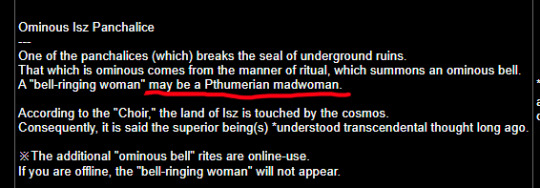
Not only the looks, but also the fact that both Snatchers and Bell-ringers are exclusively found in Dungeons + connected with School of Mensis (whom we did figure HAD Pthumerians involved). Also:

While I was looking at Snatchers again for this ask, I noticed this super cool detail, that their necklace looks like a torch sort of...? And we know Pthumerians dabble in pyromancy + if Keepers of the Old Lords are any indication, fire - and setting your body and soul in fire - was sort of a sacred thing for them! Makes me wonder if necklace design is one of the tokens of that. Heck, their odd skin patterns might be burnt marks? Unusual color, because Pthumerians are still not quite humans!
(My headcanon is fire magic gifted to their kind by Wet Nurse that once was one of the crowlike Great Ones living on the sun but sacrificed like 70% of her body to help proto-humans to survive THEIR beast plague at least somewhat)
What also messes me up sometimes is:


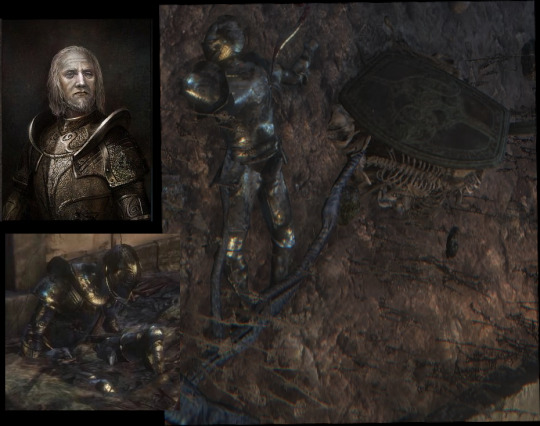
There is clearly some heritage within Cainhurst! Annalise does recognise the meaning of that ring, too.
I personally do not think that pthumerians slowly evolved into humans on their own somehow? For me pthumerians appear to be sort of proto-humans, kinda like nephilim! They even have racial variety of their own - just skin that is bleach white and shades of grey, rather than beige and shades of brown. However, I do think that they are ABLE to mingle genetically with humans! My biggest hook is that Maria who looks as human as possible, can use fire blood magic that appears to be their genetics (at least / especially taking roots from Pthumeru Ihyll).
My lucky guess is that this line, the now known Cainhurst nobles, at least has had a long line of generations of pthumerians procreating with humans - only the strongest and the prettiest ones! - in order to weed out 'unwanted' genes and take the best from both species. Leading to a mixed line - super tall humanoids with very pale skin and permanent dark circles under eyes. Not always pale skin though, it depends on the region... But yeah, Cainhurst vilebloods had a LOT of arrangement I think. The royal people just tend to be like this about bloodlines :pensive:
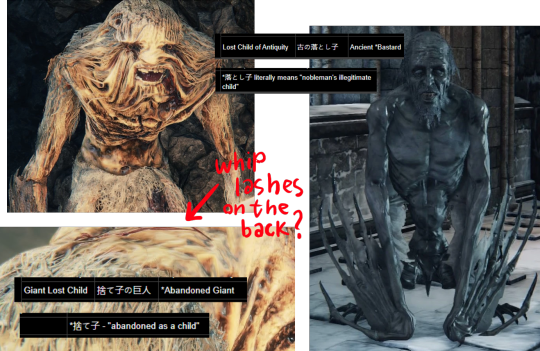
These guys are also what gives me a hunch that pthumerians or humans or both were not really nice to offsprings that showed genes they considered 'unwanted'? Lost Child of Antiquity is a mob that is also found in Pthumeru Ihyll - so, associated with the line that eventually became Cainhurst vilebloods. Giant Lost Child is associated with Loran - they are only found in Nightmare Frontier (and stormy pathwalk to Nightmare of Mensis, which IS layer of Nightmare Frontier)... We did agree as a fandom that Nightmare Frontier must be connected to Loran, right?
So like, Giant Lost Children were disowned once they were born like this - and used in slavery it seems?? This is what whip lashes are? I think this also has connection with how pthumerians have gigantic variants sometimes - like giant Church Servants, or Shark Giants (my beloathed -_-), or the big guys in the dungeons with cannons and literal candles on their backs! This one might be result of painful birth mutation where it is mesh of human and this 'gigantic' pthumerian.
(But, I honestly do not have an idea what could have caused a mutation that makes you look rocky and have bat-like wings (undeveloped). I think Kin were involved though - there are themes of petrification from great blast of Arcane in the game (Eye Pebbles, Rom's "corpse" on altar, statues all over Upper Cathedral covered in dramatic manner as if they were creatures that ended up turning into stone, petrified people in Yahar'gul)... And it is Arcane-boosting blood gems that are grey in color, too. The closest to winged Kin we do have are Gardens of Eyes.)
I side-tracked but yeah, yeah they are pthumerians. Hell, I'd argue that Bloodborne Patches is easily mixed between human and pthumerian, just look at him closer!
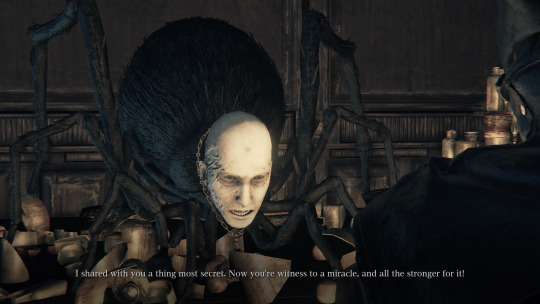
I am yet to figure what did happen historically - how there are friendly pthumerians that do NOT act like zombies (like Chapel Dweller), what about pthumerians that seem to have lost their roots (like Logarius), why ones like Church Servants work for the group that has been actively raiding the dungeons where remains of their civilisation were etc? So many questions??
Though the gist of this I think, most remaining pthumerians have gone crazy from living far too long thanks to their unholy magic and rites, longer than what nature had prepared for them, but naturally humans didn't learn from history and attempted doing the same lol
#bloodborne#pthumerians#bloodborne theory#bloodborne headcanons#fandomry rambles#ask replies#it is very hard to not sidetrack and just say 'yes i do' without extra essay sdhdsfd trust me#(lol no it is literally not so hard i am just being myself)#i am not sure how humans OR pthumerians appeared though!#if doll's dialogue is of any indication moon presence might have had a hand in creating both#which makes doll's lines even more eerie#it is as if flora tries to passively-aggressively hint what attitude she wants from mortals through her#but yes i think they are able to breed together#and cainhurst decided to go freak mode on orchestrating a 'proper' bloodline because thats what nobles like to do#like you know the nobles? people that historically would even have children with relatives to 'preserve the purity of bloodline'#wow that went well....
62 notes
·
View notes
Text
I woke up with an idea that has utterly consumed my mind and I had to get some words out to see if it's going to go anywhere. Another alpha/omega historical au (I know I know) where Erik is the Crown Prince of Genosha and Charles his childhood playmate. What would happen if Erik's father the King decides to make Charles his new Consort???
-----
Azazel is waiting when he comes out from the wash tent, handing Erik his tunic and his scabbard with an easy smile. Nodding his thanks, he pulls the tunic over his head and scrubs his face and hair with the towel, relieved to get some of the dirt off his body after days of hard fighting. Their campaign in the west lands is coming to an end, at least according to General Frost, who has been leading the King’s Army against the rebels for the past six months. Erik had been dispatched by his father to join the fight, but strictly under the General’s command, and with instructions to learn the art of war from the respected and seasoned Genoshan leader.
It hasn’t been easy, as Frost treats him as she would any other soldier, and not as the Crown Prince who technically outranks her. But at eighteen, he’s barely been away from the castle and outside of Hammer Bay, with this deployment being the first real fighting he’s seen since he started training under Logan. He wishes his friend and mentor could see first-hand just how far he’s come, though of course the Captain of the King’s Guard must stay in the Capital to protect the King.
And if he’s being honest, what he really wants is to see Charles again and spend time with him, even if they can no longer run free all over the castle grounds. Though they’ve been close companions since they were young children, Charles’ freedom became severely curtailed when he turned fourteen, after his father’s death and his mother’s subsequent marriage to the traditional Earl Marko. In the two years since, their visits have been chaperoned at all times, as befitting their respective stations as alpha heir to Genosha’s throne and the omega scion of a noble house. And Erik’s complaints to his father largely fall on deaf ears, for by law Charles must obey his stepfather until he’s wed and bonded to his alpha mate.
He does not like how his warm and gregarious friend has become so reserved and distant of late, and vows to speak to his father again, for more time with Charles away from the eyes of Marko’s people. Erik is certain that Charles will confide in him given the chance again, and the close camaraderie they shared as boys will quickly return.
(And perhaps he’ll finally be brave enough to admit he’s in love with his best friend, and – assuming Charles feels the same way – will ask his father to arrange a formal betrothal.)
“You’re smiling,” Azazel teases, as they make their way to Erik’s tent, where a hot meal served in relative privacy is the one luxury he’s permitted. His personal guard has likely already taken his meal, though Erik is more than happy to share his allotment of ale. “Did you get another letter?”
“Unfortunately, no.” Charles has written only once since his arrival at the camp, though Erik has never stopped hoping he would send more. “I was merely thinking I would get to see him soon, since the General seems confident of an imminent victory.”
“The General knows of what she speaks,” Azazel says, side-stepping a deep puddle, the ground still wet from the morning’s heavy rain. “Though it’s still best not to count the chicks before they hatch—”
“Your Royal Highness!”
Erik stops mid-stride, his way suddenly blocked by the incoming approach of a messenger dressed in the King’s livery. The boy is very young and looks utterly exhausted, as though he’d ridden the five-day journey non-stop from Hammer Bay. Falling before Erik on his knees, the boy proffers the letter clutched in his hand; a note from his father bearing the King’s Seal, though the lettering on the envelope is clearly written by another.
Frowning, Erik tears open the envelope and scans the message inside, curiosity morphing quickly to horror at its contents.
Azazel leans close and murmurs, “What’s wrong?”
Hands shaking, Erik can barely form the words to express his shock and utter dismay.
“My father is planning a wedding,” he croaks. “He’s chosen Charles of House Xavier to be his new Royal Consort.”
74 notes
·
View notes
Note
Hi there,
I noticed you've been following me for awhile thanks. I saw some of your posts on the Howards and noticed that you mentioned somewhere that the Duke of Norfolk might have played a part in Cromwell's downfall in 1540 in order to get revenge for Anne Boleyn's execution.
That's a very interesting theory and I like it. Is there much evidence for any affection Norfolk or the other Howards had for Anne? I've always seen Norfolk as an evil villain who treated his family badly but maybe there was more to him than that?
Hello.
Sorry it's taken such a time to respond, but as you'll see it's VERY long, so I wouldn't start reading this on the bus.
Part One
As a child I used to be very annoyed by 20th-century writers treating historical figures like ice-cold robots welded to lifeless 'logic', and incapable of doing anything rash or ridiculous.
Oh why would Richard kill the Princes when it'd make him look bad?!
See? It must've been a plot by Margaret Beaufort all along.
(I know it's improved since then, but that first impression stuck.)
Reading history, I've always assumed family members instinctively cared for one another, unless their words and actions proved otherwise, and yet the above mentality pushed the exact opposite: that it was 'irresponsible' to even suggest any sort of natural bond between relatives unless they actually wrote it down, which is an absurd standard.
To me it's as silly as saying 'we don't know' if they breathed air as no one put it in a diary.
What does it matter how long ago they lived? They're still people.
I've even seen the extremely smug attitude that caring about one's own children is entirely a 'modern' invention, and the Mediæval and Tudor age wouldn't have understood such a concept.
Wouldn't have understood love!
Since then I've been interested in emotional bonds between friends and family, given how much closer they were than now, particularly rebelling against the idea Elizabeth didn't care about Anne.
And the Boleyns / Howards are my favourites, so their clannish level of kinship fascinates me the most.
Let's go through some of them:
Catherine Howard, Countess of Bridgewater
Catherine's first husband was Rhys ap Gruffydd, heir of a powerful Welsh family.
Problem was when his grandfather died Rhys got passed over (I expect because he was seventeen) in favour of Walter Devereux (the 10th Baron Ferrers), and Rhys wasn't 'avin that.
Devereux arrested him for disturbing the peace, which sent Catherine bananas as she'd convinced herself they were all out to get her husband.
In response she stirred up the local gentry and marched on Carmarthen Castle, threatening to burn the door down and bust on in there if Rhys wasn't freed.
Well after that unease and bitter factionalism bubbled up to denonation point, with servants killed on either side and Catherine attacking and destroying Devereux's property, meaning he sent word to England descibing BOTH of them as leaders of a 'rebellion and insurrection'.
Rhys sounds like a knob to me. You could say Henry caused this mess in the first place, but Rhys ought to have known where all this was leading.
His Wiki page lays it on that he was some noble folk hero martyred to the Reformation, but adding 'FitzUrien' to his name, thereby playing on ancient Welsh myths and thus (supposedly) announcing himself as Prince of Wales, was pushing his luck to say the least.
That's a worse blunder than Henry Howard made and no one ever feels sorry for him.
I shouldn't think he had conspired with James V, but going by this quote from the chronicler Elis Gruffudd (a very interesting fella in his own right) he wasn't universally mourned:
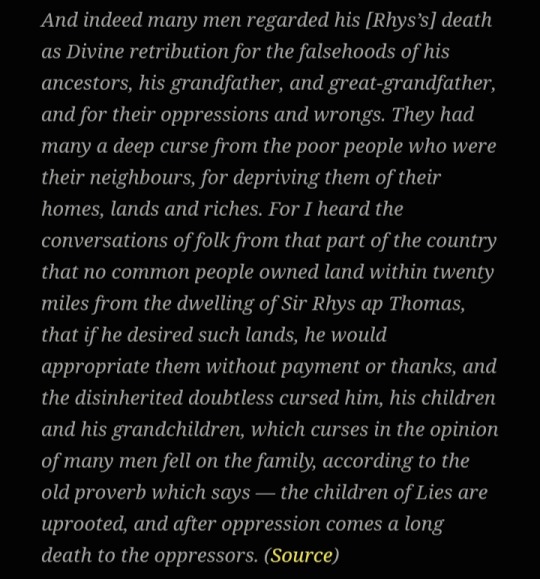
Rhys was beheaded in 1531, but Catherine was in the soup herself after all she'd been up to assisting him.
As Gareth Russell says:
'While we may never know exactly how much his own actions brought about Rhys's death, we can be certain of the devastating effect it had on his widow. She had been intimately involved in her husband's quarrel, and so the possibility that she would be accused of complicity in his alleged treason was tangible.
Left to forge prospects for their three young children — Anne, Thomas and Gruffydd — and fearful for herself, Lady Katherine followed in the footsteps of her elder brother Edmund and flung herself on the mercy of their niece, Anne Boleyn. Once again, the family's dark-eyed golden girl did not disappoint.'
It notable how often you see Anne, and later Elizabeth, willingly pull relatives out of sticky situations, which suggests at least some previous attachment on both sides, as I shouldn't imagine either would be too happy doing it for the more hostile characters.
Compare Katherine's reliance on Anne, a half-niece, to Elizabeth Seymour writing to Cromwell for help, not Jane, her own sister.
'She may even have tried to limit the damage for her aunt and young cousins shortly before Rhys's execution.'
Which was good of Anne considering Rhys had slagged her off, with both of those links having the nerve to imply his death was somehow her doing.
Had he lived, I do wonder if his opposition, compared to Catherine, who, familiarity or not, no doubt wanted to benefit from the connection, would've provoked a certain marital discord.
'Rhys had been attainted at the time of his conviction, meaning that the Crown could seize his goods and property, but his Act of Attainder specifically and unusally made provisions for his widow, who was left with an annual income of about £196.
If Anne could not save Rhys, she worked hard to salvage his family's situation.'
Meaning she got Henry to surrender some of his ill-gotten gains solely to avoid her aunt's destitution, where plenty of other widows and orphans were left to fend for themselves.
Anne also got Catherine a new husband in old-timer Henry Daubeney, but they bloody hated each other and split up soon enough.
According to Eric Ives:
'Over the winter of 1535-6, Katherine Howard, Anne's aunt, was trying to secure a separation from her second husband, Henry, Lord Daubeney. She told Cromwell that the only assistance she was receiving was from the Queen herself, and this despite the strenuous efforts which were being made to destroy her standing with Anne.
The help may have been very practical indeed; Lord Daubeney, who was certainly pleading financial hardship at one stage, reached an amicable agreement with his wife after Anne's father had made available £400.'
Even though this post about Catherine insists neither Anne nor Norfolk gave a toss about her personal woes, from the looks a things Anne was trying to solve this problem too.
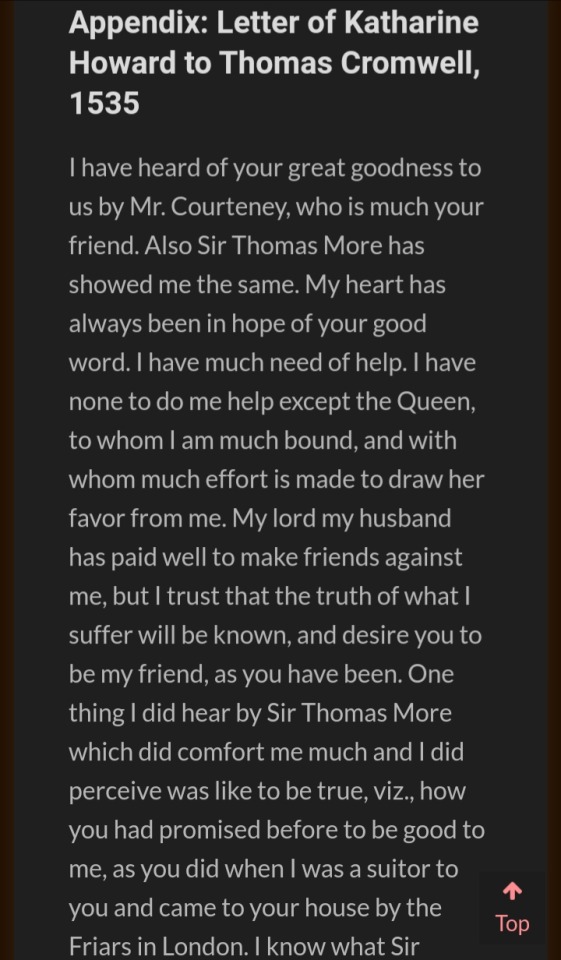
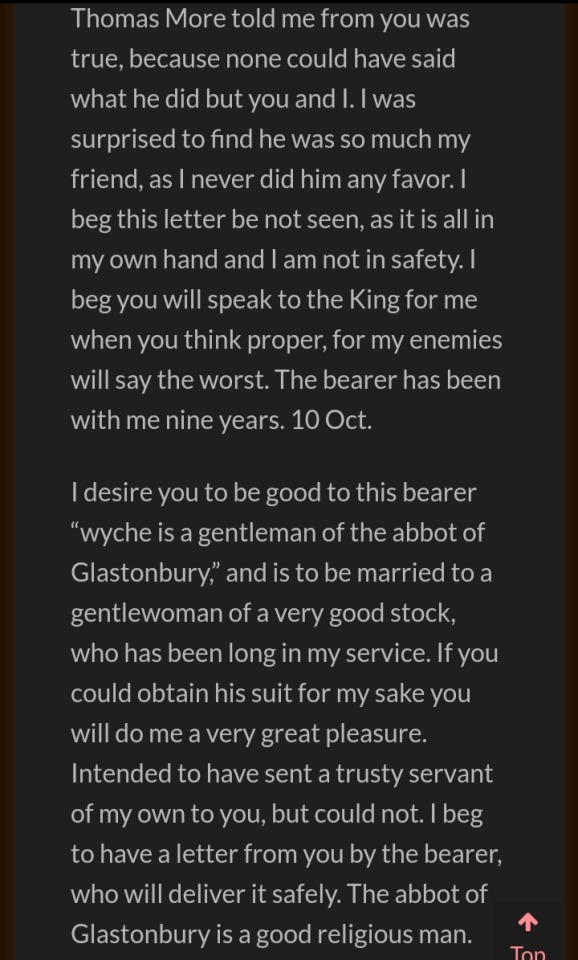
'I have none to do me help except the Queen, to whom I am much bound, and with whom much effort is made to draw her favour from me.
My lord my husband has paid well to make friends against me, but I trust that the truth of what I suffer will be known...'
One wonders how all these paid agitators ended up gathered 'round Anne, nagging or distracting her from Catherine's cause, but evidently she wasn't put off.
Plus, according to that last link, Catherine never learnt her lesson and took part in the Pilgrimage of Grace an' all, raising 3,000 men against Henry!
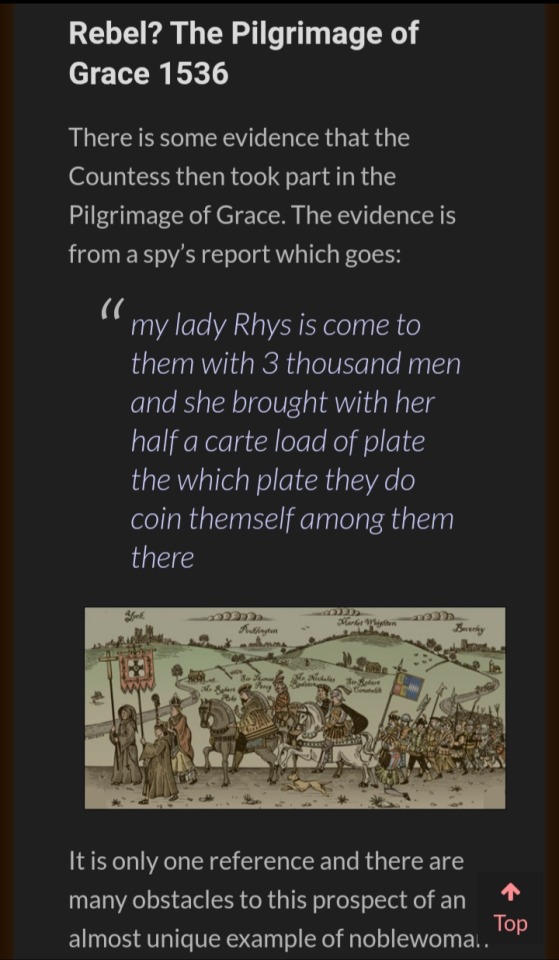
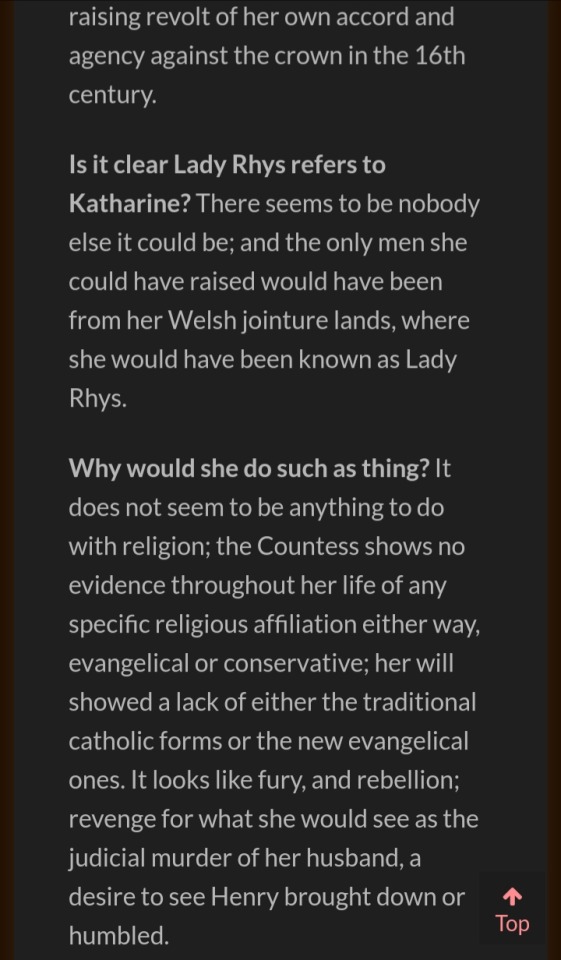
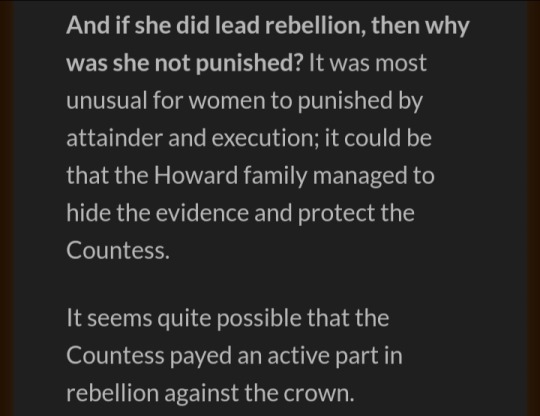
By the sounds of it, this isn't a sudden burst of furious piety at work, rather there's almost an absence of religion in Catherine's life.
The obvious explanation would be yet again wreaking vengeance in Rhys's memory, and that's evident given her long-standing vendetta against his disloyal servants.
But would it be too much to think she was motivated to a certain extent by the death of her niece and nephew, being 'much bound' to the former?
And as she avoided all punishment, the remaining Howards (i.e. Norfolk) had to have covered up for her.
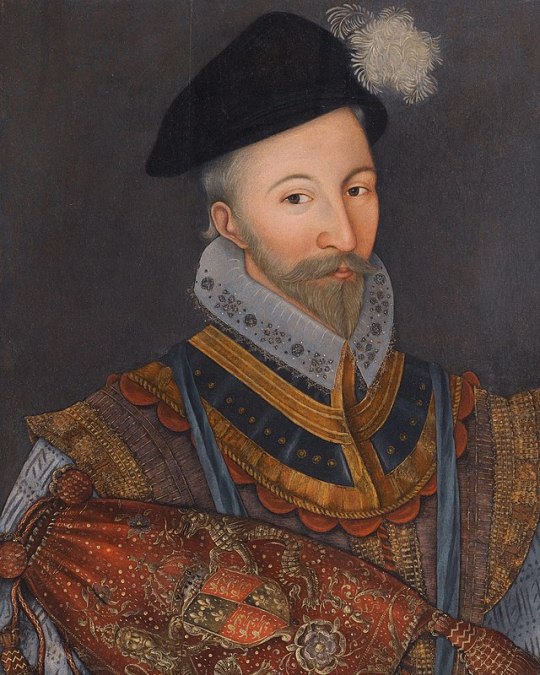
William Howard, 1st Baron Howard of Effingham
In 1529 there was much scrapping over the wardship of the Broughton sisters.
Wolsey ended up with the younger, Katherine, but upon his fall it seems Anne got the girl transferred to the care of Agnes Tilney, who then married her to William, so Anne was responsible for his first marriage.
(Not that it prevented Katherine Broughton from acting, as Ives puts it, as 'ringleader', in a demo for Mary six years later, and getting herself locked up in the Tower as a result, but there you go.)
Given the amount of important roles he enjoyed during Anne's queenship, all whilst barely out of his teens, she must have liked him:
• 1531: Ambassador to Scotland.
• 1532: Travelled to Calais with Anne to meet Francis.
• 1533: Served as Earl Marshal during Anne's coronation, in place of Norfolk.
• 1533: Held the canopy at Elizabeth's christening.
• 1535: Visited Scotland to award the Order of the Garter to James.
• 1536: Went again to Scotland to arrange a meeting between Henry and James.
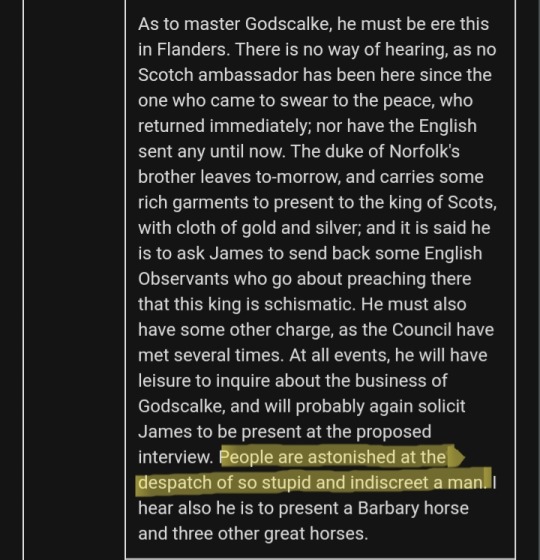
Besides, Chapuys said of him:
'People are astonished at the despatch of so stupid and indiscreet a man.'
So he had to be Anne's friend.
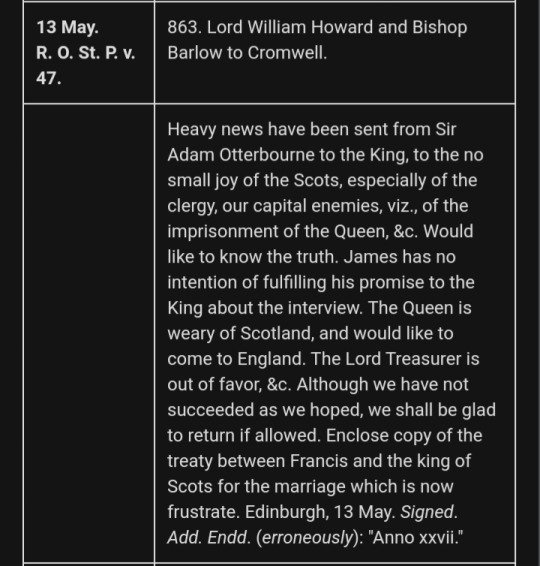
Once he hears of her arrest, William curses it as 'heavy news', demanding to know the truth from Cromwell and resenting all the Scottish clergy as 'capital enemies' for rejoicing in her fall.
Mainly I'm mentioning him to discuss his own character, and where his evident loyalty to other family might give us a further suggestion of his relationship to Anne, and how he kept to that sense of honour even when it led him into dangerous territory.
Consider, for example, how he named his son Charles after his brother, and called his daughter Douglas in honour Margaret Douglas, Charles's wife, thus commemorating their doomed romance.
You'd also be surprised how often he turns up in Young and Damned and Fair, as he appears to have been Katherine's closest uncle, for all that she's usually connected to Norfolk.
Indeed, so deep was he in it Agnes had to be advised not to warn him off coming home, meaning he arrived from France and found himself immediately clapped in the Tower, whereupon he craftily claimed all his best plate was washed overboard so Henry couldn't get at it, which worked.
Later, his connection with Henry Howard ensured he missed out on being Admiral, and when he did get it, Mary took it off him to punish his partiality to Elizabeth.
There's a section here detailing his bond with Elizabeth, where he's credited with saving her life, if you ignore the obvious errors:
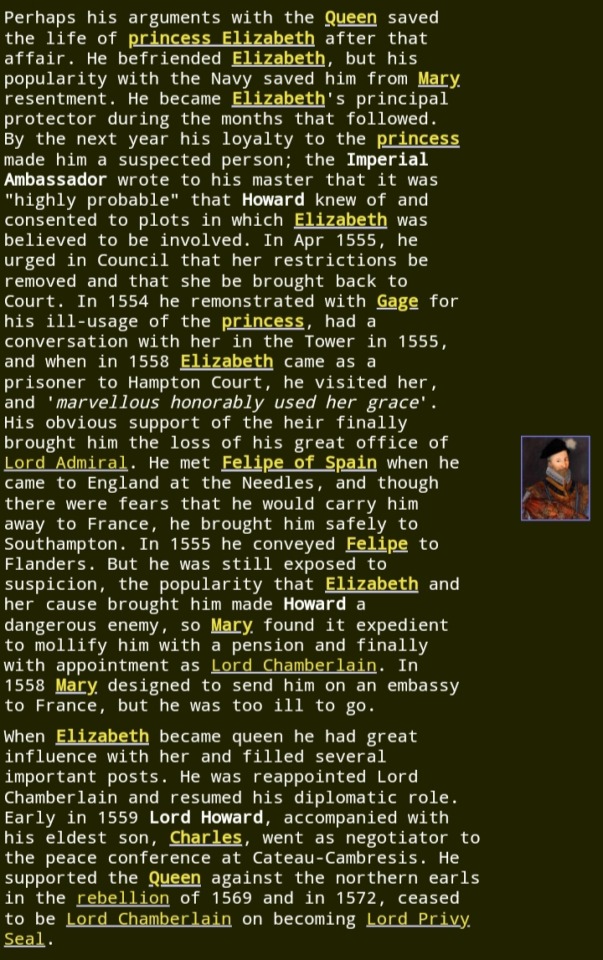
I especially like the idea everyone feared William would kidnap Philip!
However, there's a very odd paragraph in his son's Wiki page:
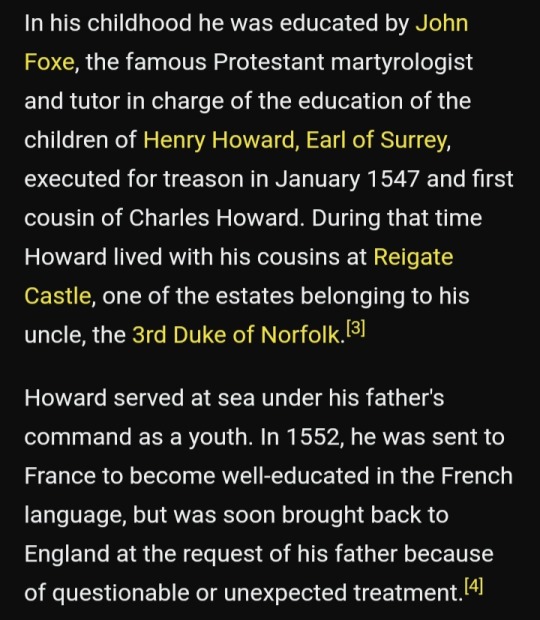
'In 1552, he was sent to France to become well-educated in the French language, but was soon brought back to England at the request of his father because of questionable or unexpected treatment.'
Am I mad or does this imply Charles Howard endured sexual abuse in his teens?
Were it only poor lodgings or sub-standard teaching, he could've moved elsewhere.
Were it excessive beating, you'd expect it to be made plain, not using all this cagey, obfuscating language.
But the thought did lead me to ponder their father-son bond, where Charles, whatever shame he suffered, knew he was loved enough that writing to his father would make it stop.
And William, reading it, rescued him immediately, proving the boy right.
This is a mere fancy of mine, but when it's just after Elizabeth's ordeal, whom he obviously cared so much about, and knowing she could easily have died like Katherine, which happened in part because he never stopped Dereham, one wonders if his moral failing then pushed him to protect Charles and Elizabeth later.
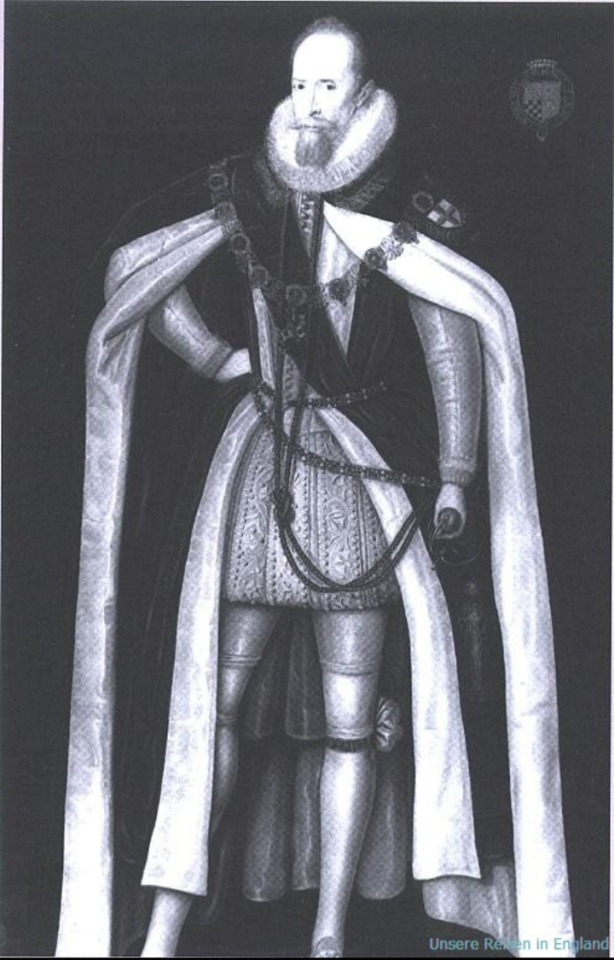
Thomas Howard, 1st Viscount Howard of Bindon
I'm hard-pressed to unearth much information on this lad, but everyone leaves him out so I won't.
There's gotta be some reason Elizabeth ennobled him, and so early on (in 1559) before he'd had the chance to serve her.
It can't just be she looked round the court, noticed he was the last of Norfolk's children, and awarded him for that.
I wish we knew more about Elizabeth's childhood, as in who she met and associated with at court, because you can be certain she met the Howards then.
I also want to add a little about his eldest son, the 2nd Viscount, who was...odd, to say the least:
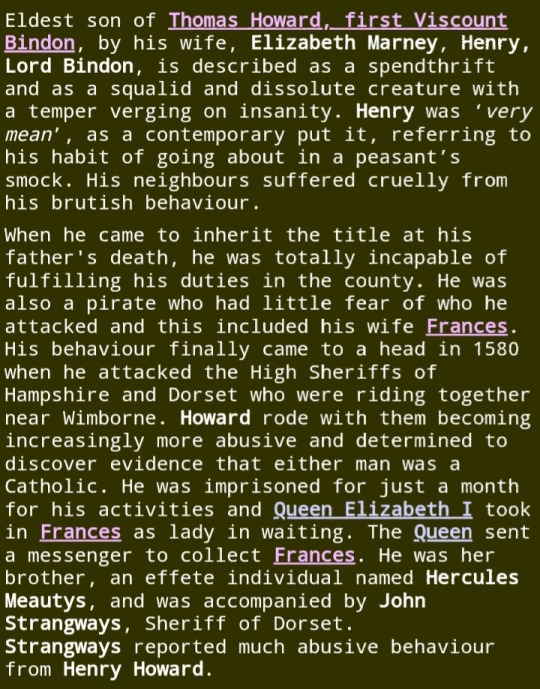
• Being a pirate;
• Dressing as a tramp;
• Beating everyone including his wife.
This gave me the the idea that perhaps his and Norfolk's reputation had somehow been rolled up together over the centuries, where this Henry Howard, although unknown today, was probably infamous in his time, and maybe his behaviour in a sense lended credibility to the accusations of spousal abuse against Norfolk, where people felt Henry 'got it from somewhere'.
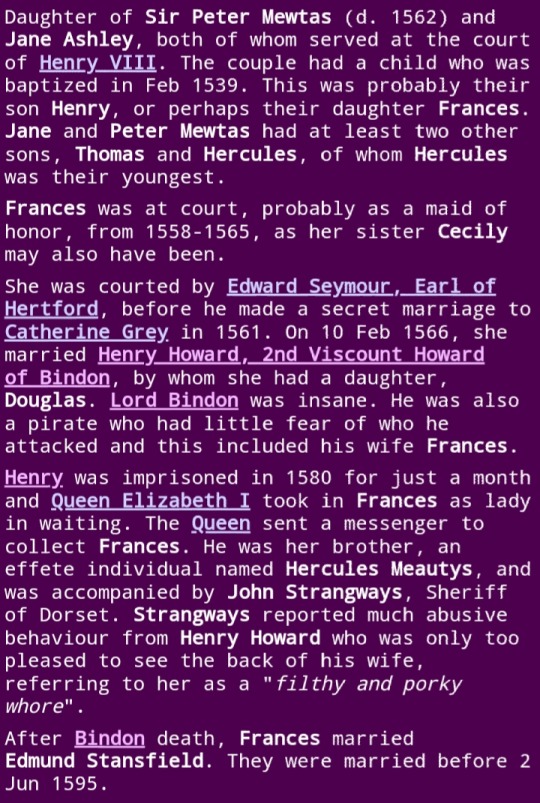
When Elizabeth learnt what he was up to, she sent Hercules Meautys (what a name) to rescue his sister, and took Frances in, with her husband dubbing her 'a filthy and porky whore', which was rich coming from him.
And his other son, the 3rd Viscount, killed his own father-in-law and had a long-running feud with Walter Raleigh.
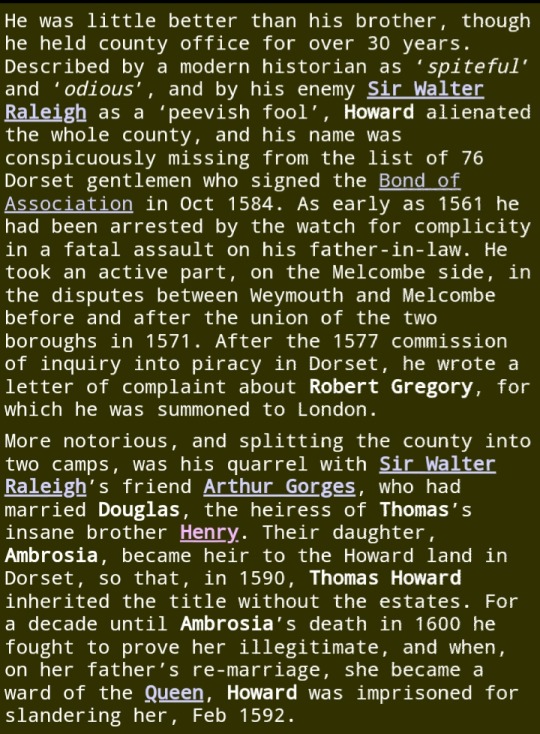
He also spent years trying to have his brother's granddaughter Ambrosia declared a bastard to grab all her land, so Elizabeth locked him up!
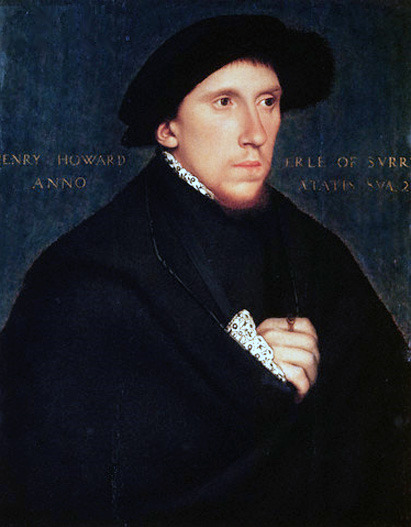
Henry Howard, Earl of Surrey
Anne found Surrey a wife and took him with her to France, where he and FitzRoy remained as honoured guests until the next autumn.
He was then obliged to serve as Earl Marshal as Anne and George were sentenced to death.
Four years later, according to Gareth Russell, Surrey not only watched Cromwell's execution, but gloated about it afterwards:
'Henry Howard, Earl of Surrey, stood at the forefront of the crowd and watched the scene without pity. He was missing his cousin's wedding to be here to see his family's bête noire finished off.
Later that day, he could not conceal his good mood. It felt to him like a settling of scores:
"Now is the false churl dead, so ambitious of others' blood."'
What does this mean?
Who's blood has Cromwell lusted after?
Who did he kill four years ago?
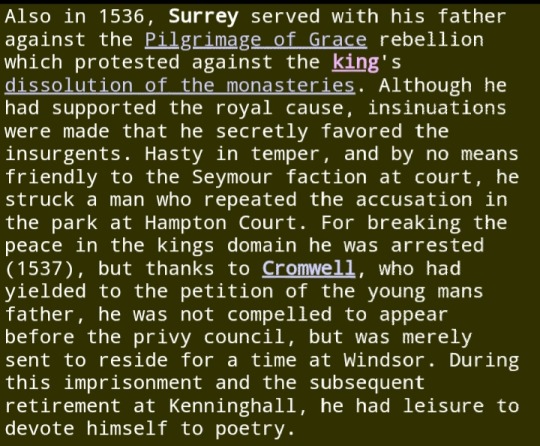
Surrey can't be referring to himself when Cromwell had actually protected him from punishment not long before, which in itself suggests a few interesting things:
• Cromwell was not yet aware of just how much the Howards despised him, as in, up til then his relationship with them was at least civil, cordial even, so the old line about Norfolk begrudging the 'new men' just because they're new men doesn't quite wash.
• This would've the perfect opportunity to bring down a mighty rival, but instead Cromwell felt bizarrely generous and intervened on Surrey's behalf, meaning he saw no harm in preserving the family, and instead thought it useful to get them on side.
• Why does he feel the need to favour the family?
Has he done something to antagonise them?
• The Howards are collectively putting on an Oscar-worthy acting routine of feigned friendliness, or at least indifference to said actions, so Cromwell, whilst he might suspect he's given slight offence, assumes it'll soon be forgotten if he pats them on the head here and there.
• Except whatever Cromwell did, saving Surrey wasn't enough to warrant forgiveness.
And let's examine this quote in detail:
Surrey is at 'the forefront' of spectators, keen to behold Cromwell dying in all its gory brutality, besides opting to watch such a horrendous deed over attending Katherine's wedding.
Instead of a happy celebration of his family's success, something he could've easily enjoyed in the knowledge of Cromwell being dealt with out of the way, he insisted on serving as a witness, as if it wouldn't be over until he'd seen it done, almost to be sure that it had.
For this would 'settle the score', shedding his blood in payback for... what exactly?
Thetford Priory?
Is that all?
Or for the blood Cromwell himself so coveted?
And even the sight of such suffering left Surrey unmoved, ridiculing the dead man not only as a 'churl', but a 'false' one.
False to whom?
'False' as in affecting loyalty to his Queen whilst working to bring her down?
Because is that extreme level of hatred really just supposed to be nothing deeper than empty class prejudice?
Usually, Cromwell's fractious history with the Howards is portrayed as Norfolk's one-man defamation campaign of all-encompassing lordly outrage verging on eye-popping insanity, except Surrey clearly loathed him too.
Perhaps from that we can conclude that Cromwell had become unpopular with the whole family, hence the 'bete noir' reference above.
When Surrey's resentment is remembered, it's conveniently boxed up and filed away as the same-old 'snobbery' of his father, which a very neat, uncomplicated excuse that prevents us looking into it properly.
I daresay Surrey was proud and class-conscious, but wouldn't everyone be like that, to a greater or lesser extent?
Why then is this 'haughtiness' only ever attributed to characters we're supposed to dislike, namely Anne, Norfolk, and occasionally George and Surrey, with the 'good' people somehow immune to such 'base' emotions?
Indeed, I'm starting to wonder how much real evidence there is for this common supposition of arrogance.
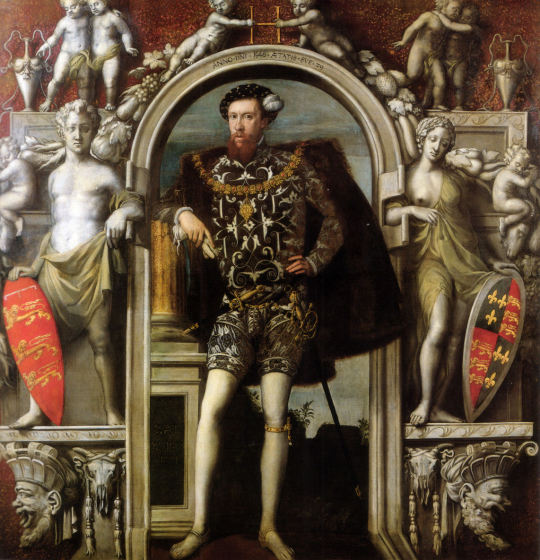
As if Surrey's known at all, it's for the manner of his death, namely he 'got himself killed' by 'stupidly' quartering the royal arms with his own, which, whilst a gross oversimplification, nevertheless defines him, where history views his character through this lens and reads his entire life backwards, as if there's no explanation for his behaviour other than he was just born to be a cocksure moron.
It plays upon modern bigotry against aristocrats, where they're all stuck-up, slow-witted inbreds fixated with the pecking order and archiac symbolism, keeping the honest worker down to prove they're better than everyone else, which is a laugh because they're all REALLY shallow, superfluous chuckleheads and deserve what they get.
Since the idea Surrey died for something so 'silly' as what badge went where slots so well into the stereotype, then it's cheapened his reputation overall.
Rather than being highly esteemed as a pioneer of English literature and the forerunner of Shakespeare, he's treated as nothing but a hot-headed toff tripped up by his own idiotic pretensions, with an end offered as a 'fitting' denouement, almost a lesson in morality; about where not 'knowing your place' or 'getting ideas above your station' leads... after vilifying Surrey and Norfolk for apparently demanding people know their place and not get ideas above their station.
Something hypocritical there.
There's also a reflexive judgementalism within this fandom and the lower end of publishing (i.e. novels and pop. history) where it's assumed if Anne or any of her family are executed, then even if they're technically innocent, they must've deserved it really, else 'the universe' wouldn't let it happen.
Therefore, known evidence is read with the most bad-faith interpretation, with any declared slip leapt upon and blown out of proportion, solely to prove their own bias correct.
You're right to think that, you are.
Hating them makes you A Good Person.
Again, this ONLY applies to Anne and her supporters, not her enemies.
No, no. They were martyrs to the Cause.
But I wouldn't say Surrey's usage of royal arms spoke to any pathological sense of superiority, certainly not to the extent it should define his memory.
Heraldry and ancestry is the lifeblood of nobility: everyone he knew fought for whatever their birth and court careers entitled them, so why shouldn't he?
Look at his sister protesting again and again and again for her rights as FitzRoy's widow: does this make her a 'snob' because she never gave up fighting?
In fact, dubbing Cromwell a 'churl' doesn't mean too much either.
The average person objects to someone because they're a thief, cheat, liar, etc. but calling them as much is a toothless insult, as they'd require a sense of honour to feel the sting.
And if they had that, they would've have committed the offence it in the first place.
So, you pick on something they probably are sensitive about, such as status or physical appearance, to get your own back.
Calling Henry VIII, for example, a fat bastard, doesn't mean you oppose him for having a weight problem, or that you dislike fat men generally.
It's that you're hitting 'below the belt' to inflict the worst punishment you can.
Oh yeah, it's petty, but the aggrieved often are.
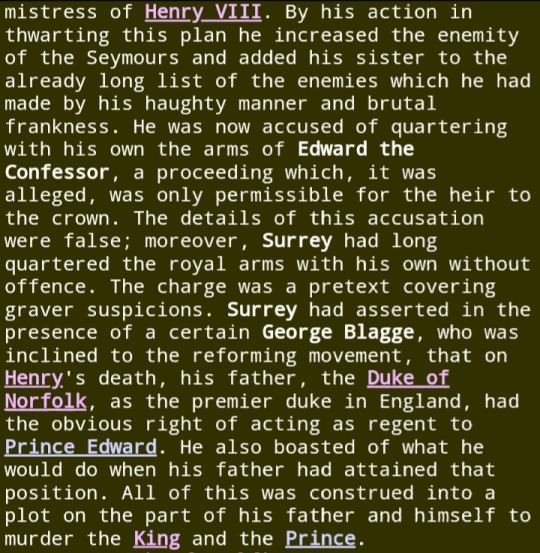
Surrey's real crime, if we deem it one, was apparently rash language of what vengeance he'd wreak on his foes once the King was gone, meaning the Seymours.
So is it mere coincidence that the main targets of this infamous 'snobbery' are those who caused or benefited from Anne's fall?
Are we to believe his only complaint, right down to twice vetoing Mary Howard's marriage, is nothing better than looking down his nose at humble Seymour origins, for they've done nothing whatsoever to draw his ire?
For all the time I've been reading history, the way the court of 1536 splits between the Boleyns and those pushing Jane Seymour, and then, once the Boleyns are wiped out, it greatest rivalry becomes Howard versus Seymour, one lasting for the remainder of Henry's reign, has always struck me as both telling and appropriate.
The idea the Howards took over hating the Seymours because of their slain family is to me to most obvious explanation; the driving force pushing the enmity beyond a decade, and blaming it all on snooty la-di-da attitudes baffles me.
It's so pat and offhand, as if it was thrown into historical research centuries ago and never questioned, passed down to us as unassailable received wisdom, rendered true from repetition, as no one likes Surrey or Norfolk enough to bother reassessing their motivations.
But could such prolonged open hostility run on no greater impulse than keeping the gentry in check?
Is THAT all?
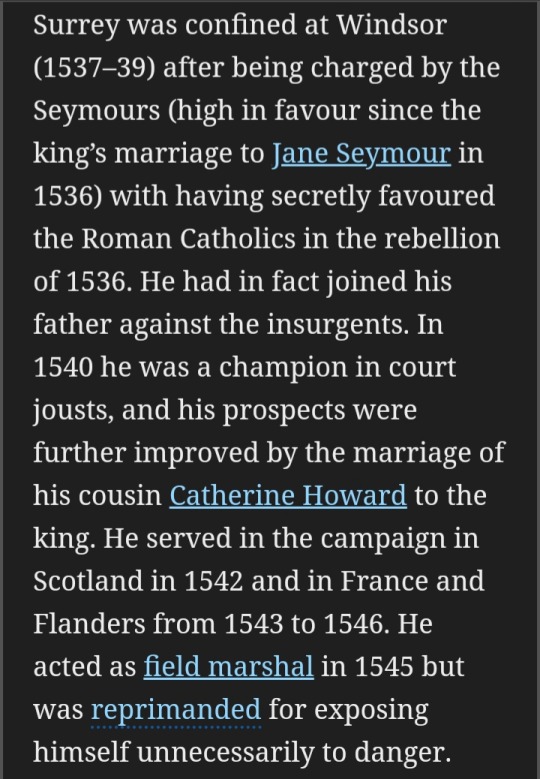
And do note how leading this narrative is, where, if we accept the Howards despised the Seymours as upstarts, then the fault for all bad blood is immediately shoved onto them and them alone, when those poor Seymour lads, rosy-cheeked and pure of heart, are just doing their best in life, working hard and loving everyone.
But oh! Those nasty Howards bullies are So Mean!
Not once is it reversed, proposing that the Seymours envied the Howards' breeding and birth, vowing to bring them down out of spite.
Instead they're absolved of all guilt in the conflict and justified in everything they do as a self-defence measure, even when they brought about Surrey's death and tried it on ten years previously.
So why on earth should he like them?
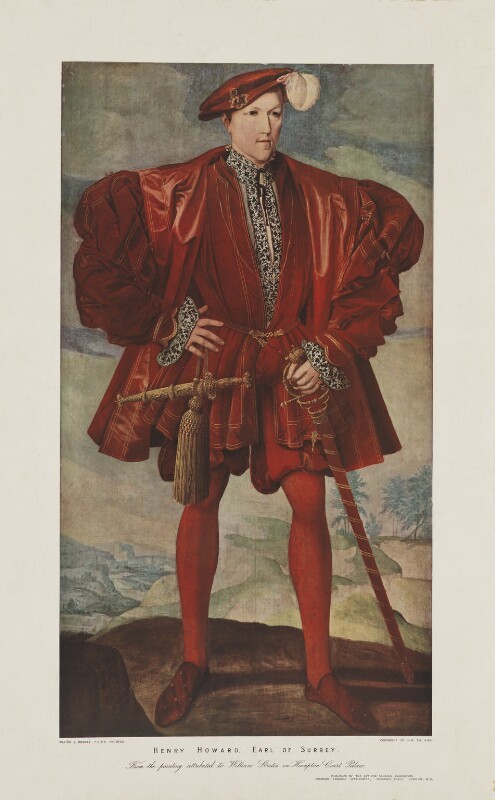
How I wish this painting still existed.
Starkey describes Henry Howard thus:
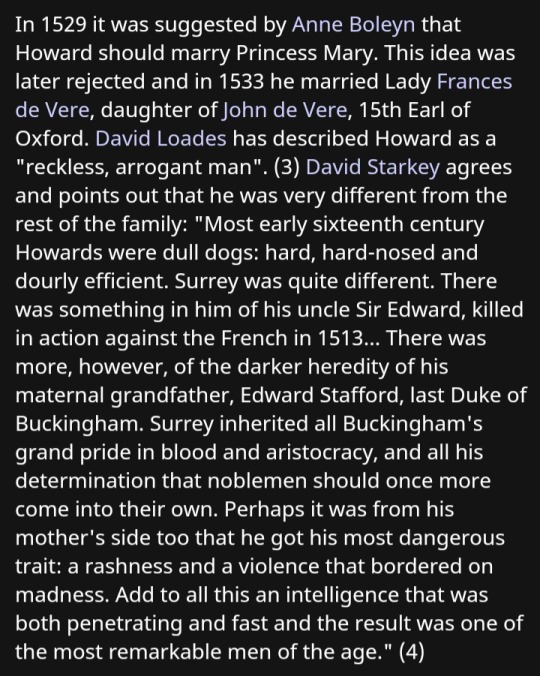
'Surrey inherited all Buckingham's grand pride in blood and aristocracy, and all his determination that noblemen should once more come into their own.
Perhaps it was from his mother's side too that he got his most dangerous trait: a rashness and a violence that bordered on madness.
Add to all this an intelligence that was both penetrating and fast and the result was one of the most remarkable men of the age.'
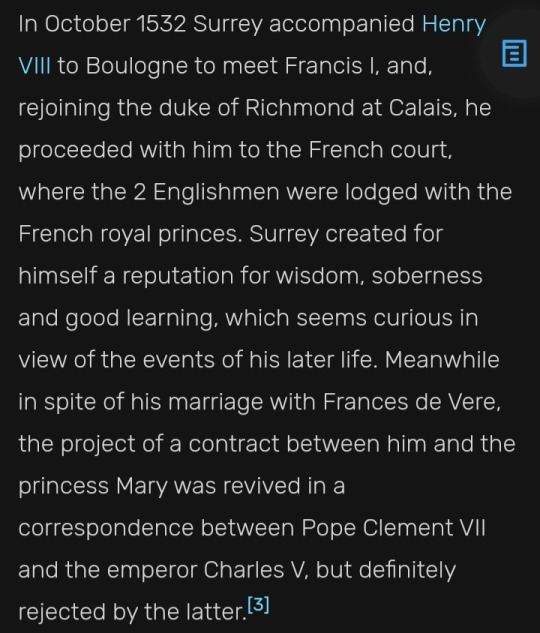
And yet I don't know of any aggressive outbursts prior to 1536, being then known for 'soberness and good learning'.
We tend to class poets of later eras as on the sensitive side, so far from being 'always like that', it may well be that the deaths of George, Anne, FitzRoy and putting down the Pilgrimage of Grace knocked him off the rails, a process then driven beyond all remedy by watching Katherine die and the suicidal shame he endured over his military failures.
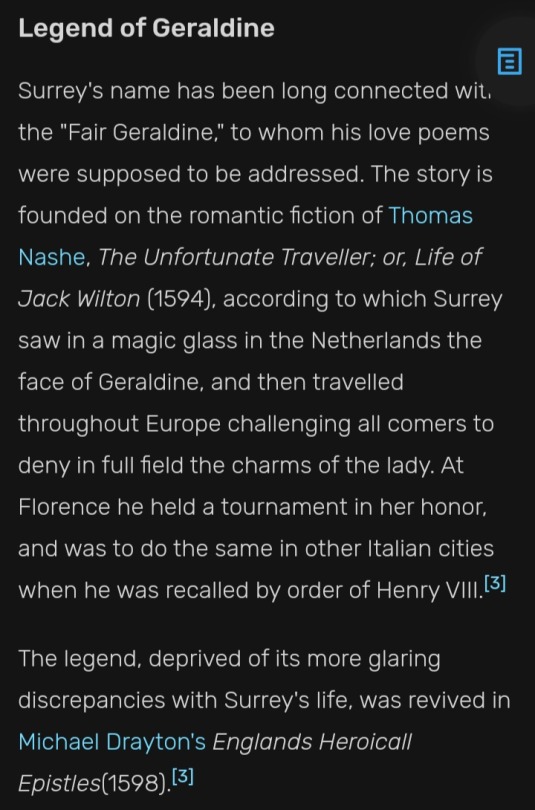
Although I do like the sound of him as the hero of High Fantasy.
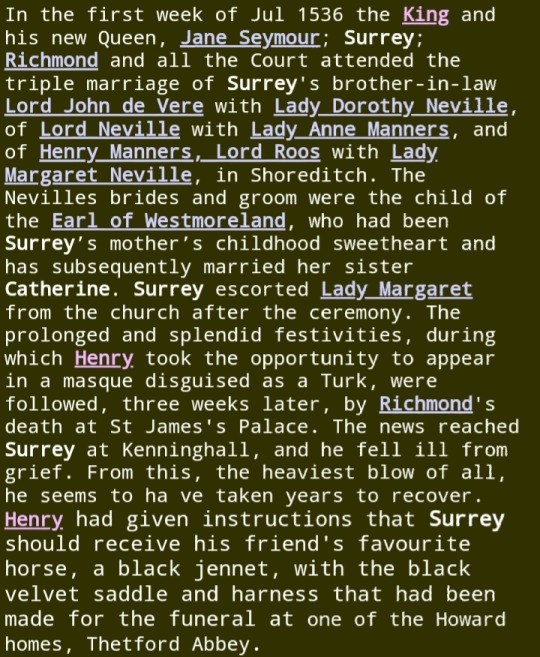
Whilst I'm here, let's look at this very awkward scenario of Surrey attending the triple Neville wedding, being the children of his mother's intended and her sister.
Considering how desperate so many are to clear Henry VIII of Anne's death, protesting how he Genuinely Believed and that makes it alright then, he's cheerful enough fannying about as a Turk less than two months later.
Finally, writing this I read several of Surrey's poems, and must include this truly endearing piece commemorating his wife's love for him:
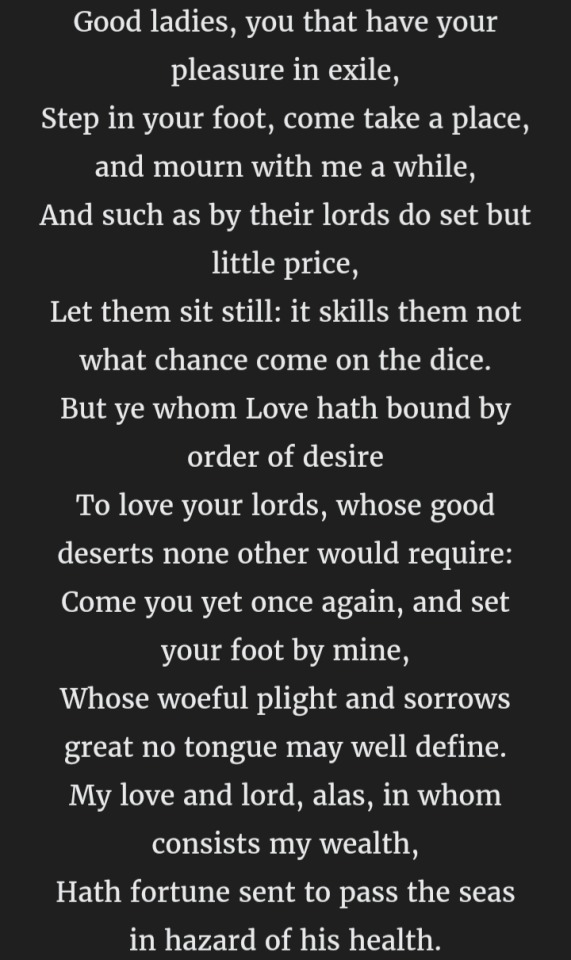
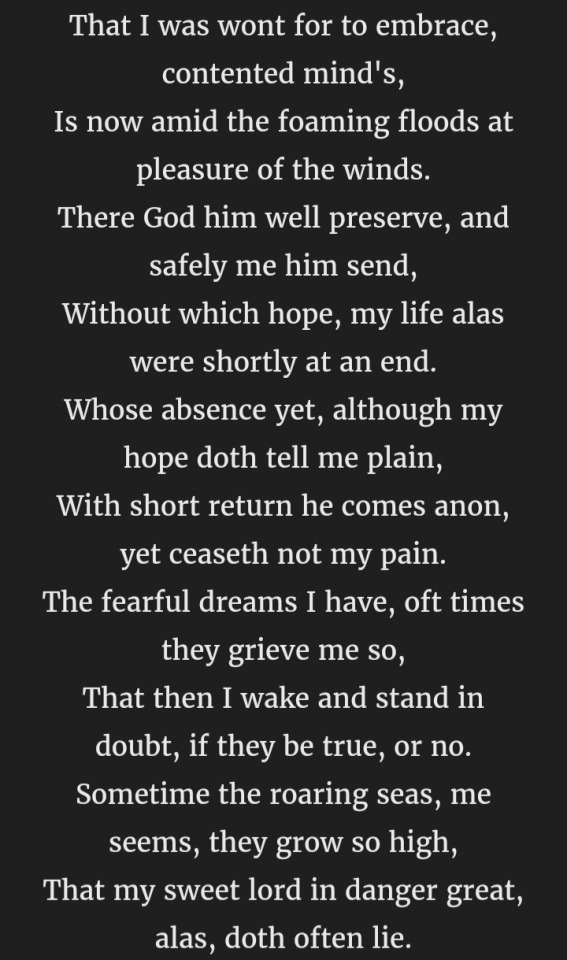
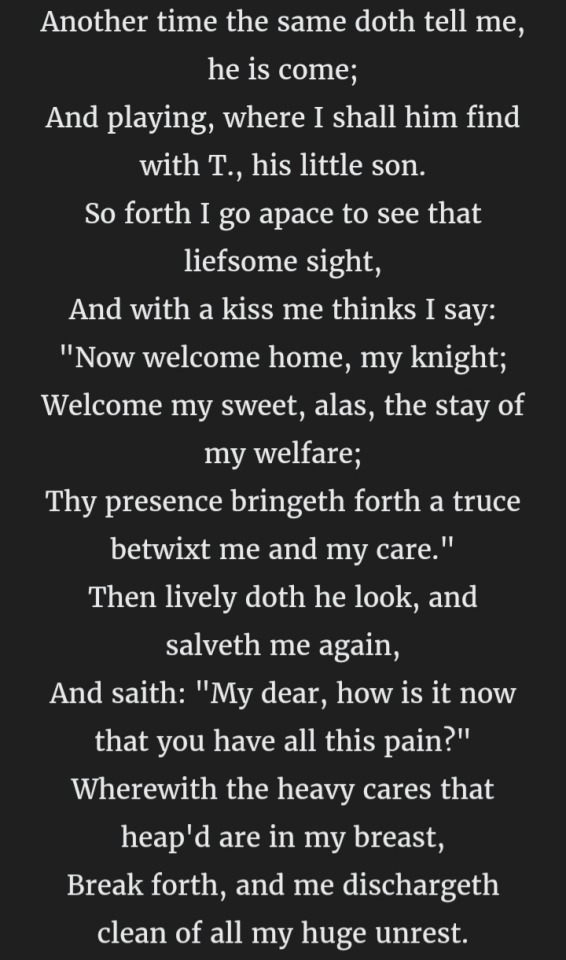
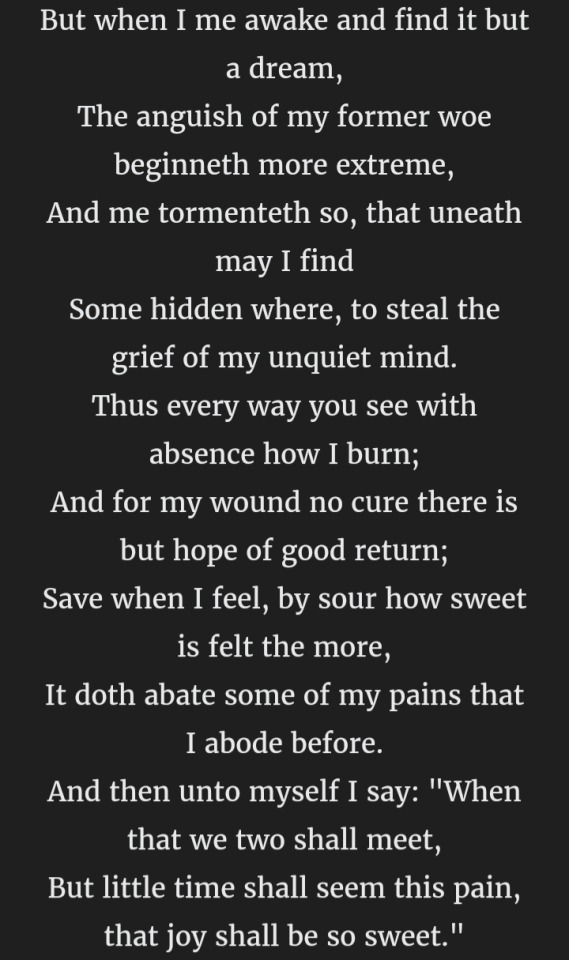
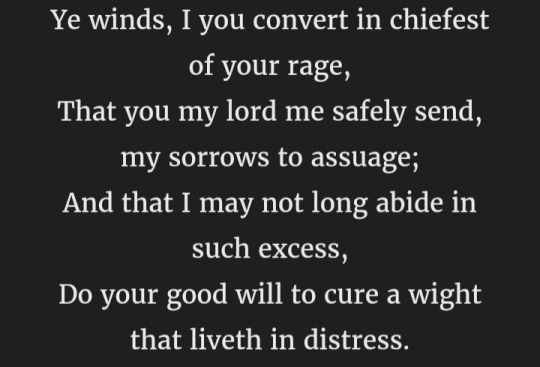
Such a poet, and still no one credits him with any tender emotions.
Anyway, don't mind me but I've hit the picture limit.
I'm not sure when Part Two will be done, but I'll let you know, come the time.
#Henry Howard#Catherine Howard Countess of Bridgewater#William Howard#Thomas Howard 1st Viscount Howard of Bindon#Anne Boleyn#Elizabeth I#Henry Howard 2nd Viscount Howard of Bindon#Thomas Howard 3rd Viscount Howard of Bindon#Frances Meautys#Rhys ap Gruffyd#Thomas Cromwell#Young and Damned and Fair#Gareth Russell#The Life and Death of Anne Boleyn#Eric Ives#David Starkey#Quotes
5 notes
·
View notes
Note
I always notice you like answering possible marriages for OTMA+A. May I ask which one of them is your favorite and highly possible theory that might have happen if there were no revolution.
I think Alexei and one of Elena Vladimirovna's daughters just makes SO much sense. He knew them better than he knew Ileana; they were close in age; they spent enough time in Russia that they'd be more comfortable there than most foreign princesses. And the Russian people would probably like it, too, because of all the Russian connections. The Tsesarevna being the daughter of a Grand Duchess herself instantly makes her seem more 'Russian' and less foreign, and even as a Greek, she is already Orthodox and they'd like that, too. I don't really care which one, but if I have to pick Elizabeth is probably my first choice because of that cute story when they were toddlers about Alexei trying to tell her that he loved her; then Olga, because he was more friendly with the two older girls; and Marina as third choice.
Second is Maria marrying someone "unimportant" in Russia. Either a minor relative like one of the Konstantinovichi princes or Roman Petrovich, or--perhaps more romantically--a noble or officer from one of the socially elite Petersburg regiments. As I said before, there's a world of difference between someone with a background similar to OA's husband Kulikovsky (who was an officer from a fashionable regiment and from a well off if not technically titled family with two estates) and like, some random soldier or baker or doctor. There are levels of 'commoner' is what I'm saying and I think, given how Nicholas allowed OA and Kulikovsky, Irina and Felix, Tatiana Konstantinovna and her Georgian prince, etc, it's not out of the realm of possibility he would have bent the rules a little for at least one of OTMA, too, and I think M is the most likely. She's the most down to earth and humble, and as one of the younger daughters, I think there would be less pressure on her, especially if Olga and or Tatiana made 'good' matches. But if Nicholas doesn't bend, then Roman Petrovich or one of the Konstantinovich boys. I just have a hard time seeing Maria making some grand match with a foreign prince. She wants her Russian soldier--whether he's a minor prince, noble, or officer.
One of the older two marrying David (Edward VIII) would be super interesting because it would have changed the trajectory of the British royal family. There's some speculation that Edward VIII couldn't have children, so Elizabeth II might have eventually ended up on the throne anyway, but there'd be no abdication crisis (presumably) so she wouldn't have taken the throne until after her uncle died rather than after her father. She'd also have a Russian aunt as a pretty big influence in her life. And if David DID have children with one of the Big Pair, then she would have just stayed Princess Elizabeth of York. . . but I don't know that any of that is super likely. Good for a historical fiction, but I'm skeptical it would have actually happened in real life.
12 notes
·
View notes
Note
(I'm very sorry if this topic has been brought up before)(also sorry for the typos and grammatical errors, my english is pretty bad)
Why is Mahoutokoro in HPHM villainized? Why is the book on the history of Mahoutokoro in the restricted section?! Did Mahoutokoro and Hogwarts have some beef and we don't know about it?(huh this is actually interesting, but JC would never do this)
Anyways, I think that it's very dumb that Mahoutokoro expels and arrests students who use any kind of dark magic.
"Oh what's that? You're an 11 year old who casted a harmless jinx to prank your classmates? YOU SHALL ROT IN THE PRISON OF AZKABAN FOR THE REST OF YOUR LIFE!!"
Also if dark magic is in fact,banned, then the headmaster is a huge hypocrite since one of his favourite spells is an ancient and horrible curse that can kill thousands of people just like that! (Come to think of it, it's hilarious, hogwarts rewards students for tempering with ancient structures that free ancient curses in the school's halls and put everyone in mortal danger meanwhile mahoutokoro expels you for casting a curse)
It would make more sense if the student in question used ancient dark magic. WHAT IF ancient japanese magic is amongst the most mysteryous and sacred kind of magic, up there with african and indian magic! Ancient dark magic requires the soul of a human being or other superior magical entity (like a Qilin) in order to reach it's highest potential. It is the only kind of magic that can summon dark spirits from the Other Realm.
So, wizards with white robes were in fact murderers, actually worse than that since they used the soul of the victim for a dark purpose. The white robe was a warning to get away from the mage since they were capable to do horrible things for power.
Oh what's that? "capable of doing horrible things for power"? They sound like great puppets. They sound like the kind of people R would recruit.
So to answer Mrs. Bones's question in Kazuhiro's trial. Shiratori was expelled because he tried to summon an ancient evil spirit because R requested it. Who was murdered in his attempt to do that? You can decide that!
I have some more headcanons about Shiratori and R. If you wanna hear, let me know!
You know, I don't believe this subject has ever been brought up in my inbox, so this should be fun! (And please, no need to apologize aha, goodness knows I repeat myself a lot anyway.)
I'm not sure if Mahoutokoro is supposed to be vilified in HPHM. I can see how you got there, but I have to wonder if the book being restricted is really because Mahoutokoro is a sore or taboo subject. I think it's far more likely that there's information in that book that is considered worthy of being restricted, probably certain historical events, or references to particular types of magic. I'm not sure what, exactly. But I bet something happened in the school's history, not even necessarily of their own fault, that the staff have deemed the book shouldn't be available for anyone to just pick up and read. Like, even if Mahoutokoro is a subject that the teachers would prefer students not know about or ask about, I doubt it's because of any personal beef with the school itself. I mean, Hogwarts has a friendly relationship with Durmstrang for goodness' sakes. A school that teaches the Dark Arts, does not admit muggle-borns, and produced students like Gellert Grindelwald. If they'll invite a school like that to participate in the Triwizard Tournament, I doubt they're on bad terms with Mahoutokoro.
I'm equally unsure if Mahoutokoro is that strict when it comes to the Dark Arts. I don't necessarily mind that they have a zero tolerance policy for them - like, even if The Dark Arts can be used for noble reasons, that's not really what they're designed for, and if I was teaching children magic, I'd want to discourage them from that path as well...but the harshness of the punishments would still need to be relative to the harshness of the offense. In this case, it would depend a lot on their definition of what constitutes "dark magic. I think there's a difference between dueling magic and dark magic. Example, the stunning spell? I don't think that's Dark. I would hope Mahoutokoro doesn't interpret it as Dark either. I mean, do they have a Defense Against The Dark Arts class available, or some equivalent? Because you can't really teach that class without teaching combat magic.
Either way, I would assume and hope it's not as ludicrous as the example you provided. That they don't just throw eleven year olds out of their school for a bit of harmless sparring. I mean, even Hogwarts bans frivolous use of magic in the corridors, but nobody actually respects that rule, so it may just be that the system is theoretically strict as a deterrent, but in practice, the staff would only expel someone who deserved it. Actually, we know that a student who experiments with the Dark Arts doesn't just get expelled, they "turn white." So it may be down to an enchantment on their robes that activates automatically if they detect dark magic. Or maybe the spell is done manually after wrongdoing is discovered. We don't really know. I would question why Shiratori wears the robes everywhere if he can just take them off (and the question still remains how how this is in any way a punishment if you don't have to wear them constantly) but he may also be proud of what he's done.
It's interesting that you mention Protego Diabolica, because by all accounts, that spell itself is quite contradictory. It's a defensive spell, it acts as a kind of shield...only it's born of dark magic. A Dark spell...that has the primary function to be protective. That just seems kind of backwards, doesn't it? I can only imagine the complex level of spell-design that went into creating this one. I'd have to assume it's both a light spell and a dark spell at once - or else it's just living proof that a light hearted wizard can use The Dark Arts without corrupting themself, and a dark hearted wizard can do the opposite. I really wanna know more about Protego Diabolica, it's actually so damn fascinating if you stop to think about it.
Ancient Magic though, that's got me curious. Especially since we're apparently going to learn quite a bit about it during Hogwarts Legacy. Anytime a story applies worldbuilding and hints at a much more complex past, I just gobble it up. (The Owl House is like a feast for that kind of thing, if anyone reading this wants to check it out.) Actually, that makes a lot of sense given what we know about R and their interests! I wouldn't be surprised if the "Ancient Magic" is exactly what they're after! Maybe that's the kind of magic that fuels the Cursed Vaults? Japan, Africa, India, and I would also make a case for Brazil (and Castelobruxo) as being a hotspot for this kind of power. I also tend to be of the mind that the most powerful magic, light or dark, draws power from the soul.
Nice reference to the Qilin, by the way. I love those sweet little babies and I just want to hug them for the rest of time.
I agree with you and I think there's a difference between the mundane of The Dark Arts, and the more obscure stuff. Even the Unforgivables are infamous, they're probably some of the first things that budding Dark Wizards try. Crucio is baby's first torture, but if you really put the work in, and are willing to look far and wide for power - and do unspeakable, horrid things to obtain it - you can go beyond what one might call, "usual evil." Like say...making Horcruxes? Which, oh look at that, involves using and mutilating the soul. But could you imagine if there was a way to mutilate another person's soul? That would be even worse, right? Imagine if Shiratori didn't just murder someone to bring forth this evil spirit, he offered up their soul to the creature, and the person he sacrificed isn't dead - they're still existent in some kind of #AndNowIMustScream style of perpetual torture.
Then again, Shiratori doesn't strike me as the type of guy who'd have the stomach for that.
I so, so love your ideas and I truly hope you'll share more of your head-canons with me! I have a lot of fun talking about this with you.
#HPHM Analysis#Harry Potter Analysis#HPHM Theory#HPHM R#Kazuhiro Shiratori#Mahoutokoro#Harry Potter: Hogwarts Mystery#HPHM Spoilers
27 notes
·
View notes
Text
I was thinking about Copley’s Murder Conspirancy Board (mostly to deal with the absolute rage that the scene with Andy Copley and Booker gives me because ‘UGH THESE MEN ARE SO S T U P I D’), and... I may have a Theory about it - which mostly delves into how much Booker and Copley were in actual contact with each other before the events of the movie.
TL;DR: the Murder Conspirancy Board was built with a contribution of Booker’s information, and Copley was Very Confused on the workings of the Guard’s immortality
(the Essay(TM) is under the cut)
This excellent post expounds on how these two Grieving Dumbasses Definitely Did Not Think Their Plan Through, but still what little they did plan was not done in two days. And I would like to think that Booker would have required more than One (1) Persuasive Speech to get him to potentially get his family outed and put in danger for the (tiny) chance of getting a cure for their immortality.
So they’d been in contact for a while, possibly for almost the whole ‘break year’. Copley has lost his wife two years before the movie, so when he and Booker met again he’s one year into mourning. If Andy needed a break from their jobs, I can’t imagine in what mental state Booker must have been.
Copley probably started looking into the Guard because man, that Surabaya mission was a masterpiece, and how come these guys aren’t mercenary superstars? But they’re like ghosts, and the IDs don’t really match their supposed ages... and dealing with his wife’s death made him go into a Nerd Spiral. And then he finds Booker.
So this is how I think it went: they meet again. They talk. Copley is a grieving widower, Booker goes ‘man don’t I relate’. Booker is probably drunk a lot of the time (maybe so is Copley, misery loves company and all that). They enter a positive feedback loop of sharing grief over lost loved ones. Copley probably spills that he knows something, that they’ve done great things and they have a gift obviously. Booker probably answers along the lines of ‘fuck the gift, it sucks. Didn’t save my children when they needed it’. Copley goes ‘well, medicine is much better today. What if you could do it now?’ And the rest is history.
A) Booker ‘helped’ with the Murder Conspirancy Board
We know for a fact that the Conspirancy Board contains information about the Guard ‘from the last 150 years’ which is, approximately, the time photography’s been around. And it makes sense - photos are pretty easily accessible, and Copley knows their faces. He probably scanned them from one of those fake IDs and then used a facial recognition software to find them in historical photographic archives. But we know (and by the end of the movie so does he) that the last 150 years is a nothing in their lifespan. And while going backwards Copley may have found Booker’s original birth and/or marriage records, nothing of the sort would exist for Joe, Nicky and Andy.
Despite how much we joke about the Guard’s faces being Everywhere in museums and art galleries around the world, we can assume that they wouldn’t leave so many traces of them behind. The two known art pieces representing Andy in an obviously recognizable manner, her portrait with Achilles and the Rodin, are in the cave in Val d’Argent. I don’t believe Nicky and Joe wouldn’t have similar storage places, especially for Joe’s own art. Without photographic evidence and before newspapers, trying to pinpoint the three of them across history would be harder than finding a specific needle in a haystack of needles... unless someone tells you where to look.
When Andy enters Copley’s living room, he calls her ‘Andromache the Scythian, the eternal warrior’. But how could Copley have known that Andy’s “real” name was Andromache? It’s not on her IDs, and it’s not the top choice for a full name that has Andy as a nickname. It’s a literary name, of course it would appear through history in poems or plays or novels. And how could he have associated Nicky and Joe precisely to the Crusades with what he knows of them from the last 150 years alone? For all he knew, they could have been as old as the Punic Wars, or as young as the Battle of Lepanto. Assuming he’d actually caught on on them being together together.
Well, I think Booker told him. Maybe just a thing here or there, while Commiserating on How It Sucks being an Immortal, like ‘Andy’s been around for so long she doesn’t even remember her true age, that’s exhausting’ or ‘Joe and Nicky are ridiculous for two people whose first meeting consisted of killing each other during the fucking Crusades’. And Copley fell into another Nerd Spiral that brought him to understand that holy shit these people are much older than I thought what the fuck.
B) Copley is Very Confused on How Immortality Actually Works
Copley talks to Andy by calling her ‘eternal warrior’ and talking of her immortality as if it was some kind of gift that can somehow be transferred from one body to another (debatable, but... ok). But he’s also flabbergasted by her not healing from Booker’s shot, and later with Nile he says ‘but then why would the immortality leave?’, which is... well, it makes it sound like he thinks the immortals are some sort of Chosen Ones.
Which means that Copley knows nothing about Lykon. He had no idea that at some point the Guard will stop healing.
But why would he not know, since I just conjectured that Booker told him enough about immortality for him to pinpoint the origins of the eldest members of the Guard? Why would Booker not have told him such a central detail of their “power”? (Booker obviously knows about Lykon. We see Andy telling Nile, and you can bet that ‘is this thing permanent?’ is probably the third question Booker ever asked when he met the others. He can’t not know)
I think it’s because despite having bonded over their grief, they are approaching this ‘discovering what the fuck is up with immortality’ from two extremely different sides.
Copley wants to know if there is some biological aspect to their immortality that may be ‘transferred’ or ‘activated’ in any random human being. He’s gotten into his head that their regenerative powers can end all diseases. Which. I could probably write another entire separate post on how this is far-fetched at best. Point being, Copley never thought his endeavour as taking the immortality from the Guard to give it to someone else. He thinks Andy and the others are going to live forever and ever.
Booker knows their immortality is not forever and ever, theoretically. He knows that at some point, in the future, he’s going to stop healing and die. But he Wants to Talk to the Manager about it, damn it. He wants his death to be a certainty he can quantify, not something that may happen in another five thousand years based on the data he’s got at his disposal. He wants to have the choice to end it tomorrow or in fifty years - if discovering what causes his immortality saves other people, well that’s an undeniable bonus, but it’s not the focus of his motivation.
Just like Booker and Copley didn’t cover all the potential ways in which Their Plan Could Go Wrong (and honestly, has Booker not learned yet just how fast they revive on average? He tells Nile that ‘big wounds take longer’, and still he revived from the grenade in three/four minutes!), I think they also didn’t Delve into their motivations for seeking that knowledge. Booker probably thought that Copley knowing of their immortality being relative was irrelevant, because of course the doctors will find something (the thing that makes them stop healing), and then he’ll die anyway, so who cares?
And Copley... Copley was probably Convinced that the Guard was a group of superheroes that just needed to be suggested a new investment plan for using their powers, because saving individuals during wars and natural disasters is very noble and good, but come on, it’s inefficient as hell, they can do much better!
(It absolutely sends me that Copley saw the kind of accomplishments reached by the people that the Guard saved, or by their direct descendants, and STILL it didn’t occur to him that there was a pretty decent chance that sometime in the future they would save someone that would find the cure for ALS and/or other shitty diseases! HE’S LITERALLY HINDERING THEM!!!)
#the old guard#my ponderings#james copley#sebastien le livre#my favourite Depressed French Boi#James 'Dumb of Ass' Copley#Copley is an Absolute Imbecile and I will Die on this Hill#I hope this rant makes sense I changed the order of the paragraphs a hundred times I'm sorry#just to be clear Booker didn't Completely Spill the Beans about the family to Copley otherwise the man would know about Quynh too#Copley most likely scraped at any small detail he could glean from their conversations and add it to the Nerd Spiral#Copley is a Nerd that also somehow forgot how to extrapolate results from given data#for the Guard's sake I hope his skills were hindered by his grief and he goes back to Full Operativeness once he gets some Therapy#THEY NEED SO MUCH THERAPY OMG
145 notes
·
View notes
Text
JACOBIN FICTION CONVENTION MEETING 1: La Seine no Hoshi (1975)
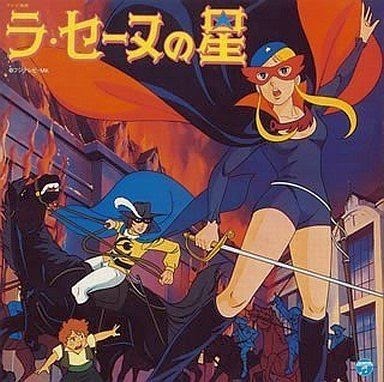
1. Introduction
Well, dear reader, here it is. My first ever official review. And, as promised, this is one of the pieces of Frev media that you have likely never heard of before.
So, without further ado, sit down, relax, grab drinks and snacks and allow me to tell you about an anime called “La Seine no Hoshi” (The Star of the Seine).
“La Seine no Hoshi” is a children’s anime series made by Studio Sunrise. It consists of 39 episodes and was originally broadcast in Japan from April 4th to December 26th of 1975.
Unlike its more famous contemporary, a manga called “Rose of Versailles” that had begun being released in 1972 and is considered a classic to this day, “La Seine no Hoshi” has stayed relatively obscure both in the world of anime and among other Frev pop culture.
Personally, the only reason why I found out about its existence was the fact that I actively seek out everything Frev-related and I just happened to stumble upon the title on an anime forum several years ago.
So far, the anime has been dubbed into Italian, French, German and Korean but there is no English or even Spanish dub so, unfortunately, people who do not speak fluent Japanese or any other aforementioned language are out of luck ( if anyone decides to make a fandub of the series, call me). That being said, the series is readily available in dubs and the original version on YouTube, which is where I ended up watching it. The French dub calls the anime “La Tulipe Noire” (The Black Tulip), which could be an homage to the movie with the same name that takes place in the same time period.
Unfortunately, while I do speak Japanese well enough to maintain a basic conversation and interact with people in casual daily situations, I’m far from fluent in the language so the version I watched was the French dub, seeing as I am majoring in French.
So, with all of this info in mind, let’s find out what the story is about and proceed to the actual review.
2. The Summary
(Note: Names of the characters in the French dub and the original version differ so I will use names from the former since that’s what I watched)
The story of “La Seine no Hoshi” revolves around a 15-year old girl called Mathilde Pasquier - a daughter of two Parisian florists who helps her parents run their flower shop and has a generally happy life.
But things begin to change when Comte de Vaudreuil, an elderly Parisian noble to whom Mathilde delivers flowers in the second episode, takes her under his wing and starts teaching her fencing for an unknown reason and generally seems to know more about her than he lets on.
Little does Mathilde know, those fencing lessons will end up coming in handy sooner than she expected. When her parents are killed by corrupt nobles, the girl teams up with Comte de Vaudreuil’s son, François, to fight against corruption as heroes of the people, all while the revolution keeps drawing near day by day and tensions in the city are at an all time high.
This is the gist of the story, dear readers, so with that out of the way, here’s the actual review:
3. The Story
Honestly, I kind of like the plot. It has a certain charm to it, like an old swashbuckling novel, of which I’ve read a lot as a kid.
The narrative of a “hero of the common folk” has been a staple in literature for centuries so some might consider the premise to be unoriginal, but I personally like this narrative more than “champion of the rich” (Looking at you, Scarlet Pimpernel) because, historically, it really was a difficult time for commoners and when times are hard people tend to need such heroes the most.
People need hope, so it’s no surprise that Mathilde and François (who already moonlights as a folk hero, The Black Tulip) become living legends thanks to their escapades.
Interestingly enough, the series also subverts a common trope of a hero seeking revenge for the death of his family. Mathilde is deeply affected by the death of her parents but she doesn’t actively seek revenge. Instead, this tragedy makes the fight and the upcoming revolution a personal matter to her and motivates her to fight corruption because she is not the only person who ended up on its receiving end.
The pacing is generally pretty good but I do wish there were less filler episodes and more of the overarching story that’s dedicated to the secret that Comte de Vaudreuil and Mathilde’s parents seem to be hiding from her and maybe it would be better if the secret in question was revealed to the audience a bit later than episode 7 or so.
However, revealing the twist early on is still an interesting narrative choice because then the main question is not what the secret itself is but rather when and how Mathilde will find out and how she will react, not to mention how it will affect the story.
That being said, even the filler episodes do drive home the point that a hero like Mathilde is needed, that nobles are generally corrupt and that something needs to change. Plus, those episodes were still enjoyable and entertaining enough for me to keep watching, which is good because usually I don’t like filler episodes much and it’s pretty easy to make them too boring.
Unfortunately, the show is affected by the common trope of the characters not growing up but I don’t usually mind that much. It also has the cliché of heroes being unrecognizable in costumes and masks, but that’s a bit of a staple in the superhero stories even today so it’s not that bothersome.
4. The Characters
It was admittedly pretty rare for a children’s show to have characters who were fleshed out enough to seem realistic and flawed, but I think this series gives its characters more development than most shows for kids did at the time.
I especially like Mathilde as a character. Sure, at first glance she seems like a typical Nice Pretty Ordinary Girl ™️ but that was a part of the appeal for me.
I am a strong believer in that a character does not need to be a blank slate or a troubled jerk to be interesting and Mathilde is neither of the above. She is essentially an ordinary girl with her own life, family, friends, personality and dreams and, unfortunately, all of that is taken away from her when her parents are killed.
Her initial reluctance to participate in the revolution is also pretty realistic as she is still trying to live her own life in peace and she made a promise to her parents to stay safe so there’s that too.
I really like the fact that the show did not give her magic powers and that she was not immediately good at fencing. François does remark that her fencing is not bad for a beginner but in those same episodes she is clearly shown making mistakes and it takes her time to upgrade from essentially François’s assistant in the heroic shenanigans to a teammate he can rely on and sees as an equal. Heck, later there’s a moment when Mathilde saves François, which is a nice tidbit of her development.
Mathilde also doesn’t have any romantic subplots, which is really rare for a female lead.
She has a childhood friend, Florent, but the two are not close romantically and they even begin to drift apart somewhat once Florent becomes invested in the revolution. François de Vaudreuil does not qualify for a love interest either - his father does take Mathilde in and adopts her after her parents are killed so François is more of an older brother than anything else.
Now, I’m not saying that romance is necessarily a bad thing but I do think that not having them is refreshing than shoehorning a romance into a story that’s not even about it. Plus most kids don’t care that much for romance to begin with so I’d say that the show only benefits from the creative decision of not setting Mathilde up with anyone.
Another interesting narrative choice I’d like to point out is the nearly complete absence of historical characters, like the revolutionaries. They do not make an appearance at all, save for Saint-Just’s cameo in one of the last episodes and, fortunately, he doesn’t get demonized. Instead, the revolutionary ideas are represented by Florent, who even joins the Jacobin Club during the story and is the one who tries to get Mathilde to become a revolutionary. Other real people, like young Napoleon and Mozart, do appear but they are also cameo characters, which does not count.
Marie-Antoinette and Louis XVI are exceptions to the rule.
(Spoiler alert!)
Marie-Antoinette is portrayed as kind of spoiled and out of touch. Her spending habits get touched on too but she is not a malicious person at heart. She is simply flawed. She becomes especially important to the story later on when Mathilde finds out the secret that has been hidden from her for her entire life.
As it turns out, Marie- Antoinette, the same queen Mathilde hated so much, is the girl’s older half-sister and Mathilde is an illegitimate daughter of the Austrian king and an opera singer, given to a childless couple of florists to be raised in secret so that her identity can be protected.
The way Marie-Antoinette and Mathilde are related and their further interactions end up providing an interesting inner conflict for Mathilde as now she needs to reconcile this relationship with her sister and her hatred for the corruption filling Versailles.
The characters are not actively glorified or demonized for the most part and each side has a fair share of sympathetic characters but the anime doesn’t shy away from showing the dark sides of the revolution either, unlike some other shows that tackle history (*cough* Liberty’s Kids comes to mind *cough*).
All in all, pretty interesting characters and the way they develop is quite realistic too, even if they could’ve been more fleshed out in my opinion.
5. The Voice Acting
Pretty solid. No real complaints here. I’d say that the dub actors did a good job.
6. The Setting
I really like the pastel and simple color scheme of Paris and its contrast with the brighter palette of Versailles. It really drives home the contrast between these two worlds.
The character designs are pretty realistic, simple and pleasant to watch. No eyesores like neon colors and overly cutesy anime girls with giant tiddies here and that’s a big plus in my book.
7. The Conclusion
Like I said, the show is not available in English and those who are able to watch it might find it a bit cliché but, while it’s definitely not perfect. I actually quite like it for its interesting concept, fairly realistic characters and a complex view of the French Revolution. I can definitely recommend this show, if only to see what it’s all about.
Some people might find this show too childish and idealistic, but I’m not one of them.
I’m almost 21 but I still enjoy cartoons and I’m fairly idealistic because cynicism and nihilism do not equal maturity and, if not for the “silly” idealism, Frev itself wouldn’t happen so I think shows like that are necessary too, even if it’s just for escapism.
If you’re interested and want to check it out, more power to you.
Anyway, thank you for attending the first ever official meeting of the Jacobin Fiction Convention. Second meeting is coming soon so stay tuned for updates.
Have a good day, Citizens! I love you!
- Citizen Green Pixel
#review#french revolution#anime#history#television#frev media#Jacobin Fiction Convention#marie antoinette#French Revolution anime#la seine ni hoshi#la tulipe noire dessin animé#la tulipe noire
25 notes
·
View notes
Text

Dracula's life from birth to 7 years by Lyzhina Svetlana Sergeevna (Лыжина Светлана Сергеевна) originally in Russian.
http://samlib.ru/l/lyzhina_s_s/dracula_7.shtml
In this article I have tried to collect ALL the information somehow related to the early childhood of Dracula, and the story of childhood always begins with the story of the birth, so that's where we'll start.
When Dracula was born.
The year of Dracula's birth is reported differently by different books. Some say 1429 and some say 1431, but all of these statements are based on the same facts.
_ _ _ _ _
Fact 1 - Dracula had an older brother, about whom we know that in 1442 he was 13-14 years old. This is reported in Jean de Wavrin's "Anciennes Chroniques d'Angleterre".
Fact 2 - Dracula first ascended the throne in November 1448 and began to rule without the help of a regent, which means that Dracula was already 17 years old at the time.
_ _ _ _ _
These two facts are the basis of all the assumptions we find in various books, so it is not difficult to guess where the numbers 1429 and 1431 come from.
If the elder brother of Dracula in 1442 was 13-14 years old, it turns out that this brother was born around 1428, which means that Dracula himself couldn't have been born before 1429.
At the same time, if you count Dracula's age from the time of his first reign, that is, subtract 17 from 1448, you get 1431. By the way, that is why the birth of Dracula is often associated with another fact - the entry of Dracula's father into the Order of St. George (Order of the Dragon).
It is presumed that the accession took place no later than January 1431, since in a letter dated February 8, 1431, drawn up in Nuremberg, Dracula's father, among other things, states that he enjoyed the support of Emperor Sigismund of Luxembourg, who was the head of the Order.
House in Sighisoara
It is common knowledge that Dracula's early childhood was spent in the Transylvanian town of Sighisoara, where our hero lived with his father, mother and older brother until the fall of 1436, which means that at the time of his departure from the "land of childhood" Dracula was no more than 7.5 years old.
How many memories could Dracula have of Sighisoara? About as many as each of us remembers of kindergarten and the first school bell. Is it a lot or not - you decide.
The house where Dracula lived is located on the corner of Zhestianshchikov Street and Museum Square. Zhestvenshchikov Street is a historical name, and Museum Square was a street in the Middle Ages and, of course, was called differently. The most likely name is Blacksmith's, so you can imagine the sounds that little Dracula heard from morning to night.
The mint in the house.
It is also known that Dracula's father set up a sort of mint in the family nest. Special people came to the house and were engaged in minting gold money - the very coins with dragons, thanks to which Dracula's father got his nickname.
The minting process and the coins themselves looked like this: https://img-fotki.yandex.ru/.../440.../0_acb55_83f50b94_orig
Of course, the presence of unauthorized people in the house and the constant hammering of the stamp caused some inconvenience to the family, but it was impossible to move the "production" to another place, because only Dracula's father had the right to mint money, and in order to comply with legal formalities, he had to do it in his own territory.
Frescoes in the house
Unfortunately, we don't know exactly what Dracula's house looked like in the 15th century. What we see now is the 17th century, but many researchers believe that the house still has something that existed in the 15th century - a mural on the wall of the second floor.
I read on the official website of House of Dracula that there were originally 4 people in the mural, although only 3 images have survived. It is believed that the "man in a turban" and the woman next to them are Dracula's parents, and to the right and left of them the artist depicted guests invited to the feast.
That the fresco depicts four people, not three, is more than
likely, but the assumption that next to the owners of the house are depicted guests, I personally think wrong, because Dracula's parents, ordering a painting, would have preferred to see there not guests, but really close people, i.e. relatives. I think the mural was a family portrait, not just a sketch from life.
The gray-bearded man on the right side of the fresco looks a lot like Dracula's maternal grandfather, the Moldovan sovereign Alexandru the Good. If I am right, the portrait on the opposite side, which is not preserved, belonged to the Romanian sovereign Mircea the Old, Dracula's paternal grandfather.
https://img-fotki.yandex.ru/.../4400.../0_acb56_233d42a_orig
By the way, there are other frescoes on the second floor, or rather remnants of frescoes. In some places we can see floral ornaments, and on the upper slopes of the windows we can see figures of some people, depicted waist-length and placed in round frames.
Most likely, the frescoes on the slopes date from the 16th century, as the numbers 1576 are visible on one of them. The only thing we can say for sure is that these frescoes depict noble people. Near one of the images there is a figure of a two-headed eagle. Next to the other image is the inscription "archi..." (Latin: archiepiscopus - archbishop). In a third image, a woman's hairstyle and a richly patterned dress are clearly visible.
https://img-fotki.yandex.ru/.../440.../0_acb57_354e446a_orig
Services in the house
Dracula's family was Orthodox, and the population of Sighisoara in the 15th century consisted almost entirely of Catholics, since at that time Transylvania did not belong to Romania, but to Hungary, a traditionally Catholic country.
There were no Orthodox churches in Sighisoara at all, and this posed a serious problem for Dracula's father and mother. Dracula's parents were supposed to live a church life, which is possible only with the participation of a priest, who can take confession, baptize the newborn, etc.
Dracula's parents lived in Hungary for many years - first at the court of Sigismund of Luxembourg, and then in Transylvania - and all this time were away from Orthodox parishes. For example, it is known that in the Middle Ages there were no Orthodox churches in the Hungarian capital. Such a temple appeared only at the end of the 15th century in the neighboring city - in Pest - and was a wooden church built by the Orthodox Serbian settlers.
How did Dracula's parents deal with the issue of confession and baptism of their children? After all, someone had to baptize the newborn Dracula as well! Most likely, the parents, being well-to-do people, hired a certain Orthodox priest, who conducted home services, took confessions, etc.
By the way, little Dracula, living in Sighisoara, is unlikely to have confessed, because in Orthodoxy all children under 7 years are considered absolutely sinless, and Dracula at the time of his move from Sighisoara to Romania was (recall) no more than 7.5 years.
Dracula's first steps in comprehension of sciences
If you believe the textbooks on the history of pedagogy, the basic principles of education since the Middle Ages have not changed so much. In the Middle Ages, as now, science was taught from the age of 7, but Dracula probably began learning a little earlier.
The Dracula researcher M. Kazaku suggests that Dracula and his elder brother had teachers in common, as the difference in the age of the brothers was insignificant - two years maximum.
If further to follow this logic, then it turns out that the older brother Dracula began to learn reading at age 7 as it should be, and Dracula was put in school at 6 or even 5 - just for the company, so that the younger brother did not hang around while the older one was sitting in class.
All the textbooks on the history of pedagogy say that in the Middle Ages the teachers of the "book sciences" were from the church milieu. Even if it was to teach a child who was not prepared for a spiritual career, he was still taught by churchmen, because they were the most literate and educated class.
By the way,
this is another argument in favor of the assumption that while Dracula's family was wandering around Catholic lands, an Orthodox priest lived there all the time. Dracula's parents needed this priest also because someone had to teach their children to read and write.
In any case, we can say with absolute certainty that the literacy learned by the young Dracula was Slavic. He simply could not have been taught Romanian literacy, because it did not exist in the 15th century.
If we look at the history of the Romanian language (old Romanian to be exact) we see that it was an oral language until the 16th century. The earliest known letter written in Romanian goes back to 1521 and is in Cyrillic script, because most of the official documents in Romania at the time were written in Slavonic and the liturgies were held in the same language. Exactly in Slavonic, not in Latin, as many people think for some reason!
This gives us reason to believe that the little Dracula, as a child of an Orthodox family, studied first of all the Slavic letters, and not the Latin.
It turns out that already at an early age Dracula knew three languages:
- Romanian, because it was spoken in the family;
- Hungarian, because the family lived in Hungarian lands;
- Slavonic, because it was the starting point for literacy.
It seems incredible that a child at such an early age could be taught a Slavic language - essentially a foreign language - but there is nothing surprising in all this. At a later time in the so-called "classical gymnasiums" young children had to learn two foreign languages at once - Greek and Latin - but no child died or went mad from this teaching. So could not the little Dracula learn the Slavic alphabet?
That is, perhaps, all there is to it, and of Dracula's further maturing one can
16 notes
·
View notes
Text
Kalimat/كلمات
Yusuf al-Khaysani/Niccolò di Genova, 3.3k, teen, AO3 LINK
Yusuf translates medical texts for Niccolò from Greek and Persian into Arabic, and Niccolò spots the substratum of the ideas of the classical authors that he had once believed the basis of his own civilisation that he would go to the sword to defend, translated and passed down and sewn into a no longer foreign script. There are words Yusuf does not know how to translate. They will never, ever know all of the words. The prospect is thrilling.
---
It takes Niccolò lifetimes to learn Arabic.
(I've tried pretty hard to make this at least historically feasible but I'm very sure this is just. Jam packed with mistakes. As is the Arabic langauge stuff- I got booted from the class due to dyslexia. I also hope the representation of Islam and Islamic culture is accurate.)
Languages drop from Joe’s lips easily. Nicky struggles with survival phrases in lingua francas- What Hurts in Dari and Can you breath- nod yes in Swahili and How can we help in French, but Joe can easily lose himself in the sea of a new language’s words and come up swimming, not just stringing together sentences but swallowing poetry, drama, and music. In Ughyar, Bosnian, Zapotec, Spanish, Tamil, Sylheti, Albanian. The shelves of his books line their lives. That is important to Joe, that people be seen not just as they always seem to be in western news reports - as the bodies in the ruined city- but as poets. As storytellers. As humans who struck fire with language that will survive and burn anew.
Joe recites Khachatur Abovian to calm the fractured nerves of a former schoolteacher ripped from his home while he and Nicky rush to forge passports and visas for the teacher and his wife and his seven children to make new lives in America. In a post war displaced persons camp he speaks Yiddish, reads Sholem Aleichem and Avrom Sutzkever from paperbacks pulled from the fires and then decades later in the dust of Baghdad, Arabic and al-Sayyab. And he listens, listens even more than he speaks. He listens to stories upon stories of war and loss and human suffering with his ears and his eyes and heart and a clasped hand that says, I do not claim to know your pain but I have felt my own.
Nicky sets arms and delivers babies and administers vaccines and sorts endless boxes of quinine tables and bandages. He speaks with his hands, mainly, and his bedside manner is different from Joe’s. He learned long ago to keep lollipops in the right pocket of his jacket. The first language Nicky learned to speak was the sea and the second was the wind, and spoken words come to him slower, with less agility, blending into occasionally archaic jumbles. He means to ask an assistant for an antiseptic wipe at one point, has to dig through his mind through the piles of once vital vocabulary bleached useless by time, military jargon for battles lost nine hundred years ago and colloquial derja words for plants and crops gone extinct under the tides of modern monocropping, and comes up sputtering, asking if anyone, perchance, has a neckerchief?
The linguistic stumbling of an unlettered genovese sailor versus a middle class trader’s son who learned to love the written world on his mother’s lap.
It took Nicky a human life time to master spoken Arabic, in a few of her many varieties, with her tricky mazes of roots, more decades of listening and stumbling through conversations and gentle corrections than the average human mind could take before his own readujsted to the beauty of a world described through roots with all things connected to each other.
It took him another life time again to master fusHa, the complex turns of phrase and imagery and unwritten short vowells, and a brush and then pen always felt far more alien in his hands than a sword did. (Although the precision of a pen prepares him well for the precision of a scalpel, and that, perhaps, is the instrument with which Nicky writes history.)
A thousand years ago, in the same city who’s people Joe and Nicky will die again and again for to try and pull from the ruin, the man then Yusuf wrapped his hand around the hand of the man then Niccolò and guided him through this mysterious world of written letters. Alif-ba-ta-thaa and then nun-qaf-waw-lam-alif,
اسمي نقولا
For the first time, Niccolò wrote himself down.
The script contained other mysteries and hidden trap doors. The disappearing mem that could get swallowed by lam and alif and the mysterious shape-shifting ta marbouta and the categories of sun and moon letters that lent the marks on a page a tangible quality, the burning Mediterranean sole that Niccolò’s people marked their years by and la luna by which Yusuf’s people knew their own time by.
When they had reached their first truce in the battlefield and had to learn how to say things beyond various threats and claims of the name of God, they’d each had to remake the world in a new image, relabel everything they’d thought they’d known. Shams, the enemy man had said over and over again, pointing up, and Niccolò hadn’t known if he meant “sky” or “blue” or “above” or “God” or the color “blue.” Niccolò had drawn a line in the sand, the past running to the future and tried to map out the different tenses of his own language he didn’t fully understand himself, only knew how he’d use them in a sentence. He’d hatched an x in the middle for now, drawn two little stick figures and two blobby horses, us he’d said in zenaize, then future, right of the men, past, left.
“Ahhh,” the man who Niccolò now knew as Ana Ismee Yusuf, nodded. He stood up and pointed right. “Lelshar’.” To the left. “Lel’arb.” He smiled and Niccolò thought it might be worth dying, just to see again. “Si, si. Io capiscooo.” He stretched his syllables out in a deadpan imitation of a puffed-up Genovese noble, and Niccolò laughed himself.
Several lifetimes later and Niccolò tries to label his world anew again in writing. Yusuf writes out words in large, blocky script on pieces of scap paper, marks the harakat around the words carefully in red ink. He tacks باب to the door and سَرِير to their bed and even أنا to himself. He holds up a piece of paper to the sky outside, the sun blinding their eyes momentarily before they repair. الشَّمس, the first word. Yusuf even attempts to stick قِطّ onto Amira, the sharp eyed street cat who’s wormed her wait into their household. The scratches that earns him heal quickly.
It takes Niccolò far longer than he wants anyone to know before his mind properly started to see a word and see it as a word, something more than a collection of letters but a thing that existed, definitively, in God’s world. بَيْت, what he and Yusuf have now had in Basra, Palermu, Fustat. مُحيط, like the Mare Nostrum. فَتاة, a girl like like the sister he left behind.
And then the door was opened, and Niccolò could read, or at least, understand this process of reading for himself, and more than that, he could see this part of Yusuf, so crucial to the soul he nad come to love and this heart he now held in his own. Yusuf loved words, and books, and writing, he loved his Book as the word of God to his prophet and he loved his books as connection to the mother who had first taught him suras and his father who wrote in three languages, and, he had once gold Niccolò in the quiet safety of their bed, in the night, with the first boy he had ever loved, the other star pupil at their madrassa with whom he would lie composing lines of poetry under a lemon tree.
Niccolò thought of Yusuf reading in the small, cool courtyard of the house in Damascus that would for this lifetime be their home, his mouth moving silently in prayer as his fingers followed reverently over the verses. He thought of Yusuf moving elegantly through the world, his speech dry and witty or educated where his own felt blunt, trading jokes and barbs back and forth in the tea house and the market. But mostly, Niccolò thought of Yusuf writing, face still with all the steady focus and silent reverence of prayer, bent over a carved rosewood writing desk, the sunlight streaming in through the windows setting his curls on fire. And his hands, so strong, so reliable, moving unerringly across the page, line after line of the script that Niccolò once feared and mocked because he feared but which he now knew could contain all the beauty of the world.
He practiced by writing to the those he loved but no longer walked the world.
Oum, today sun bright. I see roses in market. I think of you, when I see roses in market.
Abba, in house of God happy I know you are, happy makes it me.
Maria, to read you will love, i know. Your son man now. Good i know. Peace to you.
Niccolò burned the letters in a fire and hoped God would make it so his 'aa'ila could read them. Yusuf and Niccolò were both young in the business of being immortal. They had not learned to shoulder the pain of it yet, so they faced the loneliness, together and alone. Niccolò thought that he saw the appeal of letter writing, then, imagined a world in which he could have written his family from the Holy Land, told them that no matter how many infidels he killed to cleanse this world for the Cross he felt no closer to holiness himself, told them that the one he killed and killed and killed again he had found holiness in, told his parents that their son died and died and did not die. That he missed home, the rocky shores and fishing villages of Liguria, but that he missed them more, because his family was his home, even if there were things about him that he hid in the darker parts of himself because he knew they would never understand.
His sister’s grandchildren- or maybe her great-grandchildren, he wasn’t quite sure- were still alive, probably, but there wasn’t a way they’d respond well to the idea of a relative who’d have been forty years past death even without war sending them letters written in the alphabet they’d been taught to hate, if they could read at all.
With the ashes of his letters, he lets his family go, and prays God looks kindly upon them, and shows them mercy, and grants them peace and understanding. Every century or so, he’ll check in, he vows, even from afar, because he owes Maria that much. He hopes her son or his son or his son has not wasted his life to die in a war on foreign soil like he did, or that her daughter or her daughter or her daughter has not been left a widow.
Yusuf’s family still lived in Tunis. His sister Maryam took over the trading business after his death and made the al-Khaysani family a great name and funded many hospitals and houses of learning. News of her death reached Palermu weeks after the burial, and it was one of the few times in their long, long lives that Yusuf had to walk for months alone, to process a grief as large as the world. He let the waves of the sea and the sand of the desert swallow him again and again, and when he did not die, he rose and lifted his head to the sky and swore he would make the world as good as she wanted it to be. In every city they go to with a cathedral or even a baked mud church Niccolò lights candles for Maria and for Maryam. Santa Maria, madre de dio, they’ll pick up one day, in a language centuries off from existing. You know she is named more times in our book than yours, Yusuf told him in one one of their many cycles of death and coming back, when Niccolò called out for her, bleeding out on the sand.
When Niccolò found Yusuf again they stood with their hands clasped at her grave outside the medina and then they prayed and set off again. New cities, new tongues, new people. To avoid suspicion, they alter the sounds of their names to match the sounds of the city. Yusuf and Naaqid. Giuseppe and Niccolò. Nikolai and Iosef. Every death is shorter.
Yusuf forges the documents and the names, barters and trades, even makes several seperate respectable fortunes as a merchant of cloth and then spices before even claims of pomegranates doing wonders for one’s health start to wear a bit thin and they have to fake their deaths again. He writes, and though home quickly becomes what they can carry, he keeps sheaths of poetry in tiny, perfect script in his saddlebag, recites long poems as they make camp in the desert. Some were written by and for men like them. Others Yusuf tweaks the gender of, chooses inta over inti. Every time they die they leave a generous waqf behind.
Niccolò takes care of the horses, and then he tries to take care of people. He learns as much of these strange healing arts of the east as he can from Yosef, and then from a doctor in Basra and a Jewish apothecary in the city of Fustat. It is not blasphemy to try to know the body, he is deciding, it is not sacrilige to try as hard as one might to save a life. At some point, the knowledge goes beyond what he can remember or what a diagram can tell him, and so it’s in Damascus that Niccolò decides, even with his previous failed attempts at the aliph-baa, to ask Yusuf to teach him how to read.
And he does. It takes time, years, before he can, before he feels more man than child with a pen in his hand and he does not smear ink across the page. And there are limits. He is never a poet. His language is always more practical than- and this is a word that will not exist for centuries but that colors his memories even still- than romantic. For him heart is a thing of muscles and chords that powers a life. He reads and takes notes on Al Razi far more than Abu Nuwwas or al Muttanabi. Ibn Sina’s Canon of Medicine astounds him just as Ferdowsi’s perfect schemes of monorhymes entrance Yusuf. His sentences do not flow into rivers like Yusuf’s do. They build squat, strong houses. They encode information that Niccolò can leave behind when he dies, only to return to a century later and find that have been added on to by scholars after him, the foundations for someone else’s palace. Sometimes, the things he thought were true are completely washed away in the flood of some new discovery, and he prays and begs the forgiveness of all those he caused unnecessary pain in his ignorance.
But even in his clumsiness, the power of words surges through. Yusuf’s words and his love of words surges through to Niccolò in the years of learning, until Niccolò loves words too, just as Niccolò’s love of the sea and her many tempestuous moods and promise of infinite freedoms filters through to Yusuf. Yusuf translates texts for Niccolò from Greek and Persian into Arabic, and just as with Mary and Maryam centuries ago on a battlefield, Niccolò spots the substratum of the ideas of the classical authors that he had once believed the basis of his own civilisation that he would go to the sword to defend, translated and passed down and sewn into a no longer foreign script. There are words Yusuf does not know how to translate. They will never, ever know all of the words. The prospect is thrilling.
And Yusuf’s love of words surges up into Niccolò’s love of Yusuf too. It took him about three weeks after their initial truce to realise the man was soft, which then took him a few decades to find more endearing than annoying. That he liked sweet things and flowers and goddamn useless hobbies like calligraphy and drawing complex borders of tulips and interlocking knots along the borders of his writing papers. And he knew he was a good poet, to his own ears, that he fit words together nicely. But being able to read Yusuf’s poems, even the unwritten snippets he leaves scattered around the house, often unfinished, is something else entirely. A glimpse into being seen, by the person who sees him best. But God above, he doesn’t think anyone alive has had their eyes compared to the beauty of the sea after the desert quite so many times, or wrung as many turns of phrase from the has the double meaning of عَيْن.
“The world,” he says one night as they sit and watch night descend softly upon the City of Jasmine. It’s a city to make even the woman who will come knocking at their door in a matter of decades feel young and insignificant, and even the colloquial name suits Yusuf’s pretensions annoyingly well. Steam from cups of tea curls into the evening air. The smells of horse shit and rosewater both on the air. The calm cradle of the evening after the maghrib prayer. “You see it …” He does not know how to end it.
“How, then, do I see the world, hayati?”
“You see the stars above a battlefield. You see the stars and then the fields that will grow again after the ashes are tilled into the soil. You see stars as gems, and the windstorms of the desert is the finest music, if you would believe your poems.
“And you are angry that I have seen the good in the world? I would not call the man who came to a foreign land to kill the infidel and came to spend a hundred years learning best to save their lives a man who does not see beauty in unexpected things either.”
“You are-”
He looks for a word, any word in his mind that has learned so many. Unchanging would not be right for the man who once killed him so many times and learned Greek and Latin to read him the words of the Apostles as they were written, who has accompanied him on pilgrimages to Antioch and the Church of the Nativity in Bethlehem. He has changed as much as Niccolò has. No, it’s something-
“You are looking at me as you look at your patients.” Yusuf reaches out and brushes back Niccolò’s hair. He kisses his forehead. A kiss from Yusuf, no matter how chaste or how many, still sends lightning through his body.
“As if you were ill?”
“No. You look with such focus upon the world, with so much kindness about how to help it heal.” For a time whose number has since gone beyond count, their hands interlink. “We cannot save the world, but we can save some, and by saving some, we can save the world. We will work to repair what is broken.”
“I have found the cause of your affliction.”
“What do you consider me afflicted by, Doctor Al-Zenowaizi?”
The word romantic is still more than six centuries out, although they’ll soon wander through Europe during the heyday of the romance, and Yusuf will even write a few himself in Occitan and Provençal. For now, though, the word carries the implications of Roma and the waning Basileion Rhomaion to the north, to the al-Rum rite of the Damascene churches he now celebrates the Eucharist in, the river of his faith turned down a different course. For now, though, the word romantic remains firmly in the future. No, it’s something else he thinks of.
“Hope. You have a most serious case of hope.”
“And what do you suggest as remedy, Doctor Al-Zenowaizi?”
Niccolò pulls him in for a proper kiss, long and deep and hot and sweet and bitter from the tea. He loses himself in the warmth of his body, his hands in the curls of his hair, and he thinks how blessed he has been by God that this is the man he has been destined to spend forever with.
“Albi, I do not think there is one. I think you have been cursed with an incurable case of hope.”
#the old guard#joe x nicky#the old guard fic#yusuf x nicolo#yusuf al-kaysani#nicolo di genova#my writings
344 notes
·
View notes
Note
I had this fic idea where: Calla, Haegon, their mother and youngest siblings didn't escape and they were taken as hostages in the Red Keep. Calla kind of ends up "playing the game" and trying to forge a better life for her mom and siblings while trying to overcome her trauma of losing her brothers and dead, her anxiety over Daemon II not being around and not having any contact with him and Haegon most likely going to the faith. And she also has survivors guilt. Basically this is a "Calla plays the game while trying to survive" (this includes her glaring at BR and lowkey planning his death, finding Matarys endearing because he's actually fairly nice and so is his brother/dad, she also looks like her mom. OH AND SHE DYES HER HAIR QUITE OFTEN)
Basically my question was: how much would have changed if Calla, Haegon and their mom and younger siblings didn't get to escape?
That’s a really interesting, elaborate fic idea, dearxstorm! If you end up writing it, make sure to link me and I’ll write a comment! Calla has the potential to be an interesting character, and your characterization of her in the prompt sort of lines up with my own (having the Sweetness hiding Steel personality); I like the idea of a psychological story of her dealing with the loss of her family while trapped in a court that hates her at best. I also like your headcanon that she dyes her hair, because it’s a physical identification with her mother’s people; all too often, in asoiaf as in other works of fantasy, the heroes of noble families identify more with their father’s house at the expense of their mother’s (the young Starks identify more with their father’s house to a lesser degree than the others, but even the young Greyjoys are krakens rather than Harlaws, the young Martells don’t consider themselves half-Norvosi, forget about Aegon V + siblings identifying themselves as something other than the blood of the dragon), and it’s the villains that tend to include parts of their mother’s heritage (the Baratheons of king’s landing include a lion in their sigil, the Greens from the Dance of Dragons owed their initial success to their Hightower mother). In addition, Essosi women are almost to a woman treated horribly in Westeros; divorced (Mellario, Larra), exiled (Rohanne), or tortured and killed (Mysaria, Tyanna, Serala, Serenei), so it’s great you decided to single out Rohanne’s Essosi influence on her children as something neutral to positive.
As for your question about what would happen if Calla+family didn’t manage to escape, I asked warsofasoiaf about it years ago; his response that Bl00draven would’ve had them all killed, while certainly in-character (his consistent character trait is harming boys to accomplish his goals), isn’t particularly satisfying for writing a fanfic with these characters. We see Da3ron II took lands and hostages from those who knelt; Lord Bracken’s son died during the Great Spring Sickness, perhaps as a hostage in King’s Landing; Eustace Osgrey’s daughter and only heir Alysanne was sent to the Silent Sisters at age 7, while Standfast went from a prominent lordly house to one of landed knights. Daemon’s lands and titles were likely under attainder, being of fairly recent creation. In Westeros, killing (mostly male heirs) or sending to the Faith (more likely female heirs) the child rivals to one’s lordly power seems to be the norm (most infamously Aegon and Rhaenys Targaryen on Tywin’s orders, but also Cerelle Lannister by her uncle Gerold, Rohanne and Cerelle Tarbeck were sent to the Silent Sisters and Rohanne’s young son was likely murdered during the Reyne Rebellion, the extermination of Houses Darklyn and Hollard bar one after the Defiance of Duskendale). So I tried to look at examples from medieval history to see if I could save the younger Blackfyre boys:
As much grief as I give GRRM for not being historically accurate while claiming he’s true to life, the gendered fate of young male and female rivals who were captured seems to pass muster: with boys usually being killed or “disappeared” (Arthur of Brittany was imprisoned then murdered by his uncle King John of England, the Princes in the Tower mysteriously vanished with the prime suspect as their uncle Richard III) and girls either imprisoned (Arthur’s sister Eleanor was imprisoned for 44 years until her death by her uncle John and cousin Henry), forced into a convent (Gwenllian Princess of Wales by Edward I, Joanna la Beltraneja was given a choice between this or marrying her infant cousin Juan by his mother Isabella of Castile), or married to steal their lands/unite claims (Arthur’s mother Constance was betrothed to his father from age 5 after her brother was forcibly disinherited from the duchy of Brittany, and I’m still not sure what happened to him; Eleanor de Montfort was eventually married to Llewellyn of Wales after she was captured and imprisoned by the English).
I think the best hope for the Blackfyre boys is for them be rescued and taken to Tyrosh (although Bl00draven would probably try to separate them to prevent all of them taken at once).
A longer-term option is for Rohanne’s relatives in Tyrosh to try to negotiate their release, probably with a solemn oath never to return to Westeros (happened with the Charles VII’s cousin Charles Duke of Orleans who spent 25 years in various English prisons after his capture by the English at Agincourt until his old rivals the Burgundians negotiated his release; Amaury de Montfort, despite having taken holy vows, was captured along with his sister Eleanor and only by swearing never to return to England and the Pope plus Llewellyn intervening was he released).
Failing that, maybe Baelor Breakspear could try to go ‘the Dontos Hollard route’, asking for clemency out of the boys’ age/birth, and sending them to King’s Landing as squires, and probably make sure they don’t return to their old lands. I doubt they’d be allowed to wed, but I suppose Rohanne could petition for a restoration of Daemon’s old lands to House Blackfyre (as Anne Scott managed to save her lands from her husband Duke James’ attainder after the Monmouth rebellion, and her two surviving sons by him were able to marry and inherit and were loyal to the crown), and they could be wed into a loyal Red house of Da3ron’s choosing; it’d be her grandchildren inheriting these lands (Elizabeth I imprisoned her cousin Katherine Grey for the rest of her life for secretly marrying and had her separated from her two sons, but they were allowed to marry and her grandson became the next Duke of Somerset, despite his family reputation). Not Daemon II if he’s been captured with the others, but possibly Aenys. I’m not saying this is a likely scenario considering the characterization of Bl00draven and the actions of Da3ron II to the other children of rebels, but it’s a kinder solution that maybe Baelor might come up with.
I don’t imagine that these boys will be sent to the Faith, but rather the Night’s Watch seems to be the place for defeated rebels/men sentenced to death; so in all likelihood at least the elder ones could be sent to the Night’s Watch once they’re old enough. Westeros as well as medieval history has shown how easy it could be to take someone from a convent/monastery and use them to take their lands/incite a rebellion (Robar abducting Rhaella from the Faith; Marie of Boulogne was abducted from her convent by Matthew of Alsace to forcibly marry him to steal her lands), plus these vows can be undone (at least in medieval Italy, where sometimes cardinals had to leave the Church to get married to continue their family line; it’s implied in the sentences of Lucinda and Priscella that septas can break their vows) so I think at least the elder ones would not be allowed.
The Blackfyre girls have a higher chance of not being murdered. The worst case-scenario that I could unfortunately see happening is sending them to the Silent Sisters along with poor Alysanne Osgrey, which seems to happen to the most dangerous of noblewomen (rebel queen Marla Sunderland, sasser-of-kings Maris Baratheon, Ellyn Reyne’s daughters Rohanne and Cerelle), all potential heiresses for another rebellion (not likely with so many brothers, but if they manage to escape and another uprising coalesces around them who knows). Another option would be to the Faith to be septas, which happened to more minor noblewomen men wanted out of the way (Rhaella and Megette’s daughters for their “inconvenient birth”, Lucinda Penrose and Priscella Hogg for their roles in the plot to kill Daenaera).
A particularly painful scenario would be confining them in the Maidenvault until/if a new king decides to release them as their grandmother Daena was. Considering that the next king is Aerys, I doubt they would be released (like Eleanor of Brittany) or marry
It seems not uncommon in Westeros for an ambitious man to marry an heiress of the previous ruler to become suo jure lord of her lands (Tyrek Lannister’s marriage to the infant Lady Ermesande Hayford, Dickon Tarly’s marriage to Eleanor Mooton, Lancel’s marriage to Amerei Frey to steal Darry, and most famously Orys Baratheon’s forcible marriage to Argella Durrandon). The problem with doing this in regards to the Blackfyre girls is that considering their father’s lands are probably under attainder, they don’t have lands to inherit, much less a dowry. Of course, Rohanne could try to petition for a creation of new lands, possibly in exchange for giving up their claim to the throne (Princess Renee of France gave up her claim to the duchy of Brittany in exchange for being made duchess of Chartres by King Francis I, so she could finally be allowed to marry). Another idea would be to send them abroad for matches to Essosi cities the Reds have ties to, such as Lys and Pentos. In a happy scenario, the Blackfyre girls were allowed to marry with permission; to show that Da3ron is serious about healing the realm, he or Baelor could betrothe Calla and Matarys (not expected to inherit the throne; your prompt said they were getting along!). What happens after his death in the Great Spring Sickness is anyone’s guess.
In the edgy scenario, the girls marry without permission, possibly to a Velaryon descendant of Baela’s (just going by my theory of at least some Velaryons as Blackfyre supporters); it seems in medieval England that some potential female claimants to the crown did marry secretly to men with more distant claims (Lady Katherine Grey as mentioned before, but also Lady Arabella Stuart two generations later, to Grey’s own grandson), thus frustrating the desires of their monarchs to marry them abroad. Sometimes they were able to escape their captors and raise their children in exile, eventually allowed to return to their home country; the most famous of these was Margaret Beaufort and her son Henry, who later won the English throne by right of conquest with weak dynastic claim.
A lot of these scenarios ignore the canonical cruelty of Bl00draven and the vindictiveness of Da3ron with regards to the Blackfyres and their supporters; I don’t imagine that they would show mercy to the defeated rebels, and warsofasoiaf’s scenario that they would all be secretly murdered is definitely a possibility. They also ignore Rohanne’s characterization (such that it is) of a take-charge noblewoman who was in my opinion unquestionably a pro-Blackfyre rebel that used her money and influence in Tyrosh to provide a home for the exiles and orchestrated their escape (the idea that Aegor Rivers helped Rohanne escape to her own country seems to diminish her achievements); I don’t think she would be asking the Targaryens for any favors, considering in canon she knew them well enough that she preferred to flee than surrender to the House that gave Bl00draven high office. Barring the “Bl00draven kills them all” scenario, I don’t think she would be executed due to her sex and that she’s from foreign nobility (especially if her male relative was still Archon), but we have no idea if the Faith is an option for her (did she convert? Considering the characterization of GRRM’s other Essosi women as holding to their homeland’s traditions, I doubt it); it’s likely to me she would be separated from her children, who would be governed by Red supporters (maybe if Rhaena is still alive, she could coach the girls?), an emotionally hard punishment for her (considering all of her canonical actions involve her children, it seems she loved them very much). It’s possible she might be sent back to Tyrosh as a gesture of goodwill to her family, after some years of confinement; or she could be sent to a remote location, like Cassandra Baratheon upon a forced marriage to Walter Brownhill.
tl;dr If the Blackfyres and Rohanne aren’t going to be murdered after being captured: the boys would likely go to the Night’s Watch once old enough, or imprisoned in the Red Keep and married under ideal conditions; the girls might go to the Faith, imprisoned in the Maidenvault, married off to non-Tyroshi Essosi, or secretly married; Rohanne would likely be briefly imprisoned, separated from her children, and either sent to the remote countryside or Tyrosh. What happens to them depends on how merciful the Reds are feeling, and how much of a risk they deem them to be. Just expect that if someone leads a rebellion in their name, for the boys to die.
#asoiaf#asoiaf headcanon#what if#House Blackfyre#Rohanne of Tyrosh#calla blackfyre#fic ideas#ask#medieval
34 notes
·
View notes
Text
FROM UP ON POPPY HILL - THE STRUGGLE OF YOUNG GENERATION
New Post has been published on http://www.whatsupkpop.com/from-up-on-poppy-hill-the-struggle-of-young-generation/
FROM UP ON POPPY HILL - THE STRUGGLE OF YOUNG GENERATION
FROM UP ON POPPY HILL – THE STRUGGLE OF YOUNG GENERATION
Link Video:
youtube
As a film from the famous Ghibli production studio, “From Up on Poppy Hill” must be the best choice for those who are looking for a beautiful movie with both photo and content.
The love of school age is always a topic that makes them flutter when turning on the screen. “From Up on Poppy Hill” a rare Ghibli work on the subject. Directed by Miyazaki Gorō, son of legendary filmmaker Miyazaki Hayao. The main theme of the film is the love between Umi and Shun, a love that is both beautiful and complex.
The journey to light up “From up on Poppy hill”
From the beginning, this was a huge challenge for Miyazaki Goro, the wounded son who suffered an invisible pressure from his father, Miyazaki Hayao, who brought his life to the works. associated with our childhoods such as: Spirited Away, Howl’s moving castle, My neighbor Totoro, … Everyone expected that he was “the second Hayao”, and that expectation overcame on his shoulder a huge burden. Until his debut Tales from Earthsea was released to the public, despite being well-received and successful in terms of sales, it was a failure when the work received a lot of words. Disparaging comes from critics. And when he decided to do his second animation, but this time he was making the movie with his father, Miyazaki Hayao. This unique father-son combination led to the birth of one of the Ghibli works that I consider to be worthy of viewing, From up on the poppy hill.
This is the highest-grossing Japanese film of 2011 with the proceeds of 4.46 billions yen.If you haven’t seen From Up on Poppy Hill, enjoy the movie now. If you have seen this movie or don’t care about the spoiler, Let’s start now.
Main content
Set in 1963, in the port city of Yokohama, near Tokyo. The drama revolves around 2 main characters Umi and Shun. Umi is a 16 years old girl, energetic and courageous. She lives with her grandmother and two children in the family building, an old hospital that has been renovated to become a hostel for several girls. Umi’s daily jobs are cooking, cleaning, looking after the children and running the building while her mother is in America. The building is located on Kokuriko Hill. Every day, to commemorate her late father, who was a captain who died in the Korean War, Every morning she pulls colored flags that carry the message of asking for a safe journey for each ship.
Kazama Shun – a male student at the same school as Umi, is seen as the hero by a stunt performance to attract interest in the school newspaper – the club he joined after school. Wanting to get Shun’s signature, Sora – Umi’s sister asked her sister to come to the Quartier Latin. It is a very old building and is also the site of historical events and full of club memories. Here, Umi watched Shun and his friends devote themselves to keeping the building in danger of being dismantled. Realizing the sagging, old building of the building, Umi came up with an initiative to call the girls to come clean and renew it together.
They gradually became close to helping each other in everything. Then one day in a meeting at the house on the top of the hill, they accidentally discovered they have the same bloodline. When Shun avoided Umi, after demanding, Umi also discovered that the two were siblings.
They decided to hide their feelings and continue to be friends, and then one day, when the sun was still shining in the green bushes, Umi’s mother returned. It was also when Ryoko revealed that Shun’s biological father was Tachibana Hiroshi – the second man in the photo. In 1945, Tachibana died in a shipwreck accident. Shun’s mother passed away after giving birth to him, and relatives all died during the US atomic bombing on Nagasaki. Ryoko was unable to adopt Shun because she was pregnant with Umi, and was currently a medical student. Yūichirō issued a birth certificate for Shun in his name so that he would not have to become an orphan in the tumultuous post-war years that followed. Shun was eventually adopted by the Kazama couple. After being verified by Captain Yoshio, they rejoiced … not only because from now on being together and not worrying anymore …
The film’s success is not only based on the content, but also on the profound meaning that is meticulously incorporated in the movie
Image of dynamic and enthusiastic young people
The fact that the Quartier Latin was about to be dismantled at the behest of the district president was a challenge for the students living in the clubs in this building. Young students who are still day and night diligently devote their youth to research projects, they learn and cultivate everything outside of school, they do not hesitate to choose the difficult path of resisting directives to pursuing what they think is right.
They are willing to devote all their energies to renovating the building, which is not an individual’s work but a collective work of a team with so many enthusiastic people working. They try to the last minute, with only a little hope, the students here still make efforts to create opportunities, not easily surrendered. The trio of Umi, Shun, and Mizunuma together went to Tokyo to meet the chairman, waited patiently and bravely asked the president to visit the building before executing his dismantling instructions.
Young people working together to save the club can be a metaphor for the country’s rebirth. Together With other students, they are the embodiment of the future Japan, enthusiasm and determination, enthusiasm and optimism, passionate love and foolish youthful aspirations. touched and inspired those of the same generation. The film recreates the spirit of a time that helped that generation to rise up to revive the country, heal the wounds of war in the past, protect and preserve traditional values.
“From Up on Poppy Hill” can be said to be one of the most “Japanese” films of the Ghibli studio.Not only because the port area’s street space is faithfully reproduced in every small detail/, but also because of the strong and resilient spirit hidden in the characters’ personalities. They embody the country with determination, youthful enthusiasm and optimism for the future.
History lessons are appreciated without being cliché
Every effort comes from the thought: “… There will be no future for those who always talk about the future but forget the past …” that Shun raised in an argument between students. One detail I really like in the movie is the image of everyone singing solemnly and singing the national anthem of Japan. Never before has the atmosphere of national pride exploded so deeply, it crept into the consciousness of each student. Everything they are fighting for seems to be for the noble purpose of preserving and promoting historical and cultural values.
“Eliminating the old means erasing the memory of the past”
Actually, this statement by Shun is very correct. Always remember that history is the connection between the future and the past, there is the past, the present, and the present, the future. Thanks to the cultural identities, customs, monuments, and historical records, we can look back on our own country’s past and take it as a lesson to rise later.
Even the girls who do not join the club in the building, still spend time, effort and enthusiasm to renovate it, to give the Quartier Latin a new interface, with the desire for prices. Historical values are preserved.
The story of a group of young people fighting together to protect the old clubhouse building /with sacred memories of generations of seniors is a metaphor for Japan in its renovation towards development. /Still fighting to preserve precious traditional values. /Through these activities, they met and gradually a love between them began to arise …
The pure love of the young couple
Actually, Shun still notices and responds to the signals that Umi sends to her father every day, but because her garden is out of view, Umi has not noticed it for a long time. The author of the poem about the girl pulling the flag on the top of the hill is also written by Shun for Umi. We can feel the sincerity and very cute before the subtle vibrations integrated. The scene of Umi holding his hand during the show, the scene of Shun passing Umi down the hill to buy some evening preparations, the scene where the two of them go home together and discuss the upcoming exam, or simply keep quiet and intently together. After completing the school newspaper, all the videos are lovely and gentle.
“I like you, Shun, even though we are bloodline, even if you are my brother, my feelings won’t change” Umi’s words in the movie.
Love is like a Rose, sometimes sleep quietly, like Umi once buried in her heart … there is also a compromise between the pain, so go on or stop … /maybe expect peace , when the waves are quiet, the sea is together …/ and sometimes simple, reunited after days away. /Far away from war, distant because of obstacles, distant because of painful feelings … /but in the end, it will be as sweet as a child’s sleep, still meeting.
Family affection is always warm
Umi’s memories of her father are still standing, as evidenced by the flags she sends every day to inform her father at sea about the way back home. She still loves her father even though she is doubting Shun is his son. Or Shun’s adoptive father, who insists he always loves him like his own son, is willing to find ways to let Shun know the identity of his deceased father.
Both Shun and Umi are poor children who lost great fathers because of the war, but still cherish and are happy with their current family.
General conclusions
From Up on Poppy Hill, a work from Ghibli never disappoints from image to sound. The poetic and artistic scenes have always been the specialties for each of us, the films to feel the life, the daily activities from the beginning of the film, combined with the melodies from the composer Takebe Satoshi, has created an extreme … peaceful atmosphere.
See and feel the daily beauties of life, love and cherish our values, and constantly strive to dedicate living in accordance with the youth we currently have.
Although building a love story between two high school students in the most pure, sweet and vague way, From Up on Poppy Hill still makes us wonder, is it the ideal type of love, when two people have opposite personalities but a common desire?
6 notes
·
View notes
Text
across the sea | a bokuaka fanfic (act. III)

inspired by the movie ‘portrait of a lady on fire’ by celine sciamma which is sad and lesbian
pairing: bokuto koutarou x akaashi keiji
word count: 21.8k words
contains: historical setting (actually the setting is vague bec if i tried to describe it more it would take 5 extra pages), heavy angst, slight fluff, greek mythology references, implied smut
summary: when Bokuto accepted a portrait commission for the young, engaged Akaashi Keiji, he never expected him to be so beautiful. he knows it's a mistake to be attached, a mistake for them to fall in love in a time when they know it's impossible for them to be together.
a/n: i’m a sad gay who loves sad lesbian movies and portait of a lady on fire is peak film. a lot of the things here are based on the film so i suggest you check out this beautiful movie, but i added a few tweaks here and there to make it my own.
chapters: act. I, act. II., act. III
Bokuto only saw Akaashi two more times since he last left the Elysium Manor. The first time was three years after that unforgettable summer in a secluded house. Thanks to finishing the portrait commission that pleased Mikoto, a woman of relatively high social standing, Bokuto gained a bit more status within the artist circles. Rich nobles commissioned him for portraits, scholars and other writers and artists commissioned him to create paintings of fantastical scenes, and almost any painting that he made was guaranteed a spot in a museum. Bokuto was invited to join the upper social circles at their dinners and luncheons or visits to the opera, but he would politely decline. He couldn’t imagine himself being a part of that social circle and let them paint a picture of mystery around him.
Instead, he decided to teach. He used his money to open a studio for young artists and taught them the basics of sketching and painting with different mediums, instructing them the way his master did. Bokuto had his own studio situated on the floor above where he would teach that came with a bedroom. At night, he’d open the windows for the smell of turpentine and oil to air out, but he’d keep the windows closed, the lights off, and the backdoor open for Kuroo to come in.
He was a male model, one quite famous with fellow artists for being a good one. There were probably a number of sculptures in the nearby museum, Asphodel, based on his physique. He didn’t discriminate when it came to preferring the company of men and women and hit his preferences just as well as Bokuto did. Kuroo was a nice man, a kind one, and Bokuto knew that maybe the dark-haired model had feelings for him. And yet, he never crossed that line. Most likely, Kuroo could see that faraway look in Bokuto’s eyes when he woke up in the morning, his eyes searching for the sea and whatever was across it.
The first time he saw Akaashi was in Asphodel. Bokuto had recently finished a painting that was going to be a centerpiece in their main gallery. On that day, he wore his best shirt and tried to wet his hair and comb it down but to no avail. ‘It’s alright. You’re known for your skills. Not your looks,’ he told himself before putting on a coat and heading out to leave.
The museum was already packed when he arrived with a good number of people circled around his painting. Bokuto pushed his way through the crowd, muttering ‘Excuse me’ along the way, until he was standing near it with his back to the wall. He was aware that he was drawing attention to himself looking like a sentinel instead of the painter but he couldn’t help but wonder about the things people would say. One of the viewers, a young couple, were in conversation as they scanned the painting.
“It’s that Greek legend, isn’t it? The one with Orpheus.”
“Yes. And his wife Eurydice. He traveled to the Underworld after she died with the hope of being able to bring her to life again.”
“I remember! But then there was a condition, right? He couldn’t turn around.”
“That’s right. Although… most painters and writers depict Eurydice already just as Orpheus turned around. In this one, it’s as if he turned around just in time to see her fall.”
“Kind of like he expected it?”
“Maybe. It’s quite an interesting take, if you ask me.”
“Indeed, it is.”
Bokuto smiled to himself, satisfied at the exchange generated by his painting. It was all about the exchanges, the different conversations that his art generated. He stayed by his painting for a few more minutes, listening to conversations, before deciding to stroll through the museum and peruse the other collections. His best sources of inspiration were other artists, but during this visit, it wasn’t just inspiration he found.
It was another portrait of Akaashi Keiji.
It hung in one of the museum wings that they dedicated to portraits. Bokuto rarely needed inspiration for those but something about that day pulled him into the wing to view the collections until he caught a familiar painted face. ‘Is it really him?’ he wondered, eyes flying to the placard to the right that confirmed his suspicions: Portrait of Akaashi Keiji, oil on canvas. It was him. In the portrait, Akaashi was sitting on a chair, elbows on a desk, hands holding up a book. His posture was impeccable as always but his face was completely absorbed in what he was reading. But it was him: same high cheekbones, same curly brown hair, same delicate fingers, same emerald eyes.
Bokuto didn’t know how long he stood there just drinking in the portrait and attempted to memorize every detail when he came to the book in Akaashi’s hands. The worn spine, the burgundy leather jacket, even the size of it: it was his book on Greek Mythology. The book was angled just so, enough for the viewer to see the top corner of the righthand page. “Page 57,” Bokuto whispered, overcome with sheer sadness and joy at the encounter, “You remember.”
The second and last time Bokuto saw Akaashi happened two years later at the Museum Greek History, this time in a different city. Bokuto was there working on a commission for a noblewoman who wanted portraits of each of her children. It was a lot of work, but the money was good and he got to see much of the city. Bokuto decided to explore the museum during a day off. His favorite part was the collection of ancient texts and scrolls that were each displayed in a glass case. He couldn’t read anything that was written, but he liked knowing that they had such a collection. ‘Maybe this time they won’t keep the homosexual subtext out of translation,’ he thought with a smile. He still held out hope that maybe someday, people would accept that Achilles and Patroclus were lovers.
With that thought in mind, Bokuto decided he was done looking around for the day and get ready for the amount of work he would have to do on the way back home. He was walking down the flights of stairs, deep in thought, when a voice shook him out of his thoughts.
“Bokuto-san.”
He had to hold onto the railing to keep himself from falling. It was just like that time he saw Akaashi’s portrait two years ago. Nobody else said his name like that: all crisp syllables and with more than a little warmth in the tone. Bokuto remembered the last time he actually saw Akaashi back at Elysium Manor, and turned around.
There he was, standing at the top of the staircase. He looked as if five years had barely laid a finger on him and looked just as surprised as Bokuto did. Akaashi took a hesitant step forward and walked down two steps. Bokuto felt as if he was back in Elysium Manor as their surroundings fell away.
“It’s you.”
“It’s me.”
“H-how… how have you been?” Bokuto stammered. So many questions overwhelmed his mind and yet he could only pick out that one. An inkling of a smile appeared on Akaashi’s face as he nodded his head in understanding. ‘Even now, we still have this connection,’ Bokuto thought.
“I’m alright. Married. We live in a nice house. My wife is kind, beautiful, friendly. Sometimes we play card games at night,” he enumerated, tapping absentmindedly at the railing of the stairway. “A good life actually.” He looked back at Bokuto. ‘But you’re not in it,’ he seemed to say. “How about you?”
“I could say the same,” Bokuto managed a smile. “My paintings have been pretty famous. I get commissioned often. I teach young artists. I make enough to keep my studio and do some traveling here and there.”
“Sounds like a good life.”
“It does.” But it was just that: good. Bokuto opened his mouth to say something when a child came running down the staircase from above.
“Father!” he exclaimed, barreling into Akaashi’s side. ‘Father,’ Bokuto echoed in his mind. The little boy looked to be about five or four years old. He mostly took after his mother as he had fair hair and fair skins, but when Bokuto looked at closer, he could tell that the boy had his father’s eyes.
“Hiro. Please don’t run down the stairs, you could slip,” Akaashi gently scolded him, leaning down a bit to fix his tie. It was such a small gesture but it made Bokuto’s heart ache just to watch.
“I saw this really cool looking spear in the Weapons Wing. It looked just like the one in the book you read to me!” the young boy exclaimed excitedly.
“Is that so? I hope you remember it well then,” Akaashi fondly patted his son’s head before turning to Bokuto. “Hiro, this is one of my… good friends, Bokuto. Bokuto, this is Hiro. My son.”
“Nice to meet you,” Bokuto smiled down at him. Hiro cocked his head and waved shyly, making Bokuto chuckle. “He has your eyes, Akaashi.” During the past five years, Bokuto had held out hope that maybe he and Akaashi would cross paths again, that maybe they could run away like what Akaashi dreamed of. But now, he knew that he was too late. Ever since he left Elysium Manor, it was all too late for that.
“It was great seeing you again, Akaashi,” Bokuto cleared his throat and feigned a smile. “I… I have to take my leave now.” He didn’t want to leave. With every fiber of his being, he didn’t want to leave. He would hold this encounter in his heart for the rest of his life but nothing good would come out of him speaking his mind.
“Alright, say goodbye, Hiro,” Akaashi said, tight-lipped. ‘You know it too,’ Bokuto thought.
“Bye,” Hiro waved shyly. Just as Bokuto was about to turn and leave, Akaashi quickly ran down the rest of the steps and wrapped both of his arms around him before he could say anything. Bokuto held his arms awkwardly at his sides before wrapping them around Akaashi’s waist. He wondered how much Akaashi had tried to hold himself back from doing this.
“Koutarou,” he whispered. “Until now, do you…?”
“I do. I think of you every single day,” Bokuto whispered back. “I still love you, Keiji.”
“I’m glad,” Akaashi swallowed and pulled back, leaving the feeling of that loss of warmth that Bokuto would carry with him for the rest of his life. And with that, he nodded once, and left.
Five more years passed. Bokuto had begun to grow tired of the fame and attention and decided to move to a provincial town along the coast. He left his studio to one of his young apprentices, packed up his materials, and bought a small house with a garden that sat near a cliff, overlooking the sea. He still painted, it was something he never grew tired of, but he chose to paint nature or the people at the countryside instead of the portraits of noblemen and fantastical scenes. He liked getting to know his neighbors, going to the festivals held at the town square, and looking out of his window to see the birds that chirped on the trees or dove into the sea for food. He was sitting on his chair outside, trying to sketch the charming woodpecker he saw that morning from memory, when Kageyama came.
“If it isn’t Elysium Manor’s most loyal butler,” Bokuto grinned at him as he saw the familiar head of black hair approach his porch. He looked different from the last time Bokuto saw him. His arms were thicker and his complexion was slightly tanned. But it was still him.
“It took a while for me to find you, Bokuto,” he returned the smile.
“Find me?” Bokuto said, puzzled. “Did you suddenly become a fan of my paintings?”
“No, it’s…” Kageyama paused and exhaled, the look on his face somber. “Can we talk inside?” Bokuto felt his stomach drop. He knew he wasn’t going to like whatever it is Kageyama was going to say.
“Sure. I’ll make tea.”
Once they were sitting at the table with two mugs of tea between them, Kageyama broke the news.
“Akaashi-san passed away last winter.”
The news hit Bokuto like cold water to the face. Akaashi Keiji. The man that Bokuto had loved ten summers ago. The man he just saw five years ago. The one that haunted him at midnight, tossing and turning and longing for that touch and wondering about all the what-could-have-been’s. His Akaashi Keiji. His Akaashi Keiji whose sketch Bokuto still kept in a small pocketbook close to his heart. Who grew up a lonely, sickly boy in a house full of books. His Akaashi Keiji, who would mumble ‘Koutarou’ every time they woke up together during those numbered mornings. His Akaashi Keiji.
“I’m sorry, Bokuto. I truly am,” Kageyama sighed, reaching out to touch his fingertips.
“How—how did you know?” he stammered.
“I received a letter,” he said. “It said that he contracted tuberculosis from a trip abroad and, well you know how sickly he is. He wasn’t able to survive it.”
“God…” Bokuto rubbed a hand over his eyes. “I… I didn’t think… of all things…”
“I know,” Kageyama nodded. “The letter said that I was mentioned in Akaashi-san’s will. He entrusted two items to me to deliver to you.” With that, he pulled a package wrapped in brown paper and tied with twin from his satchel and placed it on the table. Bokuto made no move to accept it. All he wanted was Akaashi back. He didn’t care if had to take ten, twenty more years for them to meet again. He just wanted to know he was alive somewhere and still thinking of him.
“I…I think I know why he had these sent to me instead of having them delivered directly to you,” Kageyama cleared his throat. “Akaashi-san cared about you, and yes, I know he cared about you in that way. I could see it in the way he looked at you. I was skeptical at first of your relationship but ten years after, the moments I witnessed of the two you stand out starkly.”
At this, Bokuto could feel himself collapse with his head on the table, the dam of tears finally breaking as he sobbed into his arms. “It’s true. We did love each other.”
“I know he thought of you in those last moments,” Kageyama consoled him. “You were too important for him to think of breaking the news to you through just a letter.”
Bokuto didn’t know how long he had cried there on the table for. He could hear Kageyama busying himself in the kitchen and the smell of dinner being cooked, as if they were both back at Elysium Manor. Finally, when his tears had all run out, he sat up to open the package that Akaashi had entrusted to Kageyama. Inside, there were two books: the Greek Mythology book that Akaashi loved so much, much worn down than the last time Bokuto had used it to sketch a portrait of himself, and a soft, leather-bound notebook.
It was late so Kageyama stayed the night and slept on a roll-out cot beside Bokuto’s bed before he left the next morning. “It’s a nice place,” he told him, as they stood at the cliffside overlooking the sea. “I could see why you chose to be here.”
The next few months after that was the longest that Bokuto spent without painting. Every time he tried to pick up a brush or a piece of drawing charcoal, his hands shook and all he could see in front of him was the half-finished portrait of Akaashi, and Akaashi himself posing in the distance. And at night, he’d find himself looking over his shoulder more than once to see that vision of his beloved, pale as a ghost.
Finally, he picked up the leather notebook that Akaashi left for him. He had expected it to be a diary but it ended up being slightly more than that. It was a story: about a lonely boy who spent his days reading books in an empty house and the beautiful painter who entered his life and made it worth living. ‘He came on a little lifeboat from across the sea,’ it began. Bokuto found himself tearing up again at the sight of Akaashi’s handwriting.
Every day, little by little, he read a bit more of the story, mostly while he was sitting on a chair near the cliffside. He relived everything: the time Akaashi drank the sea from his cupped hands, the look on his face when he saw the ruined portrait, Akaashi dancing around the maypole with his crown of chrysanthemums, the summer night kiss, the feeling of their bodies pressed together, the sound of his voice when he read out loud, Akaashi’s emerald green suit in the portrait, their last night together, the morning after and the sketches to remember each other by, Akaashi illuminated by a single shaft of light in the middle of the floor, the portrait of him hanging in the museum with the pages of his book turned to the 57th page, the last time Bokuto heard Akaashi say his name.
At the very last page of the notebook was a note, directly addressed to him: I know for a fact that there are others like us, Koutarou. Afraid of the punishment, afraid of the scorn. I don’t think I’ve ever cared about what people would think of me once I died, but if there is one thing I want people to remember about me, its that I was yours, always yours. Maybe someday there will be a place for people like us, a better place. And I want them to know that we’ve always been around. We’ve hid. We’ve suffered. We’ve lost. But we’ve also loved.
“We have loved, haven’t we Akaashi?” Bokuto whispered, closing the notebook. He knew that he was going to finally pick up his charcoals and later on, his brush. He remembered what Akaashi said about how texts were continuously misinterpreted to remove the homoerotic subtext and as much as he knew it would be difficult to do so with Akaashi’s journal, Bokuto wanted to further ensure how history would remember them. He would sketch and paint everything he could possibly remember. But for now, he wanted to finish his day staring out across the sea.
Kageyama knew why Bokuto purposely chose to make his home here. The town and house he lived in was just on the other side of the sea, across where Elysium Manor still reportedly stood. Nobody went there and it was still Akaashi’s name, but the land and the manor would eventually be donated to the nearby town. Under the condition that Akaashi Keiji’s final resting place wouldn’t be disturbed.
“That clause in his will was only allowed for me to hear,” Kageyama had said a few months ago before he left. “That small plot of land next to where Akaashi-san is buried is entrusted to me to be passed on to you. Bokuto-san, I will ensure that that will be your final resting place. And if I pass on before you, I will entrust the task to my nephew. I can promise you that.”
“You do love your Greek myths, don’t you Akaashi?” Bokuto smiled to himself. He could almost hear his laugh in the back of his mind. As he looked out to the sea, he could just barely make out what lay across it. It made Bokuto remember how Orpheus and Eurydice’s tale truly ended. After losing his wife a second time, Orpheus wandered the Earth, lost and mourning, until he was torn apart and killed by Maenads, Dionysus’ traveling followers. When Orpheus soul traveled down to the Underworld, Eurydice was there, standing on the banks of the River Styx, arms outstretched to her lover who finally came home.
#across the sea#bokuaka#bokuto koutarou#akaashi keiji#bokuaka fanfic#haikyuu!!#haikyuu!! fanfic#across the sea: act. III
36 notes
·
View notes
Text
Darwin vs. The Will of the Spirits
@muffinlance because I think you might find this idea interesting.
So Avatar (tLA) genetics vs. Spirit-gifted ability. What actually decides whether someone is a bender and what they bend?
We know canonically that bending is passed down through families. But also that Spirits can give people bending (even if it only comes up in LoK with Harmonic Convergence).
Here's where I think there's the seeds of an interesting idea.
What if what's being passed on through genetics isn't the bending itself, but a predisposition for the refined control of chi necessary for bending? Whether a newborn is a bender or not has more to do with the way their closest family lives. For example, in Embers, where non-bending families (or families that have historically bent a different element) can produce children who bend a new element if they live in a place that embodies the philosophies of that element.
For example, there’s never any mention of any of Katara’s close relatives being benders (as far as I remember, her mother wasn’t one, and neither was Kanna). However, her father is supposed to be a skilled warrior, which would (again canonically) mean that he’s developed some skill with moving his own chi. Now, his first kid isn’t a bender, but we see in the show that Sokka has the ability to learn to move his chi at a higher level. But then Katara comes along, and by this point there aren’t any Southern waterbenders left. And the Spirits aren’t particularly happy about it, so they find an as-yet unborn soul with genetics for decent chi reserves and gift that soul with waterbending.
And this phenomenon is known. There’s a reason the Souther Raiders come back when they do. They don’t know about Katara; they’re back because it’s been long enough that it’s likely that new bending lines have arisen in the population.
This is the reason why the Fire Lord still offers a bounty for airbenders, even after a century. It’s because they keep being born. Not often, and certainly not in the Fire Nation (if you believe the Fire Lord, anyway); but it happens. Why do you think Piandao (with his grey eyes and his chi and his everything) doesn’t have a spouse or an heir even though he’s a noble? Because any child of his is about 90% likely to be an airbender.
Of course, everybody knows that benders can be born into families with no bending history. Not many people (especially in the Fire Nation) are aware that training your chi can increase the likelihood of your children being benders. Think of the implications for the Kindling AU. That knowledge is an important state secret. How else are they supposed to get new kindling for the front lines if older bending families are losing their youngest generations?
Oh look! Thousands of non-benders being instructed in the use of chi!
#muffinlance#I recently reread Embers#and then your Kindling AU tag#and then thought about your airbenders-surviving-the-genocide-AU#And thought:#How do we make this rabbit hole deeper?#Avatar the Last Airbender#headcanons#atla
70 notes
·
View notes
Text
Real Talk Time #RTT - On Political Correctedness, Oppression, Freedom, and Segregation
I know I'm probably going to catch a lot of flak for this post because people won't actually read it. They'll pick out some tags, words, and phrases they dislike or are 'triggered' by and start typing a 15 page rant in the comments that, HEADS UP, I'm going to actively ignore so please don't waste your time and energy (ranting, that is).
Some of you may already know a bit of my back story growing up. I moved around a lot as a kid because of my father's job as a Field Technician for fishing tournaments working on outboards for the fishermen. While I rarely saw my grandparents and extended family (if at all, some of them I didn't physically meet until we moved back down to FL and re-settled in 2000), they were really the ones influencing my mother's decisions on how to handle issues and changes in me when I was growing up.
When those changes went from reading all the Bibles that were thrown at me since I was old enough to read to wanting to read the entire New Age section at Barnes & Noble, everyone got real weird. My parents were never religious and openly allowed me to explore my spirituality. The rest of my family was hyped up by the Satanic Panic of the 1990's. As my mother and I were together most of the time my father was away, we had it out often because of that oppression that was a result of my relatives breathing down her neck. I know now that my mother always meant well.
Unfortunately, everyone else had to die before I could actually be myself.
This caused profound depression as I grew into my teens, developed addictions, attempted to make friends that I couldn't have over because they didn't fit the mold which lead to more alienation and depression. I never understood why until I hit my twenties and already practically destroyed myself in the process. My parents and I have a good, even great, relationship now. The misunderstanding and confusion took several years, even decades, to overcome. I destroyed other relationships and myself in that process, doing things I am not proud of but do not regret, as these experiences made me the person I am today. Far more strong, confident, and fearless than I was before.
At the same time, I absolutely refuse to be oppressed. I will fight to the death for your freedom to express yourself even if I don't agree with anything you say or stand for. You are allowed to be you and I accept our differences. I'm not going to silence you because I don't like your presentation or fundamentals, nor am I going to attempt to change the way you speak or behave. It's really not my problem.
This response is directed toward anyone who is offended by someone's word choice when they had meant no offense.
Let me be simple. My friend was dating an asexual biological female who would change gender pronouns daily. On a whim. Whichever they felt like at any time. I can't keep up with that. I'm not naturally inclined to call you an 'it' or a 'they' either. I'll do my best to appease you and keep the peace, but YOU cannot expect others to change the way they speak, think, and behave because, well, because you did. That was your choice. If you would like people to respect this choice, then you should be tolerant of their choices in turn. This comes down to intent. I grew up speaking this way. Perhaps another generation of children will speak differently, but until that happens, my conscious effort to accomodate you should be evidence enough that I care enough to not say the wrong thing or hurt your feelings.
If I accidentally called them a 'he' on a 'she' day, they would get mad. It was my mistake. I really wasn't too invested in a relationship with this person either, I just tolerated them because my friend was in a relationship with them. I would apologize, but it was admittedly an ongoing problem that left me feeling actual relief when they broke up. That's a shame. Rather than having empathy for my best friend who was just dumped, I was relieved I didn't have to worry about which gender pronoun this person wanted me to use at any given time.
Don't misinterpret my words about choices, either. They may not have chosen their sexuality or preference (I don't think anyone does) but they DID choose their gender pronoun confliction. I understand that you may find 'she/her' offensive if your true self is really a 'him', but unfortunately, we don't have any other words to go with in English other than 'they' and I feel like I'm referring to someone with DID (dissociative identity disorder) when I say this as in you have multiple people living inside you, which to my knowledge, they did not.
Words are words. They mean nothing without a clear intent. The same logic can be applied to the now controversial term 'baby witch' in the New Age/Neo Pagan community. Ironically, I remember people who similarly hated the word 'witch' all together. Naturally, I wouldn't use that word to refer to them at all. But when you look at identity and labels, subgroups, denominations, etc. These terms serve to identify you as part of a collective. If you're new to the concept and practice of Witchcraft, then you may find the term 'baby witch' helpful, as these articles, kits, books, blogs, etc. Are catering to those who are new to The Craft and written / designed in a way that is typically easier to execute or understand.
While, some elitist butthole could use the word to insult you, I have yet to see this. The internet has invented this culture of politically correct oppression that asks for freedom of speech but only as deemed appropriate by the proponents and THAT is censorship. *hiss* BAD.
We will never be able to move beyond segregation and overt differences until we move beyond using terms like these to identify ourselves as part of a collective. While some may be derogatory and offensive, and some may hurt and were meant to hurt and cause anger, I believe it is your right to speak freely and your words aren't as important as the motives and intentions behind them. Who isn't guilty of a poor choice of words? Nobody. Will there always be someone there to point out that poor choice? Yup. But should we all tread egg shells around each other, worrying about what random term will offend whom today? No.
Let the word fascists and PC renegades spit on me and tell me I'm wrong. You are allowed to and I have tough skin. I will defend your ability to tell me I'm wrong until the day I die, but I will never defend oppression, no matter how well meaning you believe you are. The fantasy world of rainbows and unicorns you have in your mind may as well be a world where no one speaks at all out of fear.
I know what it felt like to be told for over ten years how to dress, act, talk, and behave. I could point out other historical examples of cultural oppression like slavery, but that's an entirely different discussion that will probably go in the same direction. Oppressing one's manner of expression is just wrong. In an effort to be right, we have committed so many wrongs. So let's just all agree to disagree and accept those differences. Accept that yea, we are going to say and do dumb things. And with that acceptance, when we inevitably say and do dumb things, I beg you to ask yourself, "What was the intent? What was the actual motive here, if there is one at all?"
I think one day, we may be better than we are now. This just isn't the way about it.
EDIT- I also think that a lot of this is created by pundits who are trying to covertly censor everyone without active censorship. Me? Paranoid? Yes. I am.
#oppression#politics#politically incorrect#text post#witch#witchcraft#baby witch#gender roles#gender neutral#lgbtq#wiccan#pagan#inspirational#spiritual#opinion#freedom#1984#thought police#thoughts#censorship#express yourself#fifth amendment#freedom of speech#freedom of expression#freedom of choice#freedom of mind#philosophy#philosophical#cynicism#real talk
2 notes
·
View notes
Text
Portrait of Osman I / I. Oszmán portréja
Everyone know that Osman was the founder of the House of Osman, he remembered as the first of the Ottoman sultans. No one knows when or where he was born, and for a long time not a single artefact existed that could be confidently dated to his lifetime. There are two coins (which I already mentioned in the previous post about Ertugrul) from his time, and there are some legends, some descriptions about him, but we don't know too much about him still. So we know Osman was a historical person, but who was he?
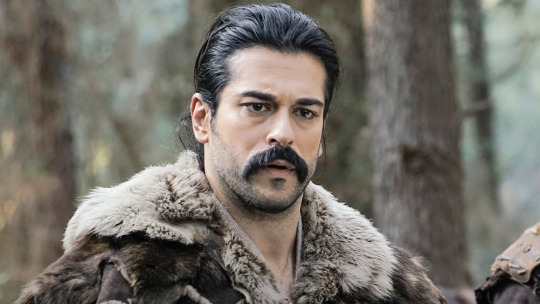
His early life
Legends say he was born around 1260 as the son of Ertugrul Bey and Halime Hatun, and was from the Kayi tribe. It seems he had at least two brothers, Gündüz and Savci, who were both older than him. But there are no evidences for these legends. Yes based on the coins he was the son of Ertugrul so it can be true.
He became the bey of his tribe after the death of his father. Some chroniclers hint that after Ertugrul’s death Osman’s uncle, Dündar became the bey, but Osman didn’t want to accept, so he rebelled. Otheres says Osman ebcame the leader and it was Dündar who didn't accept him. Anyhow most chroniclers agree that Dündar and Osman had a fight and in the end Osman killed Dündar with an arrow. The modern sources stay silent about this, because they find it not too glorious to kill your own uncle for the throne. It's hypocrite in my opinion, since fratricide and civil wars were main part of the Ottoman History. So in my opinion there was nothing wrong with this act (if Osman really did that) in such circumstances. Anyhow he became the leader of his tribe at a relatively young age.
Osman's dream
Osman at first was loyal to the Seljuks, but then he began to act independently around 1299. The reason of this act is not known. But the legends say that the whole idea of the Empire – and so his kind of rebel againsts the Seljuks – began quite literally with a dream:
"One night, the first sultan, Osman, was sleeping in the house of a holy man called Edebali when: „He saw that a moon arose from the holy man’s breast and came to sink in his own breast. A tree then sprouted from his navel and its shade compassed the world. Beneath this shade there were mountains, and streams flowed forth from the foot of each mountain. Some people drank from these running waters, others watered gardens, while yet others caused fountains to flow. When Osman awoke he told the story to the holy man, who said “Osman, my son, congratulations, for God has given the imperial office to you and your descendants and my daughter Malhun shall be your wife”."
So after this dream Osman decided that he will creat his own Empire and will not be a servant of another state. Most probably this is just a legend, because these kind of „dreams” have a history with the Central-Asian origin nomad people. For example in the early Hungarian history there is also a dream like this, called „Emese’s dream”. This one is basically the same and story. Emese was the wife of Chief Ügyek, and she was impregnated by a turul bird. The turul appeared to her in a dream and told her that from her womb a great river would begin, and flow out over strange lands. According to dream interpreters, this meant that she would give birth to a son who would lead his people out of their homeland, and that her descendants would be glorious kings. Emese's son was named Álmos, whose name derives from the Hungarian word "álom", meaning dream, thus "Álmos" can be interpreted as "the Dreamt One". And it happened like that, because Álmos became the founder of House Árpád. Interesting fact is that the name Emese had a türk origin, originates from the Old Turkic eme, ana or ene, which mean mother.
So we clearly can see, that these kind of drem-stories can be found in any Central-Asian origin nation's legends and they aremostly have the same meaning.
Osman's life after his dream
Most probably it didn't happened like, Osman had this dream – or not – and he started to build an Empire... Most probably he never even dreamt of such a huge Empire, what later happened to the Ottomans. Most probably he just wanted to make his own beylik, with his own cities.
His first indisputable evidence comes from a Byzantine chronicler, who tells the story of a battle at Bapheus, quite near Nicomedia (Izmit), in July 1302, in which Osman and a force of nomad archers defeated a Byzantine force accompanied by Alan auxiliaries. It is possible that badweather upstream and a rare flood of the Sakarya river downstream made it attractive to Osman and other türk beys to seek to recoup damage to their herds in the lowlands. At this time Osman was no more powerful than a number of other minor beys.
Within a very short time, türk raiders had reached the Sea of Marmara. A contemporary Byzantine chronicler describes how news of Osman’s victories spread and attracted Türks from other areas of western Anatolia to join his following, and how his force was strong enough to defeat a Byzantine army near Nikomedia (Izmit). From their base in the Sakarya valley, where Osman had occupied the old Byzantine fortified places, his men plundered the countryside to the west, forcing the inhabitants into the walled towns. These remained secure, since Osman obviously lacked the military skills to undertake formal sieges: his assault on Nikaia failed. He did take several other fortresses and fortified towns in the Sakarya valley, using them to store his plunder. In a similar manner he destroyed the countryside around Bursa, but also failed to take that city.
His personal life and family
Osman had at least two wives. One was Edebali's daughter for sure, as his dream also suggest. She was named Rabia Bala, or simply Bala but sometimes called Malhun as well. She was the mother of Alaeddin Bey and maybe had other children also. It seems she may had problems with the nomadic lifestyle or her relationship with Osman went wrong, because she spent the last years of her life with her father. She died in Bilecik in 1324 and was buried next to her father’s tomb.
Osman's other wife was Mal Hatun, who possibly was the daughter of the ruler of the Umuri or Amouri principality. According to a Byzantine historian “a son of Umur fought with Osman in one of his first raids against local Byzantine lords”, which may explain the marriage between Osman and Mal Hatun as a political alliance. Mal Hatun was the mother of Osman’s successor Orhan, and she actually outlived her husband as she was buried in the family tomb around Osman’s grave in Bursa. It is not known when she died.
In the first sentence I said at least two wifes... Well yes "a historical tradition regarding the acquisition of one of Osman’s wives calls to mind the Turkish nomadic practice of acquiring women through raids on neighboring tribes. As the story goes, one day on his way to Eskisehir. Osman caught sight of a woman in the village of ltburnu, fell in love with her, and, without telling his father, sent someone to ask for her in marriage. She refused on the grounds that she was not worthy of him, although this may have been an excuse, since there were rumors that Osman intended only a brief dalliance with her. Osman was spurred to kidnap the woman when an erstwhile ally of his, listening to his description of her manifold virtues, decided to take her for himself. Although the sources confuse this woman with Mal Khatun and Edebali’s daughter, she was clearly a person of lesser status. The details of the story indicate that the kidnapping occurred when Osman was quite young and before he had gained more than a local reputation. Women of standing themselves, selves, Edebali’s daughter and Mal Khatun probably married a more mature and powerful Osman."
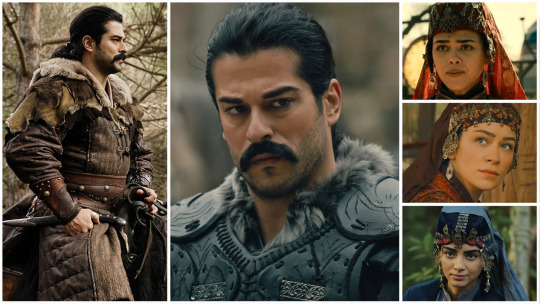
Osman had at least eight sons and one daughter.
Osman's eldest son - whose name is unfortunatelly unknown - was given to the Selcuk Sultan Gıyasuddin III Keyhusrev to be raised in his household when Ertugrul stipulated a peace treaty with him. He had descendants who were alive at the time in which Bayezid I conquered Malatya. The fact that this son of Osman was sent to the Seljuk Sultan during Ertugrul’s life, suggest that he maybe was born to the women, who Osman captured.
His second son most probably was Orhan, who was born around 1281 and became the second ruler of the Ottoman dynasty. During Orhan's reign the little principality began to acquire a more settled aspect. Osman’s territory had contained no large towns. But in 1326, however, the city of Bursa succumbed to starvation and became, from this date, the first capital of the Ottomans. In the next year, following an earthquake which damaged its fortifications, Orhan’s men occupied the Byzantine town of Lopadion (Ulubat), towards the Dardanelles. Moreover Orhan was the first one who established an Ottoman bridgehead in Europe. He achieved this by exploiting a civil war in Byzantium between the rival Emperors John [VI] Kantakuzenos and John [V] Palajologos. Kantakuzenos sought allies among the Turkish rulers of western Anatolia and, in 1346 formed a pact with Orhan by marrying him to his daughter Theodora. The strategy was successful and, in 1347, Kantakuzenos entered Constantinople and proclaimed himself Emperor, with the other John as his co-regent. So beside his great victories Orhan was the first to use marriage as a tool to get himself supporters. His successors used to do this until Mehmed II, who changed the tradition and stopped the sultans from marrying noble women.
His third son was Alaeddin Ali Bey, who was born around 1290 and later he was made governor of Bilecik. He had a son Kiliç Bey, and their last descendant died in 1530. Aleaddin also built a mosque complex in Bursa. He didn't lived a long life, sources don't agree, but most probably he died around 1330.
Osman's other children are less knowns. We don't know anything for example about Savci Bey, just that his son married one of the daughters of Orhan
I. Melik Bey is also not known, we only know that he had a daughter.
Çoban Bey was surely Osman's son, because he built a mosque in Bursa, and by his complex it is known who he was.
Osman's other son was Pazarli Bey, who was the commander of his brother Orhan I for years, so maybe he was the closest to Orhan? Pazarli Bey also had a daughter, and two sons.
Osman also had another son, Hamid Bey, but we have zero information about him.
Osman had most probably more than one daughter, but we only have evidence for the existence of one. Fatma was named in the foundation deed of later Orhan I, so we know that se existed, but nothing else.
It seems like we know a lot about Osman, isnt it? But actually, even his name is the subject of some controversy!
A Greek historian gave us the description of the Sakarya flood and is the one contemporary writer to mention Osman ’s name, did not call him Osman at all but rather Ataman. The surprising notion that Osman had another name finds support in two later sources. Ataman is a Turkish name or maybe Mongol, while Osman is impeccably Muslim. This has led to some suspicion that Osman, or Ataman, the Ottoman, might have been born a pagan, that he may have taken his new name Osman later when he became a Muslim. But if this were true, if Osman were indeed a convert to Islam who changed his name, why would his sons have kept their genuinely Turkish names, who were Muslims beyond any doubt? From what the greek historian wrote, about the only thing we can surmise of the Turk he called Ataman is that he was a warrior.
Osman's death and legacy
The date of Osman's death too is uncertain. He probably died by 1324, the date of a trust deed registered by his son Orhan. The Moroccan world traveler Ibn Battuta, who visited the area in 1331 - 32, wrote that Osman was buried in the mosque of Bursa, probably the former Church of Saint Elias. This church is no longer standing, due to an earthquake two hundred years ago. Osman's remains now lie next to those of Orhan, father and son in suitable twin mausoleums erected in 1863.
All in all it was Osman who was the founder of the Ottoman Empire, and who was to give his name to the Ottoman – or Osmanlı – dynasty.
Used sorces: Colin Imber - The Ottoman Empire, 1300-1650; Peirce - The imperial harem; Faroqhi - The Ottoman Empire and the World; Fleet - The Cambridge History of Turkey, 1071-1453; Howard - A History of the Ottoman Empire; Öztuna - Devletler ve Hanedanlar Cilt 2; Uluçay - Padişahların Kadınları ve Kızları
* * *
Azt mindenki tudja, hogy Oszmán volt az Oszmán-ház megalapítója, és úgy emlékszünk rá, mint az első oszmán szultánra. Azonban senki sem tudja mikor és hol született, évszázadokig létezésére sem volt bizonyíték. Azóta előkerült például két aranyérme, melyeket ő veretett (és amelyekről már szó esett a korábbi, Ertugrulos posztban); ismert néhány leírás is róla, azonban nem tudunk még mindig túl sokat. Tehát akkor ki is volt Oszmán?

Korai évei
A legendák szerint Ertugrul Bég és Halime Hatun fiaként született 1260 körül a Kayi törzsben. Azonban nincs erre bizonyítékunk. Igen, itt vannak az érmék, melyek arra utalnak, hogy Oszmán apja valóban Ertugrul volt, de semmi mást nem tudunk biztosan.
Apja halála után vált a törzs fejévé. Néhány történetíró szerint Ertugrul halála után annak öccse, Dündar lett a bég, amelyet Oszmán nem fogadott el és fellázadt ellene. Más források szerint épp fordítva történt és Oszmán lett a bég, Dündar pedig fellázadt ellene. Akárhogyan is, abban egyetértenek a történetírók, hogy Oszmán és Dündar harcoltak egymással, melynek végén Oszmán egy nyíllal megölte Dündart. A modern források csendben maradnak ezzel kapcsolatban, hiszen méltatlannak érzik, hogy a dinasztia alapító ilyen véres családi küzdelem árán lett bég. Ez véleményem szerint nagy álszentség, hiszen tudjuk, hogy a testvérgyilkosság és a polgárháborúk milyen komoly részét tették ki a birodalom több évszázados történelmének. Véleményem szerint tehát a körülmények ismeretében semmi rossz nem volt abban sem, ha Oszmán valóban így ragadta magához a hatalmat. Mindenesetre azt tudjuk, hogy Oszmán kifejezetten fiatalon vált a törzsét vezető béggé.
Oszmán álma
Oszmán törzsfőként eleinte hűséges volt a Szeldzsuk Államhoz, azonban idővel, 1299 körültől függetlenül kezdett el cselekedni. Ennek oka ismeretlen. A legendák szerint az egész birodalom alapítási ötlet - és ezzel együtt a Szeldzsuk Birodalom elleni lázadás ötlete - egy álommal kezdődött.
"Egyik este az első szultán, oszmán egy szent ember, Edebali házában aludt, amikor:"Azt látta, hogy a hold a szent ember mellkasából a magasba emelkedik, átlebeg az ő mellkasára, majd belesüllyed. Ezekután testéből egy fa nőtt ki és behálózta a világot. Lombja alatt hegyek voltak, folyók folytak azok lábainál. Néhány ember a folyókból ivott, mások kertjüket locsolták, míg mások szökőkutat alkottak a folyók vizéből." Amikor Oszmán felébredt, elmondta az álmát ennek a szent embernek, aki erre eképpen felelt: " Oszmán, fiam, gratulálok, Isten téged választott, rád és utódaidra bízta a dicső feladatot. Leányom Malhun legyen a feleséged."
Ezután az álom után döntötte el Oszmán, hogy birodalmat alapít, nem pedig más birodalmakat fog szolgálni. Nagy valószínűséggel ez csak egy legenda, hiszen a hasonló álmok kifejezetten gyakranjelennek meg a Belső-Ázsiai eredetű nomád népek hiedelem világában. Például a korai magyar történelemből is ismert egy ilyen álom, Emese álma. Ez alapvetően szinte ugyanaz, mint Oszmáné. Emese Ügyek felesége volt és egy turul madártól esett teherbe, aki álmában meglátogatta és azt mondta neki, hogy méhéből hatalmas folyó fog áradni, mely új vidékekre is eljut. Az álomfejtől szerint ez arra utal, hogy ő fogja világrahozni azt, aki elvezeti új hazájába népüket és, hogy utódaik dicső uralkodókká fognak válni. Emese később világrahozta fiát, aki az Álmos nevet kapta, utalva Emese álmára. Külön érdekessé teszi Oszmán szempontjából a történetet az, hogy maga az Emese név is türk eredetű, amely az ősi török eme/ana/ene szóból ered, mely anyát jelent.
Egyértelmű tehát, hogy ezek az álom-történetek megtalálhatóak a legtöbb Belső-Ázsiai nép legendái között, és szinte minden esetben alapvetően hasonlóak, hasonló jelentéssel bírnak.
Oszmán élete az álma után
Nyilvánvalóan az álom után nem az történt, hogy Oszmán hirtelen birodalmat akart építeni (már ha álmodott egyáltalán)... Valószínűleg még csak álmodni sem mert arról, ami valójában történt leszármazottjaival, hogy ilyen hatalmas birodalmat hoztak létre.Valószínűleg ő csak egy kis bégséget akart magának, néhány városkával.
Első kétségtelen bizonyíték Oszmán uralkodásáról egy bizánci történetírótól származik, aki leírta Bapheus-i csatát, mely Nicomedia (Izmit) közelében történt 1302 júliusában. Eszerint Oszmán és nomádokból álló íjászai legyőztek egy csapat bizánci katonát. Lehetséges, hogy az időjárási körülmények nagyban felbátorították Oszmánt. Ekkoriban ugyanis hatalmas áradás zajlott a Sakarya folyó mentén, amely miatt Oszmán és csapatai szükségét érezték a terjeszkedésnek, hogy legyen hol legeltetni és hová menekíteni állataikat. Ekkoriban azonban Oszmán nem volt több, mint egyike a sok kicsi törzs vezetőinek.
Rövid időn belül azonban győzelmének híre elért a többi türk táborba is, elkezdték őt csodálni és egyre több türk tábor csatlakozott hozzá Nyugat-Anatóliából is. Így a türkök már a Marmara tengerhe is elértek nemsokára. A Sakarya völgyben táboroztak, és innen indultak újra meg újra lerohanni a környező területeket. Valóban sikerült ezzel területet, legelőket szerezniük, azonban egyetlen fallal körülvett várost vagy erődítményt sem sikerült bevenniük. Oszmán megpróbálta Nikaia-t is bevenni, ám nem járt sikerrel, mint ahogy a Sakarya-völgy más városainak esetében sem. Hasonlóan járt Bursával: bár a környéket sikerült meghódítania, a várost magát nem tudta bevenni.
Magánélete
Oszmánnak legalább két felesége volt. Egyikük Edebali Seyk leánya volt, akire az álom is utalt. Rabia Balának, Balának vagy Malhunnak hívták. A források nem értenek egyet nevében. Az bizonyos, hogy ő volt Aleaddin Bég anyja, de lehetséges, hogy más gyermekei is születtek. Úgy tűnik, hogy idővel kapcsolta megromlott Oszmánnal, vagy a nomád élet nem volt nekivaló, de utolsó éveiben visszaköltözött apjához. Bilecikben halt meg 1324-ben és apja mellé temették.
Oszmán másik felesége Mal Hatun volt, aki feltehetőleg az Umuri vagy Amouri területek urának leánya volt. Bizánci történészek szerint "Umur fia Oszmán mellett harcolt, amikor azelőször győzte le a bizánciakat", ami megmagyarázná a valószínűleg politikaiházasságot is Mal és Oszmán között. Mal volt Oszmán örökösének, Orhannak az anyja. Bizonyosan túlélte Oszmánt, ám pontos dátum nem ismert haláláról. Végül családi türbébe temették Bursa közelében.
Az első mondatban azt írtam, LEGALÁBB két feleség... Igen, a történészek szerint Oszmán egyik feleségét a nomádokra jellemző asszony-rablással szerezte. A történet szerint Oszmán egyik nap Eskisehirbe tartott, amikor meglátott egy gyönyörű leányt Itburnu falujánál és azonnal beleszeretett. Apja (Ertugrul) engedélye nélkül odaküldött valakit, hogy kérje ki neki a lányt. A lány elutasította azzal az ürüggyel, hogy nem méltó a férfihoz, ám ez valószínűleg csak kifogás volt. Oszmán ezekután elrabolta a lányt. Sok forrás összekveri ezt a lányt Edebali lányával vagy Mal Hatunnal, azonban egyértelmű, hogy egyikük sem lehetett, hiszen mindketten jóval magasabb rangú nők voltak. A történet részletei arra is utalnak, hogy ez még Ertugrul élete során zajlott, tehát Oszmán igen fiatal volt és nem volt semmiféle befolyása. Edebali leánya és Mal Hatun egy már érettebb Oszmánhoz mentek feleségül.

Oszmánnak legalább nyolc fia és egy leánya volt.
Legidősebb fiát - akinek neve sajnos elveszett az idők során - a Szeldzsuk Szultán, III Giyasuddin Keyhusrev nevelte. A fiúval pecsételődött meg Ertugrul és a szultán béke megállapodása. A fiú Szeldzsukoknak való átadásának idejéből következtethetünk arra, hogy talán az elrabolt parasztlány volt az anyja? Mindenesetre a fiú utódjai egészen I. Bayezid uralkodásának idejéig Malatya környékén éltek.
Második fia valószínűleg Orhan volt, aki 1281 körül született és később ő lett a második oszmán szultán. Orhan uralkodása alatt a kis bégség, melyet Oszmán hozott létre sokkal kifinomultabbá vált. Oszmán ugyanis nem tudott elfoglalni városokat, Orhan azonban 1326-ban sikeresen kiéheztette és elfoglalta Bursa városát. A következő évben pedig egy földrengés után Orhan seregével sikeresen tudta elfoglalni a megrongálódott Lopadion (Ulubat) városát a bizánciaktól. Mindezek mellett Orhan lett az első, aki az európai politikai színtérbe is bele tudott avatkozni. Kihasználta a háborút, amely két rivális között, VI. János Kantakuzenos és V. János Palajologos között zajlott. Kantakuzenos egyezséget kötött Orhannal, ennek megpecsételésére pedig hozzáadta feleségül saját leányát, Teodorát 1346-ban. A stratégia sikeres volt, 1347-ben Kantakuzenos belépett Isztambulba, és császárrá nevezte ki magát. Tehát győzelmei mellett Orhan volt az, aki először kötött jelentős politikai házasságot is. Utódiai egészen II. Mehmed uralkodásáig rendszeresen használták a szövetségkötésnek ezen módját.
Oszmán harmadik fia Aleaddin Ali Bég volt, aki 1290 körül született és életében Bilecik helytartója volt. Született egy fia Kiliç, akinek leszármazottjai még 1530-ban is jelen voltak. Aleaddin emellett mecsetkomplexumot és építtetett Bursában. Nem élt sokáig, a források szerint 1330 körül hunyt el.
Oszmán további fiai kevéssé ismertek. Nem tudunk például semmit Savciról azonkívül, hogy született egy fia, aki később feleségül vette unokatestvérét, I. Orhán leányát.
Oszmán, Pazarli nevű fia Orhan mellett tevékenykedett annak parancsnokaként, tehát lehetséges, hogy a két férfi közel állt egymáshoz. Pazarli bég gyermekei is ismertek, legalább egy lánya és két fia született.
Oszmánnak volt egy Hamid nevű fia is, akiről sajnos nincs semmi információnk.
Oszmánnak mindezek mellett valószínűleg több lánya is volt, azonban csak egyikük létezésére van konkrét bizonyíték. Fatma ugyanis meg volt nevezve I. Orhan egyik alapítványának papírjain, mint Orhan testvére, így ő bizonyosan létezett és Oszmán lánya volt, ám semmi mást nem tudunk róla.
Úgy tűnik sokat tudunk Oszmánról, igaz? Azonban valójában még a neve is ellentmondásos!
Egy görög történész, aki a Sakarya folyó menti ütközetet taglalja Oszmánt nem Oszmán néven említi, hanem Atamanként. A meglepő tény, hogy Oszmánnak lehet egy másik neve is, két másik forrásban is bizonyításra lel. Ataman egy türk vagy mongol eredetű név, amely arra utal, hogy Oszmán eredetileg nem volt talán muszlim sem. Ebből történészek olyan következtetéseket vonnak le, hogy Oszmán talán idővel tért át az iszlámra és vette fel az Oszmán nevet. Azonban ezt cáfolja, hogy fiai kétségkívül muszlimok voltak, mégsem változtatták meg eredeti türk nevüket. Abból, amit a görög történész jegyez az egyetlen plusz információ Atamanról, hogy nagyszerű harcos.
Oszmán halála és hagyatéka
Halálának pontos ideje nem ismert. Valószínűleg 1324-ben hunyt el, mert fiának alapítványi papírjai ezt a dátumot említik. Emellett egy marokkói világutazó, Ibn Battuta 1331-32 körül meglátogatta Bursát és lejegyezte, hogy Oszmán Bursa mecsetjében nyugszik, mely korábban a Szent Elias templom volt. Mára a templom/mecset már nem áll, ugyanis 200 éve egy földrengés elpusztította. Oszmán földimaradványai most Orhan mellett nyugszanak egy ikermauzóleumban, melyet 1863-ban építtettek számukra.
Összességében tehát Oszmán volt az Oszmán Birodalom alapítója és az Oszmán - Osmanlı - dinasztia neve is tőle eredeztethető.
Felhasznált források: Colin Imber - The Ottoman Empire, 1300-1650; Peirce - The imperial harem; Faroqhi - The Ottoman Empire and the World; Fleet - The Cambridge History of Turkey, 1071-1453; Howard - A History of the Ottoman Empire; Öztuna - Devletler ve Hanedanlar Cilt 2; Uluçay - Padişahların Kadınları ve Kızları
#osman i#bala hatun#malhun#malhun hatun#rabia bala#orhan i#bursa#ottoman empire#osmanlı#ataman#osman#orhan#şeyh edebali#edebali
29 notes
·
View notes
Text
Practical Steps to Liberate Falasṭeen | Sh. Usama RAA
Rabi’ al-Awwal 1430
March 2009
All praise is due to Allah. We praise Him and seek His aid and forgiveness, and we seek refuge in Allah from the evil in ourselves and from our bad deeds. He whom Allah guides cannot be led astray, and he who is led astray cannot be guided. I bear witness that there is no God other than Allah alone, without partners, and I bear witness that Muhammad is His slave and Messenger.
As for what comes after:
My Muslim Ummah: this talk of mine is for you, and concerns what must be done to help our family in the Blessed Land, because we have been late in helping them and that has hurt our causes and made them even more difficult and complicated.
For how long must our family in Palestine live in fear, while we enjoy security – albeit a false, temporary security? For how long must the people of Gaza live under siege, while we live in comfort and luxury – at least for the time being? And for how long will we sit while their hearts burn for their children, who were burned by the white phosphorous bombs with the collusion of Arab rulers, which caused even brave and mighty men to cry, due to the enormity of the event. Their crying here is more eloquent and expressive than thousands of sermons about the magnitude of the calamity.
And the stabbing of close relations is severer
For a man than the blow of the sword
It is no surprise that some of our mothers and sisters in Gaza died or almost died, not because of shrapnel or bullets, nor because of the blockade, for the blockade is nothing as long as the child is still there; but the blockade is the day he is lost. For a mother, the kings and all that they own are smaller in her eyes than her little one, but the American aircraft in the hands of the Jews bomb and bomb again, and snatch the little ones of the neighborhood, among them her little ones; and this is what makes our mothers and sisters tremble in fear, and almost die with every breath. Hearing isn’t like seeing, and only the one who has had his child snatched from him knows what it’s like to be bereaved, and only the one who has endured the bombing knows what bombing is like; and there is no Mu’tasim to take revenge from the tyrants.
It must be pointed out that it is part of psychological defeat and betrayal of the religion, the Ummah and the blood of the martyrs to praise the one who colluded in killing them and describe him as “Gaza’s hope,” while its residents are noble and defiant people who reject that.
Gaza’s youth died so it could live
And praise of Kufr makes free ones burn with anger
Peoples were liberated with their spears
So how can they be enslaved with their spears?
And the tragedies that have befallen you
Have left deep wounds in my heart
Nothing protects creeds like victims
Nor brings rights near nor achieves them
Those in power have sold out the causes
And are slaves of the unbelievers
Ask he who besieged your children
Is there any difference between his heart and a stone?
The hearts of our rulers are like those of the enemies
Whether in Najd or in Egypt, they never soften
Pharoahs who have returned after a time
To humiliate the sons of Arabness and enslave them
You have cooperated with the enemies against us
So cutting your necks is a duty in the religion
My Muslim Ummah: more than 90 years have passed since the occupation of Palestine, and during that time it has tasted the two bitterest things at the hands of the Christians and Jews. And despite the past efforts which have been made, including the repeated demonstrations and festivals, the occupation continues. So I ask of you – my Ummah – a few minutes for me to put in front of you practical steps for its liberation, to discharge the obligation and motivate the Ummah. This requires speaking the truth even if it be bitter, and it is also a must that it be applied to the weak as well as the nobleman, even if that be heavy; to do otherwise is the path to ruin, so beware! The Messenger of Allah (peace and blessings of Allah be upon him) said, “Those before you were ruined because when the nobleman among them stole, they would let him go, but when the weak one among them stole, they would execute on him the Hadd (punishment).” Agreed upon.
My Muslim Ummah: from the bitter truth which must be declared is that despite our eagerness to rescue our family in Gaza and lift the blockade from them, there are those who are even more concerned for them than we are – and I mean by that our brothers in the rest of Palestine, including the West Bank – yet were unable to come to the aid of their family and relatives, for an obvious reason: their country is occupied, and the soldiers of the Zionists and soldiers of the Authority led by Abbas prevent them from helping their brothers there.
This reason is the same reason which prevents us from helping our family in Gaza. The bitter truth is that our countries are occupied from within, and the Arab Zionists – the region’s rulers and our enemy’s proxies – and their soldiers are the ones who prevent us from helping the weak and oppressed there.
So unless we realize that our countries are occupied in the interest of the rulers and those who appointed them, and that they are helped in that by both military as well as civilian armies, the latter being the most important and dangerous and led by the evil scholars and those of the educated class and media men whom they have hired; [armies which] lead the Ummah astray and spread the spirit of defeat in it and train it in every way possible to march behind the rulers, so they can continue to usurp government and strip the Ummah of its will through temptation and intimidation, in order that our Ummah become incapable of taking the initiative and moving outside the influence of the rulers and their men…
Unless we realize this, and work to expose the truth about them and warn against them and remove them and liberate ourselves from their authority, we will never be able to liberate Palestine, as someone who doesn’t have something can’t give it, and we will continue to revolve in the closed circle in which we have been marching ever since the occupation of the Blessed Land.
My Muslim Ummah: the one who examines conditions in Palestine sees that the necessary requirements for the Jihad to achieve its goals still need to be completed, despite the difficulty of that in occupied Palestine, especially with the embargo imposed on our family there, not to mention the “calming” agreements which are signed every now and then; and the situation throughout the past decades confirms that. This is why a sufficient force of Mujahideen must be formed to lift the blockade from Palestine so they can help our family there, because all the Arab cordon states have closed their borders with Palestine and are guarding them from the movement of the Mujahideen; and moreover, in regard to the part which had been excepted from the northern front of Palestine on the border with Lebanon, Hassan Nasrallah and his party agreed to the resolution closing it: Resolution 1701, which calls for the entrance of thousands of Crusader forces to protect the Jews. And thus there is no difference in this issue between Hassan and Hosni and the rest of the Arab idol-kings who have besieged our family there.
On the basis of the above, we must search for states outside the cordon states from which the Mujahideen can move out to open the borders by force, so that we can reach our family in the environs of blessed al-Aqsa; and the rare and valuable opportunity for those honest in their desire to deliver al-Aqsa is in backing the Mujahideen in Iraq with everything they need in order to liberate Mesopotamia. And with that they will have performed two duties: the defeat of the Zionists’ biggest ally, before they move on to Jordan, as it is the best and widest of the fronts, and half its residents are from the people of Palestine who were expelled from it in the past; and from Jordan, the second move will be to the West Bank and neighboring areas, and the borders will be opened by force to make up for the deficiency in necessary requirements, so that all of Palestine from the river to the sea can be liberated, Allah permitting. This, then, is the Shari’ah-compliant way and the practical and realistic way as well, far away from expending efforts in statements and actions the majority of which neither repel the might of arms nor inflict injuries on the enemy.
So enough sitting and wasting of time and enough shirking of responsibility: the holocaust of Gaza in the midst of this long siege is an important and historic event and an articulate tragedy which affirms the need for detachment of the Muslims from the hypocrites. It is not right that our condition after Gaza be like our condition prior to it: rather, the order of the day is serious action and preparation for Jihad, to bring about truth and cancel falsehood. And we must declare ourselves innocent before Allah the Most High of anyone who colludes with the enemies against the people of Gaza. Disowning these colluders isn’t an optional act: no, it is one of the two pillars of Tawheed [Islamic monotheism]. Helping the unbelievers against the Muslims is major Kufr (unbelief) which expels one from Islam. Read the statement of Allah, the Most High: “O you who believe! Take not the Jews and the Christians for your friends and protectors: they are but friends and protectors to each other. And he amongst you that turns to them (for friendship) is of them. Verily Allah guides not a people unjust” (5:51), and the statement of Allah, “Whoever disbelieves in the Taghut [the idol] and believes in Allah has grasped the strongest handhold which knows no breaking. And Allah is All-Hearing, All-Knowing.” (2:256)
So this event is a test for all of us: the one who follows the guidance succeeds in it, and the one who goes astray fails in it. We are in need of honest leaderships which do what is necessary to collect a sufficient amount of the Muslims’ energies in this field. The Ummah is suffering from a huge failure of leadership. Although many of its sons think that they have leaderships leading them to the shore of safety – if not at the level of the first tier of kings and presidents, then at least at the level of the second and third tier – yet the fact is, this is a major delusion and a primary hiding place of the defect, and Palestine remaining for nine decades under occupation, in addition to other [occupations], not to mention the spread of poverty, ignorance and disease despite the amount of resources, is a clear indicator of that. A ship, however large and pretty it might be, cannot reach the shore of safety if it doesn’t have a trustworthy leadership.
We know the truth about the leaderships of the first tier and their subjugation to our enemies, but the worse and bitterer thing is that they have been able to train many of the leaderships which come after them. Unless the leaders of the second tier and those close to them change what is in them in terms of inclining toward falsehood and sweet-talking it, or are replaced, the Ummah will never make progress on the road to liberation of al-Aqsa, because they have become obstacles and barriers on the road taking the Ummah out of this wilderness. They are like a railroad, with the rulers’ train at the front and the train of the leaderships of the second tier and those close to them just behind them, and both of the trains have been stopped for years [blocking] the road to the liberation of Palestine. So the only way to get to al-Aqsa is to remove both trains from the road and leave them behind; but it will be difficult to do that unless many of the Muslims wake up and abandon blameworthy fanaticism towards homelands and individuals, whether they be rulers, scholars or leaderships of Islamic groups, and abandon their opposition to giving them advice and executing the truth on them. If they don’t do that, then their actions say that they are taking the path that ruined nations before us, and this is why the Ummah has been in a labyrinth of darkness for decades, and it appears that they haven’t understood the statement of the Messenger of Allah, peace and blessings of Allah be upon him, “By Allah, were Fatima, daughter of Muhammad, to steal, I would cut off her hand” (Agreed upon).
The spirit of advice must run in us in order for the march to be rectified, and [we must realize] that the truth is greater than everyone, and the health and safety of the truth is more important than the health and safety of homelands, individuals, parties and groups. Everyone’s words are accepted and rejected except for the words of the Messenger (peace and blessings of Allah be upon him), who said, “The religion is advice” (al-Tirmizi, al-Nasa’i, Ahmad). Yes, if we neglect it, we lose the religion, and our loss is due to that. So this is our reality, and Umar (with whom Allah was pleased) said, “We are a people whom Allah has honored with Islam, and whenever we seek honor in something else, Allah will humiliate us.” So take heed, O you who can see.
Returning to the topic of leadership, the path to the liberation of al-Aqsa needs real, honest, independent, strong, trustworthy leaderships at the level of these massive events and well-versed in the Fiqh of current affairs and the Fiqh of the Shari’ah, who will set up an advice committee with branches all over the Islamic world which will strive to spread information and spread legal and political awareness among the sons of the Ummah, and it is then that minds will be liberated from ignorance and gullibility and spirits will be liberated from subjugation and submission to the rulers subjugated to our enemies.
Knowing the dangerousness of this reality in which we live and the role the rulers and their aides play in it is the first step towards forming a self-motivating force which will move to change this dark reality; and here the Fiqh of the Shari’ah must be applied to this reality, and it is then that our movements will be regulated according to the straight path, to rectify the abominable conditions and lift the aggression from our Ummah.
The members of this committee must also be protected from the interference of the rulers in their council, and must disown them all and beware of their infiltration of their committee by way of the evil scholars, as is the case with so many of the committees set up in our countries; and one of their duties is to disseminate the legal rules relating to these topics, like emphasizing that Jihad is obligatory until the sufficiency is reached, and emphasizing the fatwa published by some of the people of knowledge during the events of Gaza, which stated that he who helps the enemies against the Muslims is committing a nullifier of Islam and listed the rules that stem from that.
I also place in front of the scholars and preachers some proposals in this field, asking them to make every effort to develop and perfect them. Among the most important of these proposals:
First, the drawing up of lists which name the honest scholars, preachers, thinkers and writers who advise their Ummah, along with their most prominent works, and working to spread them among the Ummah’s masses. And the presence of some unintentional errors mustn’t be an obstacle: rather, these errors should be noted and advice given; otherwise, there will be no scholar left for us, not to mention those less than scholars. An effort also must be made to give prominence to honest leaderships which adhere to the methodology of Islam.
Second, the correcting of legal concepts in the thought and life of the Ummah. Some beneficial books towards that include:
- “Achievement of the Glorious” by Shaykh Abd al-Rahman bin Hasan Al Shaykh, which is a very important book which talks about Tawheed and warns against Shirk [polytheism], including the Shirk of graves and the Shirk of palaces.
- Two books by Shaykh Muhammad Qutb, “Concepts Which Must Be Corrected” and “Are We Muslims?”
- And the book “The Clarification of the Unbelief of He Who Aids the Americans” by the Mujahid Shaykh Nasir bin Hamd al-Fahd (may Allah free him from the prisons of al-Riyadh).
There is a fifth book of benefit, which evaluates all the regimes in the Islamic world, even though its title is “The Saudi Regime on the Scales of Islam”; and many beneficial books can easily be read on the Internet, like on the al-Tawheed wal-Jihad website.
Third, the notifying of the Ummah that there is a war under way to alter and put to death the legal names and terminology in order to commit what Allah has forbidden. That must be refuted and the legal names and words spread. Some examples of that:
- The violation of the prohibition of usury, by calling it “interest” and calling usurious banks “merchant banks.”
- When they wanted to violate the prohibition of wine, they called it “spirits” and other such names.
- When they wanted to combat the summit of the hump of Islam, Jihad in Allah’s path, they labeled it “violence” and “terrorism.”
- When they wanted to commit the nullifiers of Islam and ally themselves with the enemies of Allah, they put to death the punishment for apostasy and described anyone calling for the application of this punishment a “Takfeeri.”
And there is talk of calling the unbeliever, apostate, Zindeeq, and hypocrite by the name “the other,” and they shun the use of legal terms. Similar are sophistries like “dialogue of religions,” “freedom of opinion,” “freedom of speech,” “peaceful coexistence,” “friendly states,” and the contracts for the provision of facilities to support the Crusader warships at the same time as the Jews and Christians carry out the murder of our brothers in Palestine, Iraq, Afghanistan, Waziristan, Somalia, Kashmir, the Philippines and Chechnya. So sophistry in names and terms is a wide-ranging field which must be watched and the truth about it and those who promote it revealed.
Fourth, the drawing up of lists which include our enemies from the hypocrites and their media, especially information media like newspapers, books, magazines, radio stations and satellite channels, of which the most dangerous are the latter two, like the British Broadcasting Corporation and its sisters and the al-Hurrah and al-Arabiyyah channels. Also, the drawing up of lists of those whose efforts serve the interests of our enemies without them realizing it, like the rumormongers, deserters and morale-destroyers among the Muslims, in accordance with legal regulations, and disseminating the lists to the Ummah with all available means so that it can warn them, and accompanying those lists with documents and evidence from their statements and actions as proof of that, along with a refutation; and I mention here the statement of Allah, the Most High, “O ye who believe! Be steadfast in the cause of Allah, bearing witness in equity; and let not the hatred and animosity of a people to you make you transgress and abandon justice. Be just, for that is closer to piety. And fear Allah. Surely, Allah is Aware of what you do.” (5:8)
Revealing the truth about the hypocrites is a Quranic methodology, and the scholars have agreed on the obligatory nature of revealing the hypocrites and innovators. Imam Ahmad (may Allah have mercy on him) was asked, “Do you prefer that a man fast, pray and perform ‘Itikaf, or that he speak about the people of innovation?” He replied, “If he prays and performs ‘Itikaf, it’s for himself, but if he speaks about the people of innovation, it’s for the Muslims, so this is better.”
The Ummah is in dire need today – especially after this war against Gaza – of acquainting itself with the hypocrites on all fronts, to beware of them, then perform Jihad against them, as in the statement of the Most High, “When you look at them, their bodies please you; and when they speak, you listen to their words. It is as if they are pieces of timber propped up. They think that every cry is against them. They are the enemies, so beware of them. Allah curse them, how they lie!” (63:4), and the statement of Allah, the Most High, “O Prophet! Strive hard against the disbelievers and the Hypocrites, and be harsh against them. Their abode is Hell, and an evil destination it is.” (9:73)
To summarize, then: there must be honest leaders, legal and political awareness-building, Jihad in Allah’s path, and exposure of the truth about the hypocrites and differentiation and separation from them, keeping in mind that separation is something already being implemented on the side of the rulers. They have security organs whose personnel number in the hundreds of thousands and which keep watch and spy on those who advise their Ummah, and draw up lists of them which are called “blacklists” to combat them in numerous ways: through temptation and cajolement, and layoffs and prison, and travel bans, and pursuit, and smearing of their reputations, and even murder, all in order to come between them and the pulpits of guidance from which they would advise their Ummah and warn it against their conspiracies; meanwhile, they and their ‘Ulama and media are able to freely engage in deceit and misdirection of the Ummah. And in regard to the lists of our enemies, and in view of time constraints, I will suffice by describing their senior leaders in our countries. In these events, people have been distinguished, especially the noblemen and chieftains, whether rulers or ‘Ulama; and it has become clear that some of the Arab rulers have colluded with the Crusader/Zionist coalition against our people: they are the ones whom America calls “rulers of moderate states.” The fact is, all states of the Islamic world from Indonesia to Mauritania without exception fall into one of two categories: crooked states and even more crooked states; and Islam is innocent of all of their rulers.
It is no secret that what helped the first group at the outset of Islam to harden and strengthen so that it could bear the burdens of setting up the Islamic state were a number of things, most important of which – after proper faith and asceticism – was the distinction between the believers and hypocrites. The tremendous events and immense tragedies – particularly the wars and blows – shook the bad from the good and distinguished the honest from the hypocrite, as in the Most High’s statement, “What you suffered on the day the two armies met was with the permission of Allah, in order that He might know the believers and know the hypocrites, who were told, ‘Come, fight in the way of Allah, or [at least] defend’. They said, ‘If we knew of a fight, we would follow you’. They were that day nearer to unbelief than to faith. They say with their mouths what is not in their hearts. And Allah knows quite well what they hide.” (3:166-167)
Among the disasters which befell the Muslims on the day of Uhud is that a third of the army submitted to the head of the hypocrites, Abdullah bin Ubay bin Salool, and obeyed him, and he betrayed them and ordered them not to fight the enemies. As for today, all official armies of the Ummah are under the command of the hypocrites from the rulers of the region, while most of the unofficial armies are under the command of the leaders of the Islamic groups, many of whom believe that these rulers are legitimate rulers whom it is forbidden to rebel against; so how can’t tragedies befall us one after the other?! This became clearly apparent in these groups’ desertion of Gaza and its people, as they awaited permission from the hypocrites before performing Jihad; so what sort of taking advantage of the youth is this?!
Our duty is to distance the hypocrites and deserters from the fields of leadership and guidance, like the Companions did after the Uhud expedition; when Ibn Salool got up to give a speech to the Muslims like he used to do before – he was a chief among his people and he wanted to preserve his status by instructing the first group of Muslims – but the Companions tugged at his clothes from all sides and said, “Sit down, O enemy of Allah: you aren’t fit for that after you did what you did.”
How many are the men who assume control of the pulpits of guidance in their various forms and deceive the Ummah to rally around the hypocrites who rule the region, and make them abandon combat to liberate Palestine. So how fitting it is for us to say to every one of them – face-to-face or over the phone – what was said to their first president Ibn Salool: “Sit down, O enemy of Allah: you aren’t fit for that after you did what you did.” What the Companions (with whom Allah was pleased) did with Ibn Salool was to expose him and remove him from the pulpits of guidance in the Muslim group, lest he do it again in another expedition and leave with a third of the army, for the tragedies to repeat themselves; and this is what we should do, because the hypocrites and deserters have been rerunning the disasters on us for decades. So these are some proposals which I hope are in the interest of the general project to rescue the Ummah and break and remove the shackles which many of its sons have been restrained with, so that they be liberated from them and there emerge from their midst a number sufficient to carry out the most obligatory obligation after faith: repelling the attacking enemy which ruins religion and worldly life. Opening one of the links of the thick chain placed around our necks will help us to take down and throw away the rest of the links, Allah willing.
The opportunity is there today to carry out this duty in a number of the open fields of Jihad, especially in Iraq, Afghanistan, Pakistan, Somalia and the Islamic Maghreb. So I ask Allah to guide us to help the religion and perform Jihad in His Path, so that we liberate the Muslim countries, especially Iraq, and set off from them to Palestine.
In closing, I remind my Ummah of the importance of keeping our hearts close to the strengtheners of faith, and keeping them away from the places of temptation and hypocrisy, and what helps us in that is that our tongues be moist with the remembrance of Allah the Most High, and that we read daily a thirtieth part of the Noble Quran with reflection and contemplation, which clears the hearts and brightens the minds, and shows us the shared attributes of our enemies, the polytheists and hypocrites, throughout the ages; and read the statement of Allah, the Most High: “O mankind! There indeed has come to you an Exhortation from your Lord and a healing for whatever disease there is in the hearts, and guidance and mercy for the believers.” (10:57)
I also remind you of the importance of reading the suggested books and accomplishing the booklets of lists and perusing and disseminating them, because they are beacons in the midst of the darkness of the domestic and foreign attacks on us.
Finally, I exhort myself and my brothers with these verses:
And our determinations ask me
Why the cowardice and weakness
When our worlds have been filled
By Taghuts who have pictures
To weaken our faith
And in them lie the danger
My brother, O superpower
The path of Allah is your goal
Do you fear death
When death is your Paradise?
The column of religion isn’t strengthened
By voting and desertion
Nothing but the sword benefits
I swear, O youth of this age
O Allah, show us truth as truth and guide us to follow it, and show us falsehood as falsehood and guide us to avoid it. O Allah, approve for our Ummah a righteous rule in which those who obey You are honored and those who disobey You are disgraced, and in which good is enjoined and evil forbidden. O Allah, our Lord, give us in this world good and in the next good and save us from the punishment of the Fire. O Allah, give victory to the Mujahideen everywhere and accept their martyrs and heal their wounded and free their captives. You are able to do all things. O Allah, punish the Crusader/Zionist coalition and those who help it. O Allah, we have no power nor strength except with You, so aid us with aid from You and give us victory over the unbelieving people. O Allah, send prayers and blessings upon our Prophet Muhammad and upon his family and all his companions; and our final prayer is that all praise is for Allah, Lord of the worlds.
2 notes
·
View notes